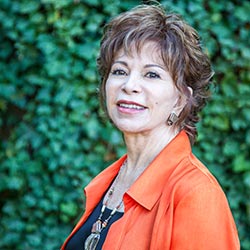Tempus Fugit/Carpe Diem!
This week PEN International came together virtually for its annual Congress with writers from around the world. What was to have been a large celebratory gathering in Oxford and London for PEN’s Centenary, disaggregated into voices and pictures on a screen from every corner of the globe. Some had easier internet access than others, but the majority of PEN’s 155 centers were at least able to zoom in for portions of the celebration and for the election of a new PEN International President, Turkish novelist Burhan Sönmez as well as three new board members and new Vice President William Nygaard.
After serving six years as the first woman President of PEN International, Jennifer Clement stepped down, heralding PEN’s work on freedom of expression and “the unique revolutionary value of literature in the transformation of individual lives and societies.” In taking on the presidency, Sönmez warned against a new epidemic of authoritarianism in the world and also emphasized the importance of literature and imagination and PEN’s work protecting the freedom of writers to imagine and create.
A hundred years go the first president of PEN John Galsworthy said in a toast at PEN’s first dinner: “We writers are in some sort trustees for human nature. If we are narrow and prejudiced, we harm the human race.” At its Centenary Congress PEN reaffirmed the commitment made in a “Statement of Arms,” approved by London PEN in 1926: “The P.E.N. Club stands for hospitality and friendliness among writers of all countries; for the unity, integrity and welfare of letters; and concerns itself with measures which contribute to these ends. It stands apart from politics. We affirm that PEN is a place of hospitality for all writers without exception and a space of kinship among colleagues. We work for the unity of letters through dialogue and translation. We stand apart from politics and political regimes with the mission of defending freedom of expressing, linguistic rights and equality.” In the 5th PEN Congress in 1927, these principles evolved into the first three articles of the Charter of PEN.
PEN’s Centenary Congress featured discussion with longtime voices in PEN, including Margaret Atwood, Orhan Pamuk, Boris Novak, Salman Rushdie, John Ralston Saul, Homero Aridjis, Per Wastberg, Eugene Schoulgin, Ngugi wa Thiong’o and J.M. Coetzee and testimonies from former PEN cases Enoh Meyomesse, Can Dundar, Dareen Tatour and Ma Thida, who was elected as the new chair of PEN International’s Writers in Prison Committee.
Resolutions were passed protesting the situations in Myanmar, Belarus, Nicaragua, and Israel. Two new centers of PEN were welcomed—PEN Malta and PEN Quechua Bolivia.
In the past month we have witnessed some withering scenes, particularly in Afghanistan where just eighteen years ago, PEN was able to open a center which grew into a vibrant home for literature and culture with the publication of over 500 manuscripts of Afghan writers, men and women from all backgrounds. Today finds many of these members in peril; some have been killed, and many are in hiding or fleeing. As has been the case in other countries, we hope and work for sanctuary to be found and hope eventually new life can be nurtured and flourish.
Tempus fugit—the Latin expression attributed to Ovid and to his contemporary Virgil—is corollary to the Latin carpe diem! The flight of time and the seizing of the day seem apt exhortations for this period especially as the conventions of the pandemic continue to keep us apart and at the same time impel the most creative use of new technologies to connect us with each other.
This month I am again posting a retrospective of blogs. (Readers can click the date and title to read the full post or click the “cont.” note at the bottom.) These September essays begin in 2008. The geography ranges over work and writing from Nigeria, Tanzania, Uganda, China, Japan, Turkey, South Korea, Iceland, the U.S., Sweden, Ukraine, Russia, Spain, Slovenia, Germany, Denmark, Senegal, and Mexico. They are journeys of the heart and mind over 13 years and of many air miles. By contrast, I took my first plane ride in 18 months last week, from Washington, DC to Boston.
Sitting in my chair by a river with a portable desk in my lap, I range in my thoughts over the globe with the continued hope of us all reconnecting next year.
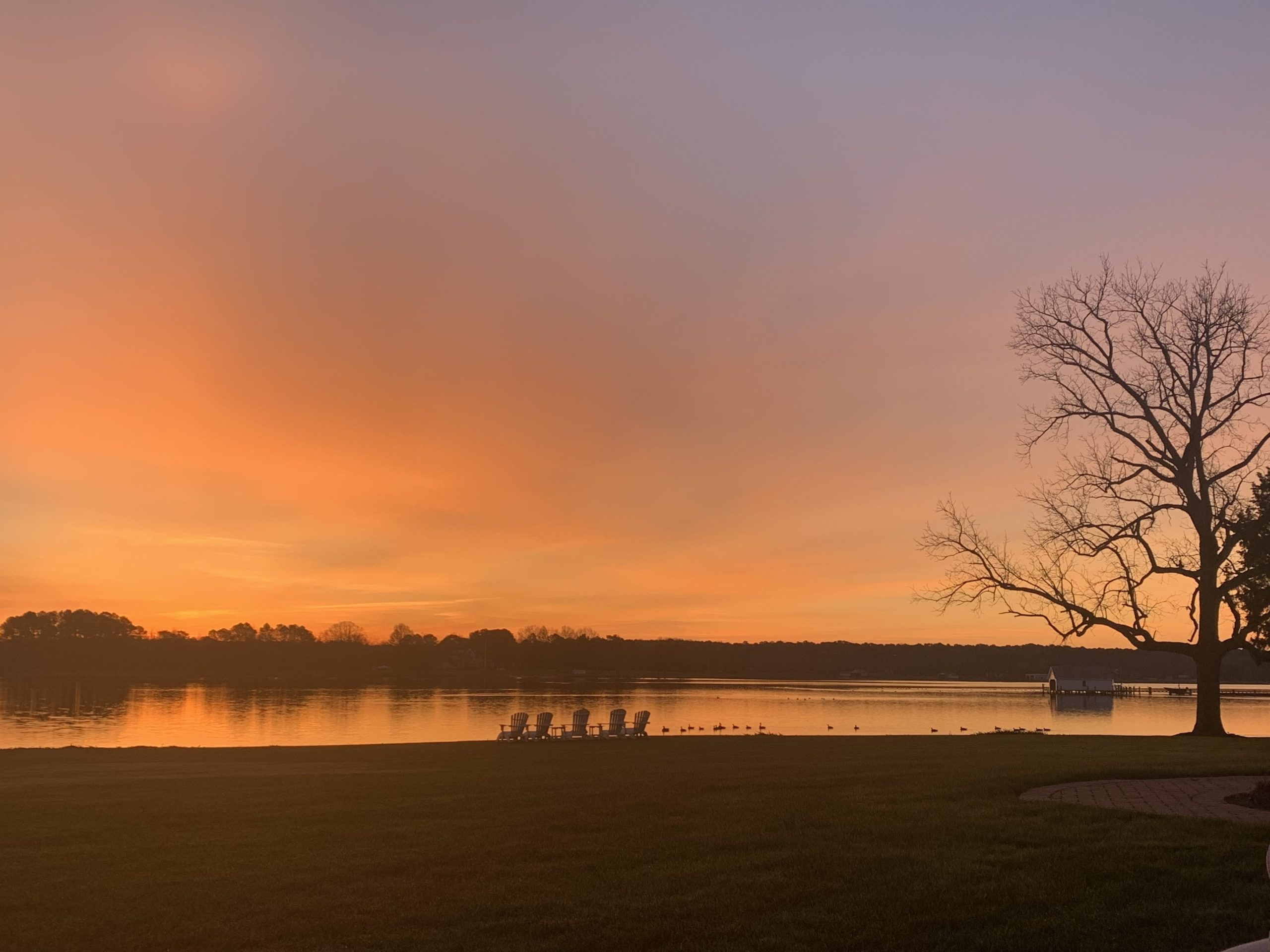
Photo credit: Joanne Leedom-Ackerman
September 30, 2008: African Snapshots
Nigerian Night
The night sky swarmed with pale insects like snowflakes fluttering outside the window of the airplane as it landed at the small airfield in Northern Nigeria. At first they looked like moths, but they were hundreds…thousands of grasshoppers diving into the headlights and fuselage of the plane. Were they cruising the night sky, interrupted by our descent, or had the lights and the hum of the airplane drawn them to their end?
Inside the terminal a luggage belt creaked as bags were pushed one at a time through a small portal onto a set of rollers. When the lights went out and the terminal fell dark, we waited, but the power didn’t return. One by one cell phones flipped open– small arcs of light aimed at the weathered belt as the passengers from Lagos searched for their bags. Dragging suitcases behind us, holding cell phones in front of us to light the way, we plunged into the warm night.
I was in Nigeria as a board member of Human Rights Watch which held meetings there last year. We spoke with government officials after a dubious presidential election. We met with lawyers and human rights activists and teachers and judges and other members of civil society. See HRW reports on Nigeria. We brought experience, research, and expectations. We gained further experience, laid out the expectations, found bridges and absorbed the cacophony of the night.
Tanzanian Morning
On the eastern edge of Africa on the coast of Tanzania the sun rises out of the Indian Ocean like a giant topaz transported from the sub-continent. Around the sun the ocean crashes against the rocks on the coast of Dar es Salaam.
After breakfast I climb into a four-wheeled drive vehicle to go outside the city to visit schools in the countryside where children and teachers are reading and writing and telling stories in Kiswahili and making books to share with other children in the local language. The Children’s Book Project, started in Tanzania in 1991 and has assisted in bringing hundreds of books to publication, distributed these paperback readers into schools, set up libraries in the schools, and trained teachers and artists on how to write and illustrate books and how to teach with these readers. The schools where the CBP is involved have regularly out-performed many of the schools in the country.
In one classroom students perform a story they have read in one of the storybooks. Tabu wa Taire was written by a teacher and tells of a young girl who doesn’t listen to her parents and prefers to play rather than work. One day she wanders too far from home and is captured by a man who puts her inside his drum. Her parents and the village look everywhere for her, but can’t find her until the man comes to their village to play his drum. Someone hears crying from inside the drum, and there the village finds and rescues the girl. The students act out this story for the class and the visitors and end with a celebratory concert on the drum and orange fantas all around.
Ugandan Afternoon
We drive through the bush along a narrow dirt road, the sun beating on the closed windows, the trees hanging down over the path, crowding the road on both sides so that the 4-wheel drive car is literally pushing back the brush as we plow carefully around the turns, occasionally dodging another car or long-horned cattle who amble across the one-lane road to graze on the other side.
We are several hours outside of the capital Kampala and over an hour off the main road, rocking from side to side in the dense undergrowth when suddenly we come to a clearing and a school. The school’s red earthen huts rise from the ground with tin roofs. There are no doors on the huts. There are few books here, and the learning materials hang from the ceilings so that the cows, who can wander in and out of these classrooms, won’t destroy them.
This school is for 75 children of pastoralists–families who make their living tending cattle, moving from place to place with their cows looking for grazing lands. The children usually travel with their parents and don’t have an opportunity to go to school. But here in the clearing, on land donated by one of the more successful in the community, a school has been built; the roofs have been donated by the son of one of the wealthier families. Teachers have been recruited and trained by Save the Children. The children in the school are studying in grade levels 1-4 with the hope that the school will be able to add grades as the children grow. Because there is a school, many of these families, at least the women, will stay in the area while the children attend classes. Some of the women are discussing how to keep the cows out of the classrooms.
September 30, 2009: China at 60–Fate of Liu Xiaobo?
On its 60th Anniversary, China is Still Crushing Freedom
Congress should pass Resolution 151 to speak out on behalf of arrested dissident Liu Xiaobo.
From The Christian Science Monitor
WASHINGTON – The People’s Republic of China celebrated its 60th anniversary today with massive military parades, fireworks, and concerts throughout the country. In mid-November, President Obama will make his first presidential visit to Beijing, marking the 30th anniversary of Chinese-U.S. relations with an agenda likely to include the environment, security, and the global economy.
In the time between these milestones, the fate of an individual Chinese citizen hangs in the balance and may well foreshadow future relations with China. Liu Xiaobo, one of China’s leading writers, intellectuals, and dissidents, is expected to come to trial and be sentenced after the anniversary celebrations and before the president’s visit.
That’s why Congress must act quickly. The proposed Resolution 151 calls for Mr. Liu’s release and urges China to “begin making strides toward true representative democracy.” The resolution notes Liu’s own words: “The most fundamental principles of democracy are that the people are sovereign, and that the people select their own government.”
Resolution 151 should be passed with dispatch before Liu’s trial and sentencing so that it might signal to Beijing how much America cares about the lack of freedom in China. Liu was arrested last December and charged this June with “inciting subversion of state power” for his role as one of the principal drafters of Charter 08, a document that set out a democratic vision for China. Charter 08 was originally signed by more than 300 leading writers, engineers, teachers, workers, farmers – even former public servants and Communist Party officials. It was subsequently signed by more than 10,000 Chinese citizens. The document was circulated widely on the Internet, though it is now blocked in China.
Patterned after Charter 77, which demanded basic civil and political rights in Czechoslovakia when it was under Soviet domination, Charter 08 calls for nonviolent democratic change in China and for a government that recognizes that freedom “is at the core of universal human values,” and human rights are inherent, “not bestowed by a state.”
In a recent visit to Capitol Hill, writers from the Independent Chinese PEN Center, where Liu is a former president, as well as American writers, urged members of Congress to accelerate the passage of Resolution 151. The Chinese writers, who were in touch with Liu up until the day he was arrested, say that they believe a resolution by the US Congress would have a beneficial effect and help mitigate the severity of the sentence, which could be as much as 15 years. However, the resolution needs to pass before his trial and sentencing; otherwise it will come too late….[cont]
September 30, 2010: Full Moon Over Tokyo
Flying west 15 hours I never saw the sun set, but in the evening, between the skyscrapers of Tokyo, I glimpsed the full moon I’d left the night before shimmering on the Potomac, the same full moon beaming down over China, Myanmar, and Vietnam. I found myself contemplating whether the writers in prison in those countries could also glimpse the luminous golden light from a corner of their prison cells. I was in Tokyo for PEN International’s 76th Congress.
Writers from 90 centers of PEN gathered to discuss “The Environment and Literature—What can words do?” and to commemorate the 50th Anniversary of PEN’s Writers in Prison Committee, that particular group of writers who advocate on behalf of colleagues imprisoned, threatened or killed for the expression of their ideas.
In its history, PEN International’s Writers in Prison Committee has been instrumental in getting the releases of such well known writers as Arthur Koestler, Wole Soyinka, Vaclav Havel as well as thousands of others in countries on every continent and from every political condition, from fascist regimes, communist regimes, marginal and faux democracies, wherever words were considered subversive and powerful enough to threaten. At the moment the most cases and the longest prison sentences for writers are in China, Myanmar, Vietnam and Iran, but writers are under threat in over 60 countries with the internet offering a new frontier for protection of free expression.
At the keynote ceremony of the PEN International Congress a play, Water Letters by Hisashi Inoue, dramatized the theme of the earth’s and mankind’s connectedness, especially through water. Human beings are largely made of water, and water—rivers, streams, oceans—links us all, the characters intoned. If the source of water is threatened in one area, there are repercussions in another. There is one earth, one people; the environment is in our hands.
The same can be said of freedom of expression. The 11-year imprisonment of Liu Xiaobo for urging democratic reform in China not only imprisons the man but the possibility of his next ideas. The imprisonment of writers in Myanmar and Vietnam, the more than 60 imprisoned writers, journalists, and bloggers in Iran affect the flow of ideas worldwide. The more than 50 journalists killed in Mexico chills freedom and undermines the rule of law beyond Mexico’s borders.
Yet ideas, like water, have a way of flowing around barriers and through bars and seep into the stream of thought if passed from one person to the other. And so writers outside prison pass on the work and writing of their colleagues.
Looking up at the moon, we contemplate the universe from the same point of focus and glimpse for a moment our connectedness.
September 28, 2011: Bridge Over the Bosporus: Citizenship on the Rise
The sun glints off the waves of the Bosporus as the wind skims across the surface of the water, and power boats, tourist ships and ferries cruise between the shores of Europe and Asia on Istanbul’s great waterway. I’ve arrived to an Indian summer in this city at the crossroads of Europe, Asia and the Middle East after a PEN International Congress an hour and a half away in Belgrade where the theme was Literature—Language of the World.
I’m here with purpose and meetings, but for the afternoon I have a few hours to sit on the banks of the waterway and write and contemplate the bridges linking the two continents and consider what it takes to construct and maintain a bridge.
While I’m in Istanbul, the newspapers have been filled with headlines about Turkey’s Prime Minister Erdogan’s trip to Libya, Egypt and Tunisia and his message to those involved in the Arab Spring. He urges the citizens to adopt “laicism” and become “laic states” like Turkey. (‘Laicism’ is the secular control of political and social institutions in society.) The message from this Muslim leader has stirred controversy, especially from neighboring Iran which has warned against the Western secular state.
The bridge at question here is a mighty and lengthy suspension bridge between religion and politics, between the state and its citizens. It swings over centuries of history. The concept of “citizen” wasn’t applicable for a large swath of history and geography and is still problematic in many countries which perceive their residents as serving the state and those in power, which often include the clergy, rather than the state and its leaders serving their citizens.
All one needs to do is wander through the grounds of the splendid and opulent Topkapi Palace, which Sultan Mehmed built after he conquered Constantinople (now Istanbul) in the fifteenth century. He declared the city as one of the three capitols of the Ottoman Empire and proceeded to spend the state’s treasury on the palace. Later others spent it on a lavish harem filled with women who only the Sultan had the right to visit. The Ottoman Empire, which stretched over two million square miles at its height and spanned over 600 years, bore the motto: “The Eternal State.”
A decade after the Sultan finished his new palace at Sarayburnu, Spanish trading ships sailed across the Atlantic and ran into a land they named America. Here ideas of citizenship would evolve and the residents of this new territory would challenge, along with those from other nations, the monarchies and empires of Europe.
The role and boundaries of citizenship continue to evolve. I remain hopeful that the full rights of all citizens might emerge in the uprisings in the Middle East. On the Bosporus I’m sitting now on the European side, and I see that the ferry I’ve been watching has arrived on the Asian shore.
September 15, 2012: North Korean Writers in a Land of the Rising Sun
I’m flying home from the 78th PEN International Congress in Gyeongju (Kyongju), South Korea, peering out the airplane window under the shade at the floor of clouds. The sun is just beginning to emerge above the horizon, turning the white billowing floor red as if fire were simmering beneath. On the horizon the orange-yellow line of sunlight glows then diffuses into the blue sky. The sun itself suddenly appears, a solid bold globe of fire, and the fire beneath the clouds grows dark.
However many sunrises I watch in however many circumstances—on airplanes, on a beach, in a city building, I take pause in wonder, breathe in and watch the larger movement of life.
Returning at 30,000 feet from a conference of writers from 85 PEN Centers around the world, I remember the first time I was in Korea 24 years ago—over 8700 sunrises ago. At PEN’s Congress in Seoul in 1988, a week before the Olympic Games security was high with bomb sniffing dogs and extensive car checks. The political environment was tense. Writers and publishers were in prison in South Korea, and PEN was divided on how to conduct its business in a country where freedom of expression was challenged. A contingent visited the writers in prison; I visited with the family of one of the writer/publishers. We lobbied inside and outside the official Congress for the freedom of these writers. After the Congress a number were released, including the one whose family I had visited.
Now 24 years later there are no writers or publishers in prison in South Korea. The PEN gathering in the mountainous city of Gyeongju, the ancient capital of the Shilla Dynasty where the rays of the rising sun first touch the land, focused instead on writers from North Korea, where there is no freedom….[cont]
September 16, 2013: Parallel Universe in a Glassed Concert Hall in Iceland
If you want to understand politics—it’s like being in a book club where everyone discusses the grammar.
So said actor/comedian Jon Gnarr, Mayor of Reykjavik, Iceland when he addressed the recent 79th PEN International Congress. Gnarr was elected Mayor in 2010 from the Best Party, which he and friends with no background in politics created as a satirical party after the economic meltdown in Iceland a few years ago. They won over a third of the seats on the City Council with a platform that included free towels in all swimming pools, a polar bear for the zoo and “all kinds of things for weaklings.” After he was elected, Gnarr declared he wouldn’t form a coalition government with anyone who hadn’t watched the TV series The Wire.
The politician with a short black tie, a sense of humor and a view of politics as a parallel universe resonated with the audience of over 200 writers at the Opening Ceremonies of the PEN Congress. Writers from 70 centers of PEN gathered to deliberate and debate literature and the situation for writers and freedom of expression around the world, a world they agreed often bordered on the absurd, but the absurd with serious consequences.
The Assembly discussed and passed resolutions on the challenges to freedom of expression in countries including Mexico, China, Cuba, Vietnam, North Korea, Eritrea, Belarus, Syria, Egypt, Turkey, Tibet, and Russia. The delegates walked en masse to the Russian Embassy to present their resolution protesting the recent legislation on blasphemy and “gay propaganda.” And they applauded the announcement during the Congress of the release of Chinese poet Shi Tao 15 months before the end of his 10-year sentence….[cont]
September 8, 2014: Boston on a Sunday Afternoon
The sun is shining. The swan boats are cruising on the pond in the Boston Commons. Joggers are jogging along the park. Children are running after ducks; parents are running after children. University students have returned en mass from summer so the hum of young people hums in Boston and its neighboring city of Cambridge, ever the student’s town. People from all backgrounds, speaking Spanish, Vietnamese, Arabic, French, Russian and languages I don’t recognize pass by as I sit on a park bench.
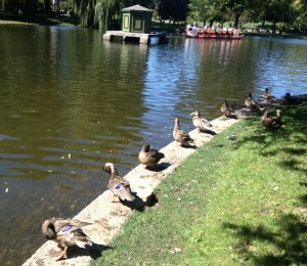
For a moment I don’t want to think about ISIS or terrorists’ attacks or the beheadings of writers, who are friends of people I know, writers and their families whom I can’t help but think about and want to honor, or to think about those who must decide what our country does next or those who will take the risk to do it.
All this is on my mind and on the minds of people in Washington where I live. But for a moment I look out and take a breath and watch Boston on a Sunday afternoon before the world accelerates, a few days before we mark again the events of 9/11. I want to savor and remember this moment just for a moment. It is the point after all.
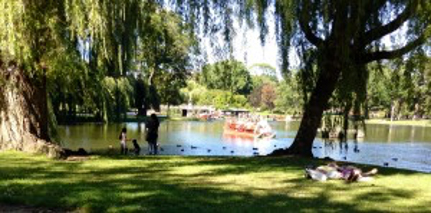
September 25, 2015: Unity on the Potomac?
The Potomac is smooth as a mirror today. The wind occasionally dusts its surface. On lamp posts by the river, American flags catch a light breeze and flutter under an overcast sky. Fall is stirring in the air though joggers still run in shorts and tee shirts and students pace to the boathouse for afternoon rowing practice.

A mile form here Washington is recovering from two major State visits in four days—first Pope Francis and literally on his papal heels, Chinese President Xi Jinping.
But here on the river with a view of Memorial Bridge and the Kennedy Center, of the traffic cruising on Rock Creek Parkway and airplanes taking off from National airport, it is unusually quiet for a Friday afternoon. Couples stroll by. A mother with a pram stops and looks out on the gray-brown water. The city is perhaps letting out its collective breath. There have been no attacks, no disasters.
Washington has feted and listened—been told to unify for greatness by the Pope and then looked for common cause with the Chinese leader who has limited shared values and certainly not an agenda of individual freedom.
It is always an existential question whether America—“one nation under God with liberty and justice for all”—can live its ideals and live in the world.
From a political point of view, the right to dissent and the forums to express disunity are fundamental and the very evidence of a nation breathing, of a democracy working. No one is arrested or imprisoned for their disagreements. We have the freedom to be in gridlock though surely there is a better way to demonstrate freedom. The question ahead as political campaigns heat up is whether we can breathe and disagree and at the same time govern and guide.
The spiritual call for unity is one each citizen must find in his own sanctuary, not in the halls of Congress.
As I’m writing, I hear sirens whining in the distance growing louder and louder, and in front of me on this terrace overlooking the river, a great crane appears and a wall is literally lifted out of the walkway. I’m told these walls, which lay buried most of the time, were installed after the last great flood wiped out the waterfront. The waitress returns and tells me they are now raised on any threat of a flood. Down river floods have occurred and may be moving our way.

No blog posted September 2016
September 8, 2017: “Finding Room for Common Ground: No Enemies, No Hatred”
The train from Copenhagen airport to Malmö, Sweden took just half an hour across the 21st century Øresund Bridge, which spans five miles of water, then the train dove into 2.5 miles of tunnel. Looking out the window at farmland and the blue waters of the Baltic Sea, I imagined this journey was not so easy 74 years ago with Nazis in pursuit. In 1943 as the Nazis went to sweep Denmark’s 7800 Jews into concentration camps, Danish and Swedish citizens rallied, and 7220 people managed to escape in boats across this Sound to nearby Sweden. Thousands landed in Malmö where I was headed for a less dramatic, but still fraught, occasion.

Members of the Independent Chinese PEN Center (ICPC) whose writers live inside and outside mainland China were joining writers from Uyghur PEN, Tibetan PEN and members from Inner Mongolia, along with writers from PEN Turkey and Azerbaijan for the First International Conference of Four-PEN Platform: “Finding Room for Common Ground: No Enemies, No Hatred.” Swedish PEN was providing the safe space for debate, discussion and strategies of action on human rights and freedom of expression. Just six weeks before, one of ICPC’s founding members and honorary President Nobel Laureate Liu Xiaobo, died in a Chinese prison after serving nine years of an 11-year sentence for drafting Charter 08, a document co-signed by 308 writers and intellectuals calling for a more democratic and free China.
A recognized leader in China’s Democracy Movement, Liu Xiaobo’s loss was deeply felt. A number of the writers gathered knew and worked with Liu. Most knew at least one fellow writer in prison. Many now live in exile themselves. Almost half of PEN International’s writers-in-prison cases are located in the regions represented at the conference.
 The theme “No Enemies, No Hatred”—drawn from Liu Xiaobo’s final statement at his trial—sparked the debate in Malmö.
The theme “No Enemies, No Hatred”—drawn from Liu Xiaobo’s final statement at his trial—sparked the debate in Malmö.
Keynote speaker Nobel Laureate Shirin Ebadi challenged, “But I do have enemies and I do feel hatred.” Facing death threats from her government in Iran, she had to leave everything behind at age 63 and move to London.
“Liu Xiaobo said he had no hatred and no enemies, but he also never compromised with any dictators,” she noted. “We must fight against dictators but our weapons are our pens and are nonviolent. We must not be silent. We can’t compromise with governments such as China who would eradicate an ‘empty chair’ from the internet.” [When Liu Xiaobo was unable to attend the Nobel ceremony because he was in prison, the Nobel Committee placed an empty chair on stage to represent him. The Chinese government is said to have censored the term “empty chair” from the internet in China.]
“What is the use of a pen if Liu Xiaobo is dead?” challenged one writer. Another speculated that if Liu Xiaobo had known how his life would end, he would have changed his message. A friend of Liu’s assured that he would not because for him no enemies and no hatred was a spiritual commitment….[cont]
September 28, 2017: Reclaiming Truth in Times of Propaganda
PEN International’s 83rd Congress in Lviv, Ukraine took on truth and words, history and memory, women’s access and equality, cyber trolling, fake news and threats to freedom of expression worldwide, including public panels focused on the three super powers: “America’s Reckoning—Threats to the First Amendment in Trump’s America,” “China’s Shame—How a Poet Exposed the Soul of the Party,” and “Putin’s Power Play—The Decline of Freedom of Expression in Russia.”
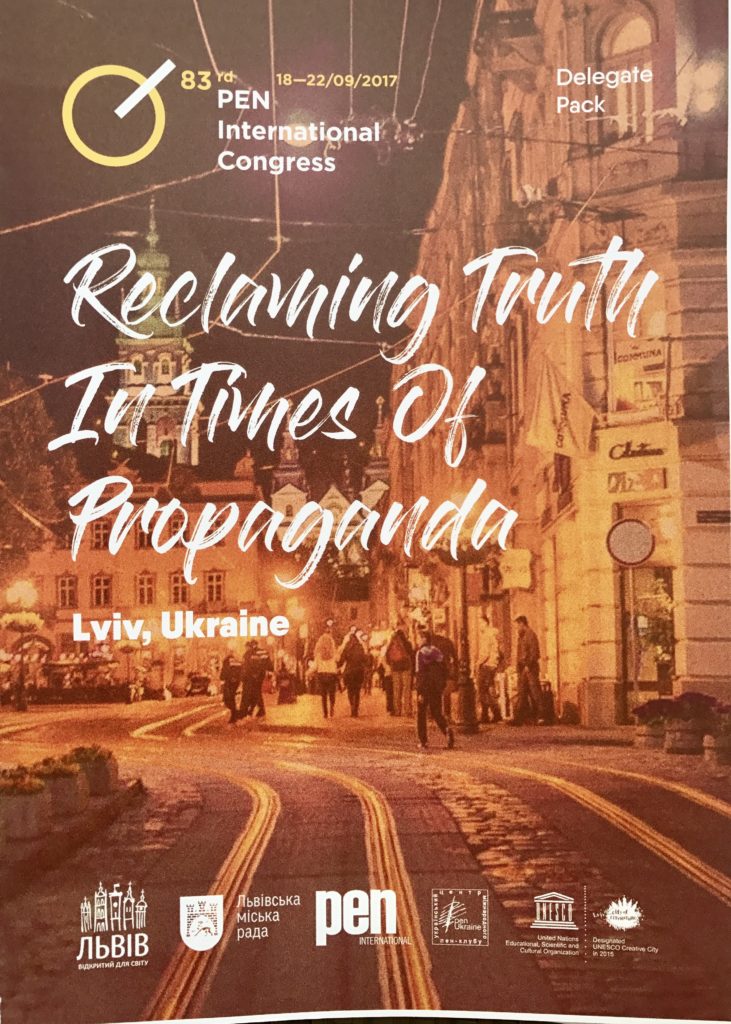

At its annual gathering PEN hosted more than 200 writers, editors, staff and visitors from 69 PEN centers around the world in the historic city of Lviv, the Cultural Capital of Ukraine and a UNESCO World City of Literature. Straddling the center of Europe, on the fault lines between East and West, Lviv changed its name and governing domain eight times between 1914 and 1944, passing from the Austro-Hungarian Empire to Russia, back to Austria, Ukraine, Poland, Soviet Union, Germany then back to the Soviet Union and now finally in the Ukraine.
The path of European history cuts through the city and can be seen in architecture, culture and conversation. Though writers celebrated literature in the western Lviv, fighting was still underway in eastern Ukraine and the Crimea. PEN’s Russian center didn’t attend the Congress at the same time a new PEN St. Petersburg center was elected. Other new centers joining PEN’s network included Cuba, the Gambia and South India.
In times of war, the first casualty is truth, noted PEN’s report “Freedom of Expression in Post-Euromaidan Ukraine: External Aggressions, Internal Challenges.” The report and the Congress addressed the aggressive role of propaganda in conflict. In Ukraine, in Russia and worldwide there has been a proliferation of false narratives.
PEN’s report on Ukraine noted: “Despite significant improvements, democracy in Ukraine remains ‘a work in progress’ and, among other things, severe challenges to the enjoyment of the right to free expression remain. These include the use of the media to foster political interests and agendas, delays in reforming state-owned media; and intimidation and attacks on journalists followed by impunity for the perpetrators. On the other hand, public criticism is growing, albeit slowly, including demands for more transparent and unbiased journalism.”
In Russia authorities are taking increasingly extreme legal and policy measures against freedom of expression, according to a PEN/Free Word Association report “Russia’s Strident Stifling of Free Speech.”

No writers are in prison in Ukraine, but in the Crimea, which Russia annexed in 2014, filmmaker Oleg Sentsov, an opponent of annexation, was arrested and is now serving a 20-year sentence inside a Russian prison on terrorism charges he denies. At PEN’s Assembly, delegates remembered Pavel Sheremet with an Empty Chair. A Belarusian-born Russian journalist and free speech advocate, Sheremet wrote for an independent news website and hosted a radio show where he reported and commented on political developments in Ukraine, Russia and Belarus. He died in a car bomb explosion in Kiev July 2016. Shortly before he was assassinated, he’d written about corruption among law enforcement in Belarus, Ukraine and propagandists in Russia. His murder remains unsolved….
PEN also passed a Women’s Manifesto noting “the use of culture, religion and tradition as the defense for keeping women silent as well as the way in which violence against women is a form of censorship needs to be both acknowledged and addressed.”
At the Opening Ceremony author of East West Street Philippe Sands, whose grandfather was born in Lviv, narrated the origins of international human rights law and the concepts “crimes against humanity” and “genocide.” These legal frameworks were developed by two lawyers who passed through the very university where the delegates sat. The legal teams prosecuting at the Nuremberg trials after World War II used these frameworks to secure convictions, including the conviction of Hans Frank, Hitler’s lawyer who governed the area around Lviv and sent over 100,000 Jews to concentration camps and death.
“The Foundations of human rights law came from here,” Sands said. “Every individual has rights under international law.” The lawyers Hersch Lauterpacht and Raphael Lemkin studied at the university at different times but never met. One escaped to Austria then England, the other to America. Lauterpacht protected the rights of the individual with the concept he developed of “crimes against humanity” and Lemkin protected the group with the legal construct for “genocide.” Both men were on the legal teams that successfully secured convictions at Nuremberg.
“No organization in the world knows better than PEN the need to protect individuals and to protect others,” Sands concluded….[cont]
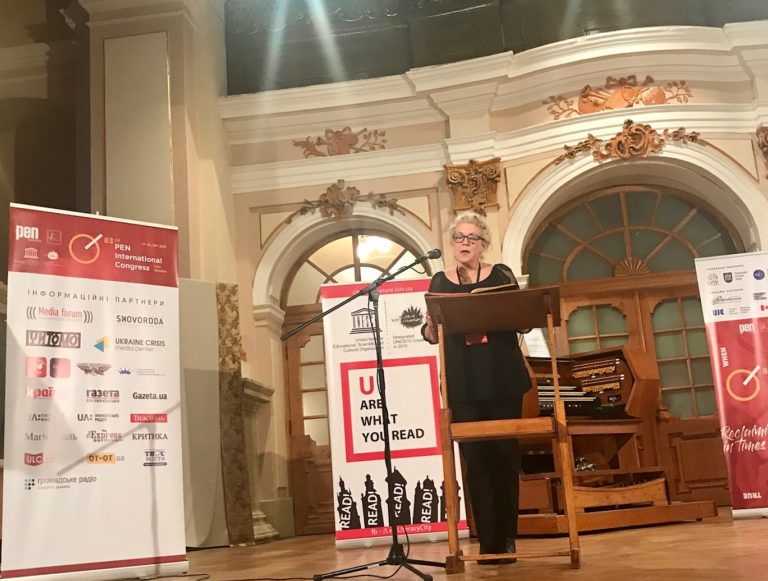
Jennifer Clement, PEN International President
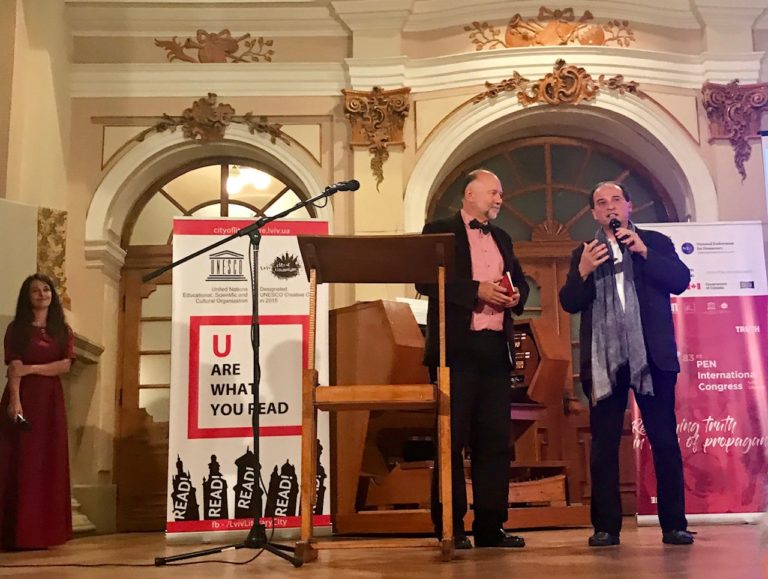
Andrei Kurkov from Ukranian PEN and Carles Torner, Executive Director PEN International
No blog posted September 2018
September 2019: [Beginning in May 2019 I started writing a retrospective of work with PEN International for its Centenary so posts were more frequent in 2019-2020. In September 2019 there were two posts in the PEN Journeys and in September 2020 there were four.]
September 3, 2019: PEN Journey 8: Thresholds of Change…Passing the Torch
PEN International celebrates its Centenary in 2021. I’ve been active in PEN for more than 30 years in various positions and now as an International Vice President Emeritus. With memories stirring and file drawers of documents and correspondence bulging, I am a bit of a walking archive and have been asked by PEN International to write down memories. I hope this personal PEN journey might be of interest.
In fall, 1991 I went to Moscow just months after the August coup attempt in which hardline Communists sought to take control from President Mikhail Gorbachev. I hopped onto the visa of my husband who was traveling to Russia as a Visiting Scholar at the International Institute of Strategic Studies in London. I went as a writer, interested in meeting other writers. I contacted fellow PEN member and Russian translator Michael Scammell, who had previously chaired International PEN’s Writers in Prison Committee (WiPC). Michael gave me a list of writers to contact in Moscow.
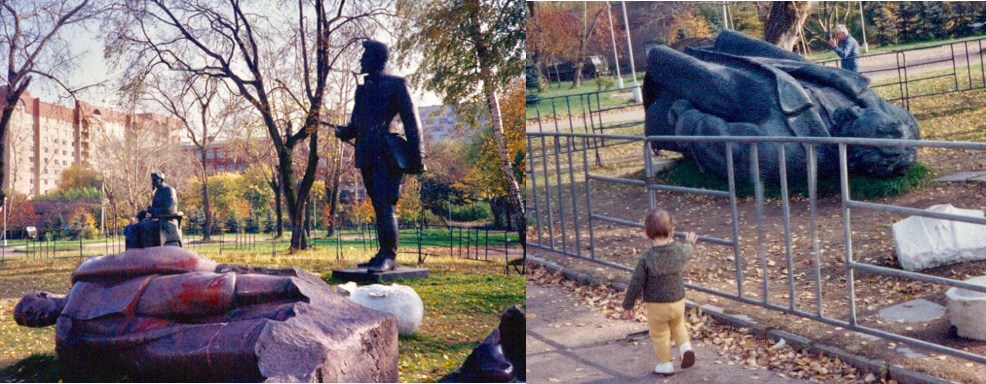
Statues toppled of Lenin and Stalin and others in park after failed coup attempt in Moscow, 1991.
My husband and I stayed in what I was told was one of the government hotels where guests were hosted but also watched. We were watched too, I’m fairly certain, though there was little for anyone to see with me. I was cautious as I made contact with the writers lest my reaching out compromise them. Only a few years before, PEN’s case list had included many dissident Soviet writers in prison. Michael and later WiPC Chair Thomas von Vegesack and PEN’s WiPC committees around the world had advocated for the release of dissident Soviet writers, many of whom were imprisoned in the gulags. PEN had also covertly sent aid to them and their families through the channels of the PEN Emergency Fund.
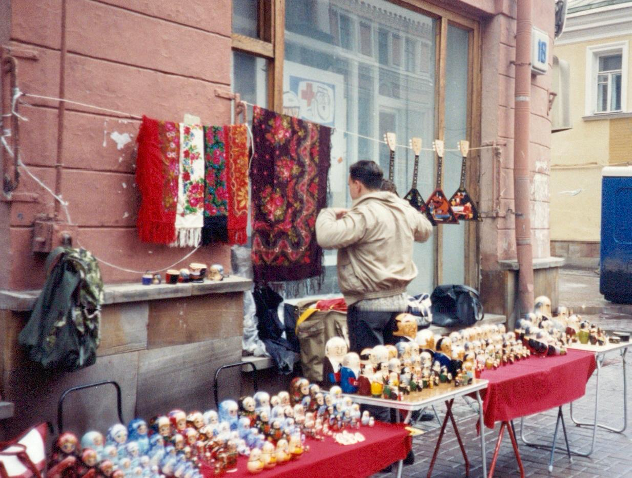
Stall of street vendor selling Russian Matryoshika dolls, including stacking dolls of Boris Yeltsin and Mikhail Gorbachev and also U.S. Presidents.
I no longer remember if I called or faxed the writers in advance. (Fall, 1991 was before an active internet.) I likely made contact when I arrived. The writers welcomed me. We met in simple apartments with old holiday cards on the mantles as decorations, a paper mobile hanging from the light fixture over one dining room table I recall, strips of newspaper stacked by the toilets in lieu of tissue. The economy was spare for these writers. They hoped for change and for freedoms to come, but they were cautious. In these meetings and in other random encounters, people were curious about the United States. On the street, vendors not only sold Russian nesting dolls with the rushed visages of Boris Yeltsin, who had defied the tanks of the coup, and of Gorbachev but also stacking dolls of U.S. presidents, including one set that had George Washington and Abraham Lincoln. I was asked by numbers of people, including the writers, if I could get them copies of the U.S. Constitution and the Federalist papers. The Berlin Wall had fallen and times were changing, but no one knew how that change would settle out in the Soviet Union.
I remember one meeting in Moscow with members of a women’s theater cooperative—actresses, director, costume designer, and playwright. Before the member who spoke English arrived, we were left to communicate with each other by hand gestures and a few common words. Finally, the sturdy, broad-chested Russian writer who spoke English entered. I asked her what she did during the coup attempt. She stood, spread out her arms and declared triumphantly, “I stopped the tanks with my breasts!” This image has stayed with me, along with her words and the determined words of her fellow thespians and writers in that apartment, women demanding as their due freedoms they hadn’t yet experienced….[cont]
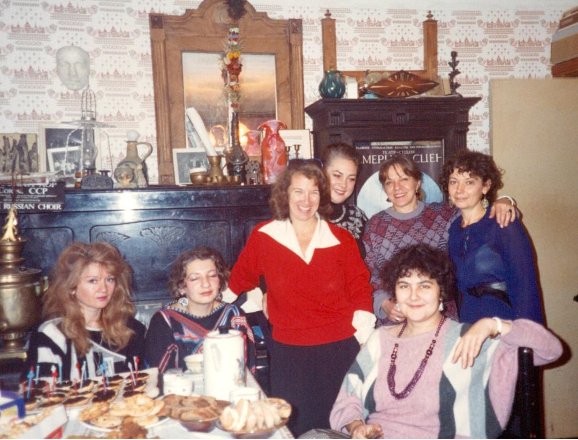
Joanne and members of Russian women’s theater cooperative in Moscow apartment, 1991.
September 20, 2019: PEN Journey 9: The Fraught Roads of Literature
Twelve-foot puppets danced outside the dining room’s second floor windows at our hotel, billed as the “oldest hotel in the world,” set on the central plaza of Santiago de Compostela, Spain, the venue for PEN International’s 60th Congress.
Sara Whyatt, coordinator of PEN’s Writers in Prison Committee, and I hurried to finish breakfast and our agenda before we joined the crowds outside at the historic Festival of St. James. That evening International PEN’s 60th Congress would convene. Hosted by Galician PEN, the Congress had as its theme Roads of Literature, which seemed appropriate as pilgrims from around the world also gathered on the Obradoiro Plaza in front of the ancient Cathedral, the destination for their Camino.
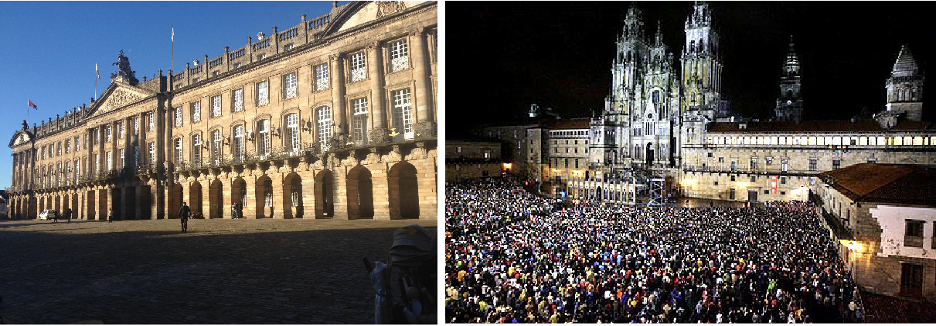
Parador Hotel, Santiago de Compostela St. James Festival, Obradoiro Plaza, Santiago de Compostela
At this Congress the presidency of PEN was changing hands as was the chairmanship of the Writers in Prison Committee, which I was taking over from Thomas von Vegesack. Ronald Harwood, the British playwright, was assuming the PEN presidency from Hungarian novelist and essayist György Konrád, who had been a philosophical president, often running the Assembly meetings like a stream of consciousness event where the agenda was a guide but not necessarily a governing map. Ronnie ran the final meeting like a director and dramatist, determined to get the gathering from here to there with a path and deadline. Both smart, experienced writers, committed to PEN’s principles, they had very different styles. Known only to a few of the delegates a surprise visitor was also arriving mid-Congress.
The 60th Congress in September 1993 was a watershed of sorts. It was the first since the controversial Dubrovnik gathering six months before which had split PEN’s membership (see PEN Journey 8) because of the war in the Balkans.
Konrád’s opening speech to the Assembly explained that PEN’s leadership had gone ahead with the congress over the many objections from PEN centers because the venue had been approved earlier by the Assembly and the host center had been unwilling to postpone. He acknowledged the widespread criticism and also the concern that some individuals who fomented the Balkan wars and participated in alleged war crimes were writers who had been members of PEN. He said, “That these men of war also include men of letters, indeed that these latter are well represented, painfully confronts our professional community with the notion of our responsibility for the power of the Word. Nationalist rhetoric led to mass graves here, and there. Mutual killings would not have been on such a scale in the absence of words that called on others to fight or that justified the war.”
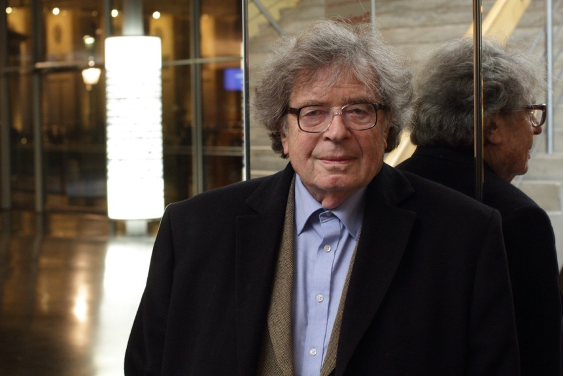
György Konrád, PEN International President 1990-1993, Credit: Gezett/ullstein bild, via Getty Images
Konrád’s address at the opening session went a way in bringing the delegates together. “What we can do is to try and ensure the survival of the spirit of dialogue between the writers of the communities that now confront each other….International PEN stands for universalism and individualism, an insistence on a conversation between literatures that rises above differences of race, nation, creed or class, for that lack of prejudice which allows writers to read writers without identifying them with a community…
“Ours is an optimistic hypothesis: we believe that we can understand each other and that we can come to an understanding in many respects. The existence of communication between nations, and the operation of International PEN confirm this hypothesis…PEN defends the freedom of writers all over the world, that is its essence.”
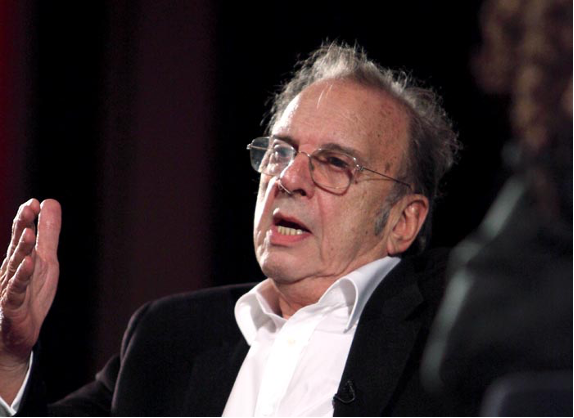
Ronald Harwood, PEN International President 1993-1997. Credit BAFTA
Ronald Harwood added in his acceptance for the presidency: “The world seems to be fragmenting; PEN must never fragment. We have to do what we can do for our fellow-writers and for literature as a united body; otherwise we perish. And our differences are our strength: our different languages, cultures and literatures are our strength. Nothing gives me more pride than to be part of this organization when I come to a Congress and see the diversity of human beings here and know that we all have at least one thing in common. We write…We are not the United Nations…We cannot solve the world’s problems…Each time we go beyond our remit, which is literature and language and the freedom of expression of writers, we diminish our integrity and damage our credibility…We don’t’ represent governments; we represent ourselves and our Centres…We are here to serve writers and writing and literature, and that is enough…And let us remember and take pleasure in this: that when the words International PEN are uttered they become synonymous with the freedom from fear….”[cont]
September 2, 2020: PEN Journey 40: The Role of PEN in the Contemporary World
At the end of September 2005 a Danish newspaper published 12 editorial cartoons which depicted Mohammed in various poses as part of a debate over criticism of Islam and self-censorship. Muslim groups in Denmark objected, and by early 2006 protests, violent demonstrations and even riots erupted in Muslim areas around the world. The offense was the “blasphemy” of drawing Mohammed in the first place and the particular mockery of some of the depictions in the cartoons.
The uproar over the Jyllands-Posten Mohammed cartoons quickly drew PEN into the controversy, first through Danish PEN and then through the International PEN office and other PEN Centers. PEN included many Muslim members and numbers of centers in majority Muslim countries. All PEN members and centers endorse the ideals stated in the PEN Charter. However, the third and fourth articles of the Charter which addressed the situation, also at times appeared to contradict each other:
Article 3: “Members of PEN should at all times use what influence they have in favour of good understanding and mutual respect between nations and people; they pledge themselves to do their utmost to dispel all hatreds and to champion the ideal of one humanity living in peace and equality in one world.”
Article 4: “PEN stands for the principle of unhampered transmission of thought within each nation and between all nations, and members pledge themselves to oppose any form of suppression of freedom of expression in the country and community to which they belong as well as throughout the world wherever this is possible. PEN declares for a free press and opposes arbitrary censorship in time of peace. It believes that the necessary advance of the world toward a more highly organized political and economic order renders a free criticism of governments, administrations and institutions imperative. And since freedom implies voluntary restrain, members pledge themselves to oppose such evils of a free press as mendacious publication, deliberate falsehood and distortion of facts for political and personal ends.”
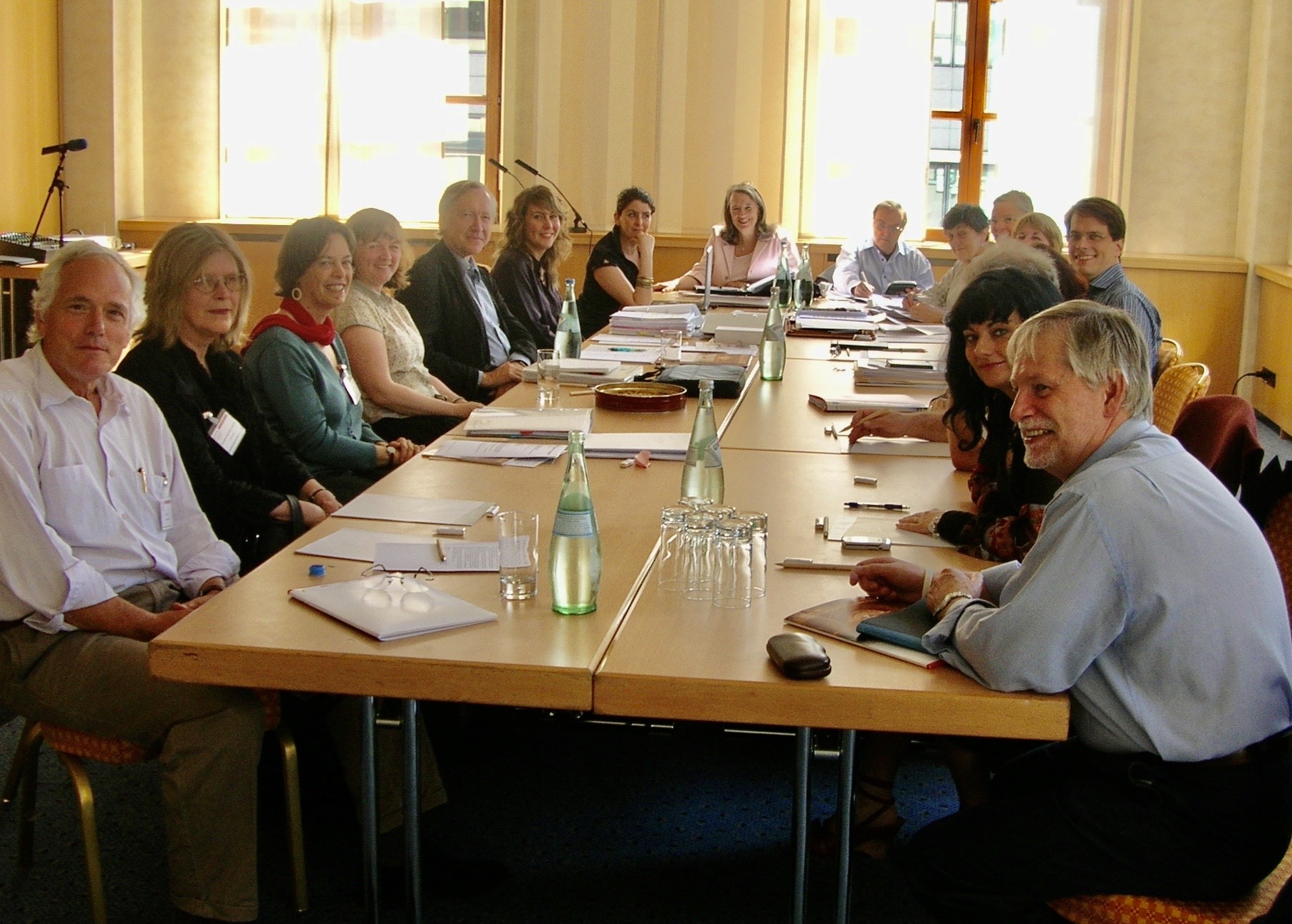
PEN International Board and Staff 2006. L to R: Eric Lax (PEN USA West), Elizabeth Nordgren (Finish PEN), Jane Spender (Programs Director) Sara Whyatt (Writers in Prison Committee Director), Eugene Schoulgin (Norweigan PEN), Caroline McCormick Whitaker (Executive Director), Karen Efford (Programs Officer), Joanne Leedom-Ackerman (International Secretary), Jiří Gruša (International President), Judith Rodriguez (Melbourne PEN), Britta Junge-Pederson (Treasurer), Judith Buckrich (Women Writers Committee Chair), Chip Rolley (Search Committee Chair), Sylvestre Clancier (French PEN), Sibila Petlevski (Croatian PEN), Peter Firkin (Centers Coordinator) [not pictured: Mohammed Magani (Algerian PEN), Karin Clark (WiPC Chair), Kata Kulavkova ( Translation and Linguistic Rights Chair)
At the Peace Committee conference that April, I observed, “The Charter of PEN asserts values that can appear contradictory, but represent the dialectic upon which free societies operate and tolerate competing ideas…In our 85th year, International PEN still represents that longing for a world in which people communicate and respect differences, share culture and literature, and battle ideas but not each other….”[cont]
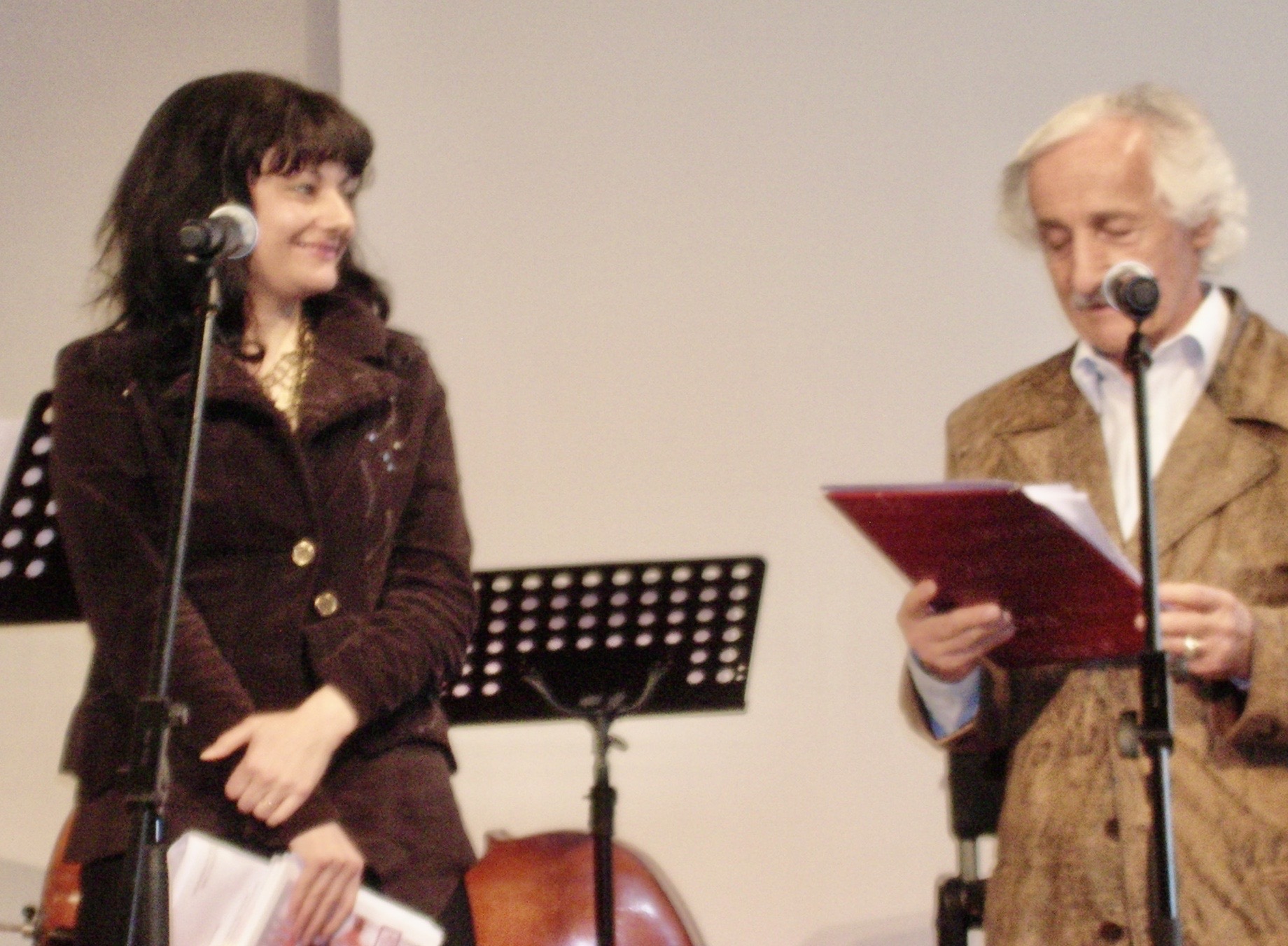
Peace Committee program 2006. Sibila Petlevski (Croatian PEN), Veno Taufer (Peace Committee Chair)
September 9, 2020: PEN Journey 41: Berlin—Writing in a World Without Peace
I first visited Berlin in the fall of 1990 just after Germany reunited. I was living in London and took my sons, ages 10 and 12, to witness history in the making. I returned on a number of occasions, researching scenes for a book, attending meetings, and visiting German PEN in preparation for PEN’s 2006 Congress. Each time Berlin’s face was altered as the municipalities east and west moved to become one city again.
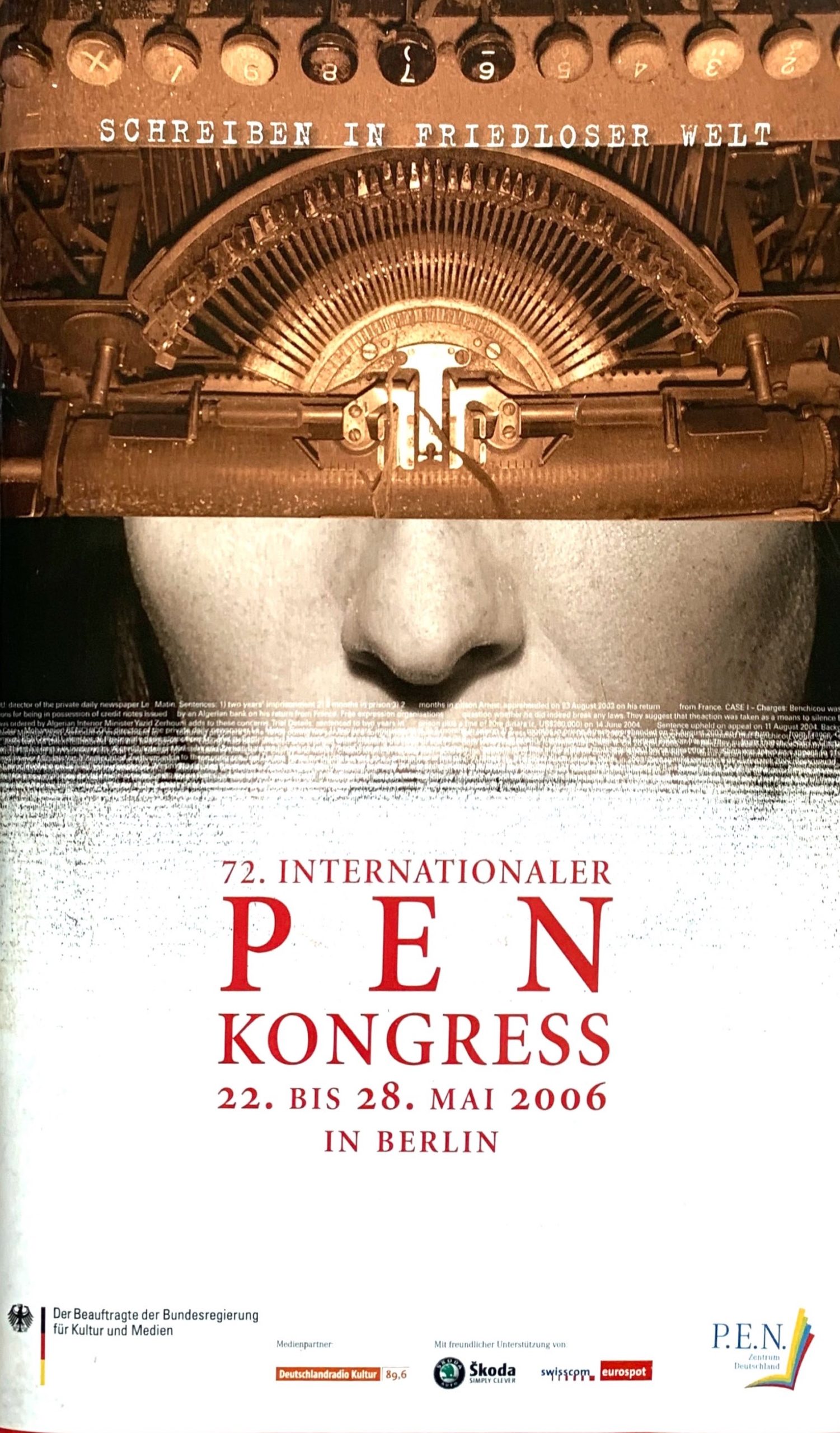
PEN International’s 72nd World Congress, Berlin, 2006
At the time of PEN’s Congress in May 2006, Berlin was bedecked with water pipes above ground—pink, green, blue, red—before the city buried its plumbing and infrastructure beneath the streets. Portions of the city had the appearance of an amusement park; there were also sections of the Berlin Wall with its colorful graffiti still standing, more as art exhibit than stark barrier to freedom.
“Welcome to a United Berlin” the German PEN President headlined his letter to the 450 delegates and participants for PEN’s 72nd World Congress. The Congress theme “Writing in a World Without Peace” was challenged by the reunification of Berlin and Germany, a historic event which bode well for the prospects of peace and which stood in contrast to the history that had come before. Yet the globe was still in conflict in the Middle East, in Asia and in Latin America where writers were under threat.
“There are countries such as Iran, Turkey or Cuba, where authors are jailed because of their books,” noted International PEN President Jiří Gruša. Resolutions at the Congress addressed the situations for writers imprisoned or killed in China, Cuba, Iran, Mexico, Russia/Chechnya, Sri Lanka, Uzbekistan, Vietnam, and other countries.
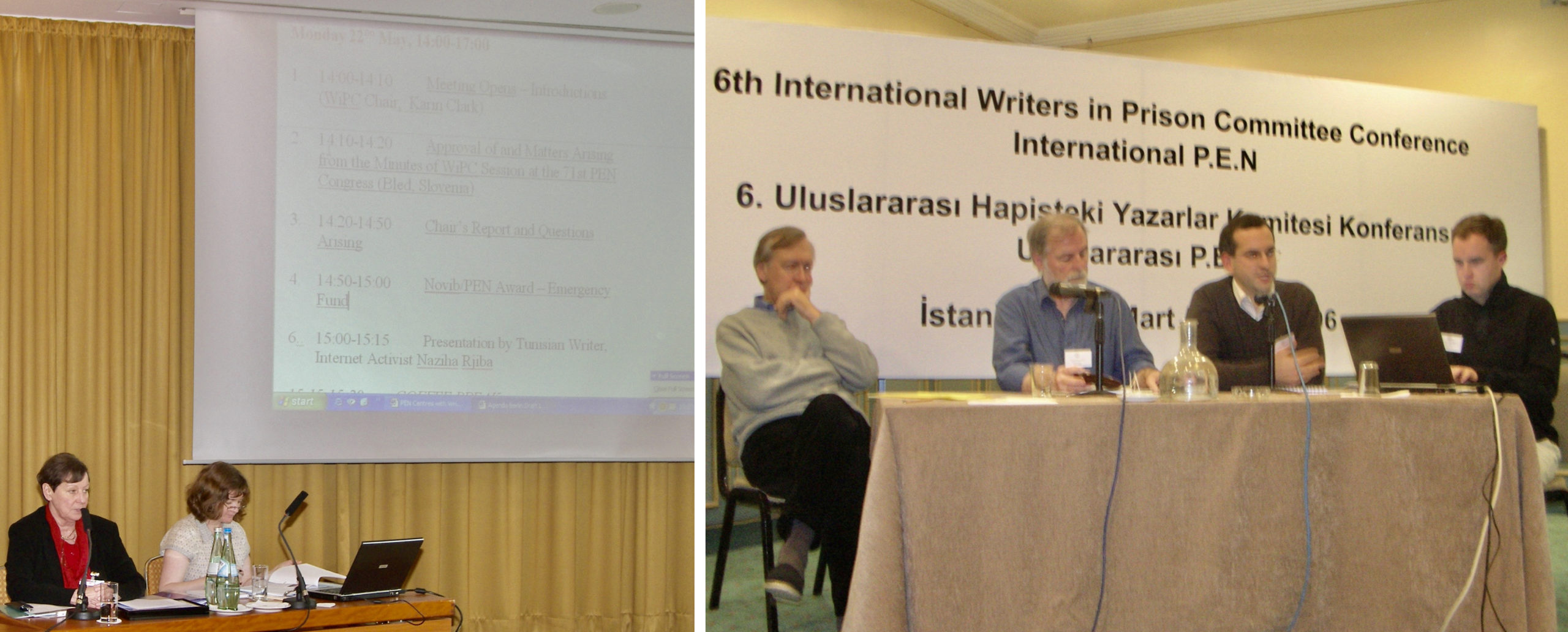
Left: Writers in Prison Committee (WiPC) meeting at Berlin Congress. Karin Clark (Chair WiPC) and Sara Whyatt (WiPC Program Director). Right: WiPC Conference in Istanbul: Eugene Schoulgin (Norwegian PEN/PEN Board), Jens Lohman (Danish PEN), Jonathan Heawood (English PEN), Notetaker
Two months before in March, over 60 writers from 27 PEN centers in 23 countries had gathered for International PEN’s Writers in Prison Committee conference in Istanbul where the WiPC planned a campaign against insult and criminal defamation laws under which writers and journalists were imprisoned worldwide. The conference also addressed the recent uproar over the Danish cartoons, impunity and the role of internet service providers offering information on writers, especially in China. A working group formed to support the Russian PEN Centerwhich was under pressure from the Russian government.
Berlin, however, was sparkling and filled with the energy of reunification. “Today, this city—once separated by a Wall most drastically manifesting the division of Germany and Europe—has not only been re-established as the capital of Germany, but has simultaneously turned into a thriving meeting-place between East and West and North and South,” welcomed Johano Strasser, German PEN President. “Here in Berlin, history in all its facets—from the great achievements of German artists, philosophers and scientists to the crimes of the Nazis—has left its mark on the urban landscape.”
PEN’s 72nd Congress marked PEN’s 85th Anniversary and was a grand occasion. Chancellor Angela Merkel hosted a reception at the Chancellor’s office. President of the Federal Republic of Germany Horst Kohler gave the welcoming address at the Opening Ceremony, noting, “If Germany is the nation of culture that it intends to be again, then we have to stand up and fight for freedom of language, art and culture….”[cont]
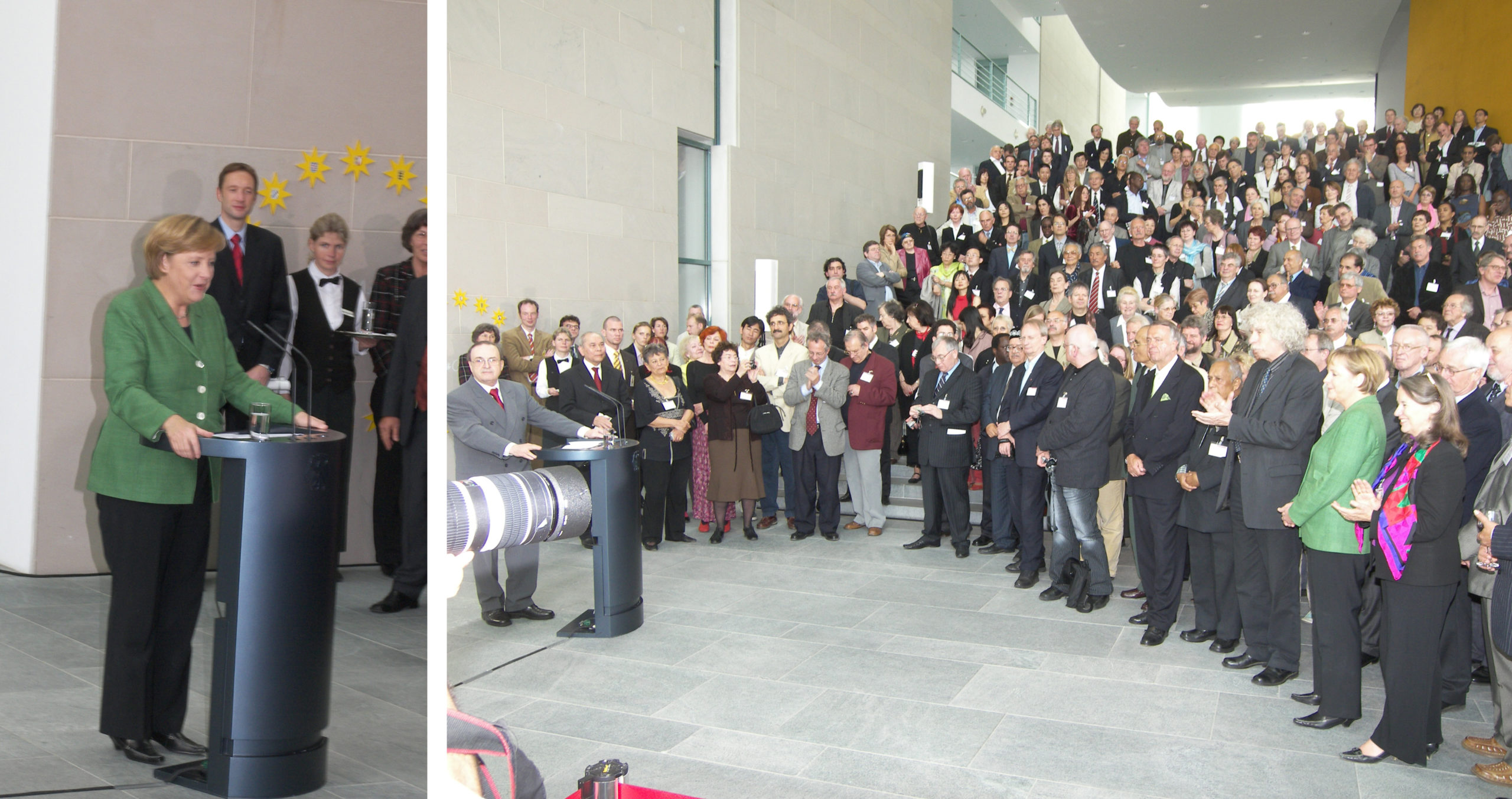
Left: German Chancellor Angela Merkel addressing PEN members at 72nd PEN Congress, 2006; Right: PEN International President Jiří Gruša speaking to PEN delegates and members at the Federal Chancellery; front row: German PEN President Johano Strasser, Chancellor Angela Merkel and PEN International Secretary Joanne Leedom-Ackerman. [Photo credit: Tran Vu]
September 14, 2020: PEN Journey 42: From Copenhagen to Dakar to Guadalajara and in Between
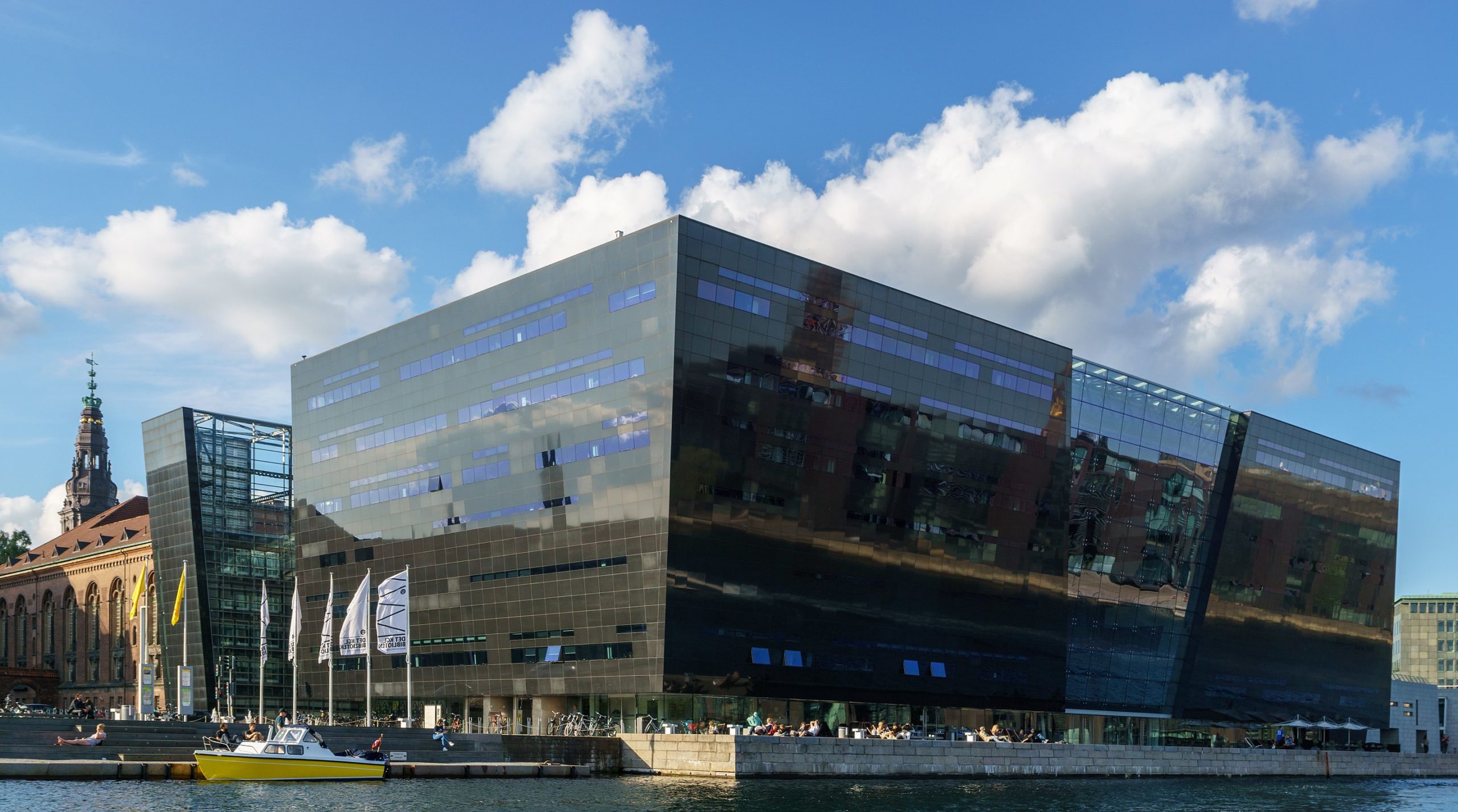
Royal Danish Library extension in Copenhagen, dubbed the Black Diamond (Photo by © User:Colin / Wikimedia Commons, CC BY-SA 4.0, https://commons.wikimedia.org/w/index.php?curid=66870365)
Arriving in Copenhagen in early September 2006, I walked along the waterfront, dodged bicycles and shared coffee and conversation with longtime colleague Niels Barfoed, former President of Danish PEN who had briefly succeeded me as Writers in Prison Chair and was an eminent Danish journalist and writer. We met at the new waterfront extension of the Royal Danish Library, dubbed the Black Diamond because of its imposing black granite cladding and irregular angles. Niels would be moderating a public meeting on Freedom of Expression in the Arab World.
PEN International’s base was broadening in the Middle East and in Africa, both regions where active centers for writers were fragile, but potentially important havens. Danish PEN was hosting a conference with a dozen writers from the Arab-speaking world, including representatives from Egypt, Morocco, Jordan, Palestinian PEN, Tunisia, Lebanon and invited writers from Iraq and the United Arab Emirates (UAE), along with Danish and Norwegian PEN members and International PEN represented by Centers Coordinator Peter Firkin and myself.
The Copenhagen conference had been initiated in part as a response to the Danish cartoons controversy earlier in the year and also as an opportunity to develop PEN’s work and presence in the Middle East. PEN had a few centers in the region and interest from writers in Jordan, Iraq, Kuwait, and Bahrain to form additional PEN centers and a desire to revive PEN Lebanon. Developing PEN centers in these areas was challenging given the politics and conflicts on the ground.
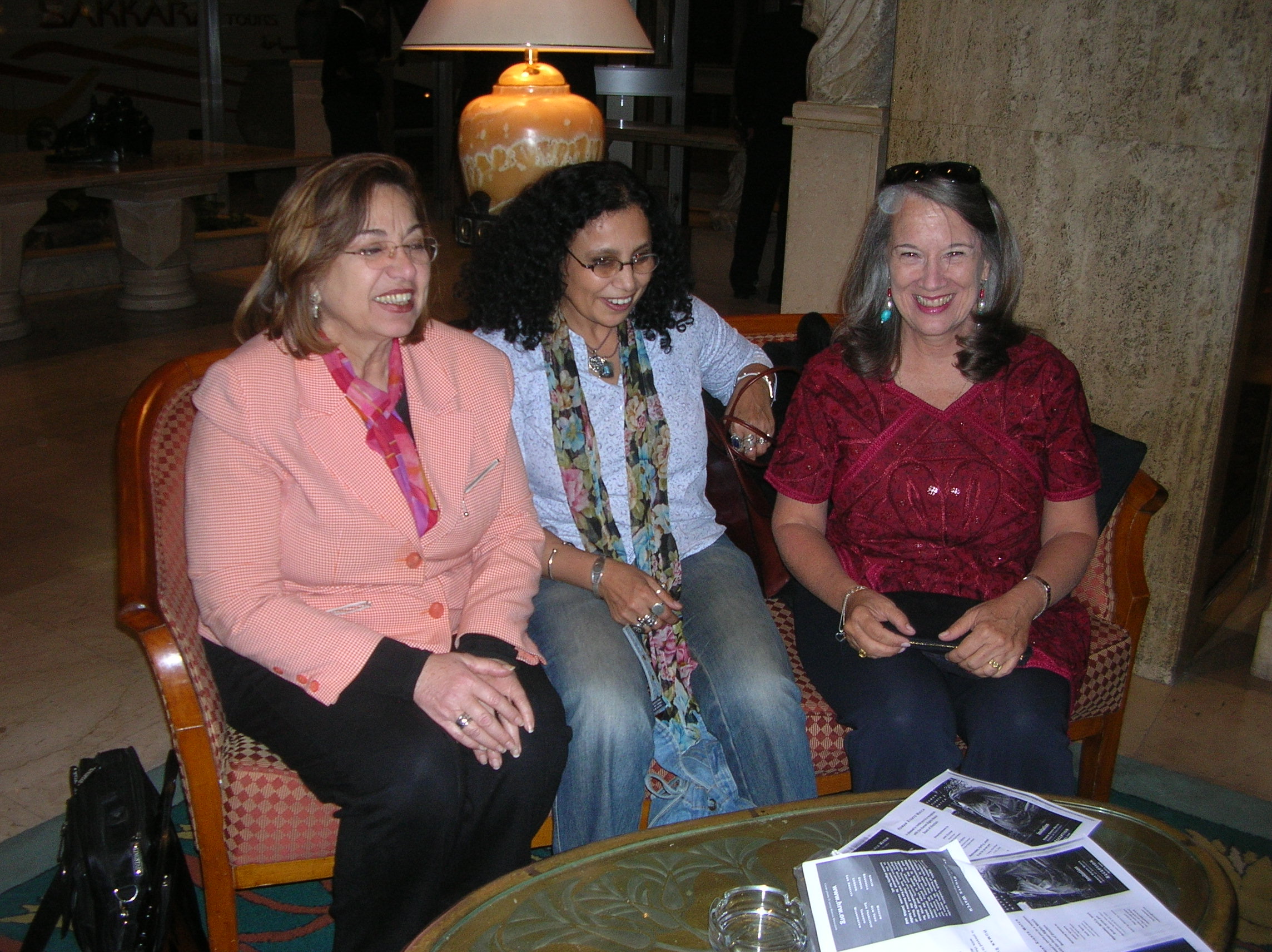
Ekbal Baraka, President Egyptian PEN (left) and Joanne Leedom-Ackerman, PEN International Secretary (right) meeting in Cairo, 2006
The Copenhagen meetings explored common fields of interest among Western and Arab writers, networking among Arab writers and ways in which PEN could assist. Women writers in the Arab world had particular challenges, a discussion led by Egyptian PEN President Ekbal Baraka. Ekbal later became Chair of PEN International’s Women Writers Committee. Algerian PEN and International PEN board member Mohamed Magani offered to host a subsequent meeting in Algiers the following fall, along with a conference on translation. A public event in the evening showcased the work of the visiting writers….[cont]
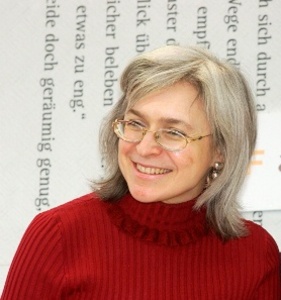
Anna Politkovskaya, Russian journalist assassinated, 2006
A few weeks after the Copenhagen conference, my phone rang early on Saturday morning October 7, 2006 at my home in Washington, DC. Sara Whyatt, PEN International’s Writers in Prison CommitteeDirector, was on the line. She called to tell me that Anna Politkovskaya, Russian journalist, PEN member who’d visited PEN Congresses and meetings, who’d worked for years reporting on Chechnya—had been assassinated. The report was that Anna had been shot that morning in the elevator of her apartment building in Moscow.
For seven years Anna had been one of the few reporting on the war in Chechnya despite intimidation and violence. She had been arrested by the Russian military and suffered a mock execution; she’d been poisoned while flying from Moscow to the Beslan school hostage crisis and had to turn back to get medical treatment. She had survived many dangerous encounters. But now she had been killed.
The killing of Anna Politkovskaya swept through the news media around the world as well as through the PEN world. We were stunned and deeply saddened and then began our protests and calls for investigation, along with human rights organizations worldwide. PEN honored Anna at its subsequent Congress and meetings and annually held an Anna Politkovskaya lecture on the anniversary of her death to commemorate her fortitude and inspiration.
The work in PEN was a helix of hope and pain and sorrow and hope again….[cont]
September 28, 2020: PEN Journey 43: Turkey and China—One Step Forward, Two Steps Backward
January 2007 began with an assassination. The Board of PEN International was just gathering in Vienna for the first meeting of the year when board member Eugene Schoulgin got a phone call letting him know that our colleague and his friend Turkish-Armenian editor Hrant Dink, had been gunned down in Istanbul and killed. Many of us had seen Hrant at the PEN Writers in Prison Committee conference in Istanbul in March.
Editor-in-chief of the bilingual Turkish-Armenian newspaper Agos, Dink had long advocated for reconciliation between Turks and Armenians and for Turkey’s recognition of the Armenian genocideearly in the century. Dink had received death threats before and had himself been prosecuted for “denigrating Turkishness,” but as with Russian colleague Anna Politkovskaya, Dink’s assassination stunned us all and set off widespread protests in Turkey and abroad. Eventually a 17-year old Turkish nationalist was arrested and convicted, but not before police were exposed posing and smiling with the killer in front of a Turkish flag.

PEN International Board Meeting, Vienna, January 2007. L to R: Joanne Leedom-Ackerman, International Secretary; Jiří Gruša, International President; Caroline McCormick, Executive Director; Judy Buckrich, Women Writers Committee Chair; Elizabeth Norgdren, Finish PEN; Eugene Schoulgin, Norwegian PEN; Franca Tiberto, Search Committee Chair; Sibila Petlevski, Croatian PEN; Britta Pedersen, International Treasurer; Eric Lax, PEN USA West; Mohamed Magani, Algerian PEN; Kata Kulavkova, Translation and Linguistic Rights Chair; Frank Geary, Programs; Karen Efford, Programs.
The work of PEN is, at its heart, personal. It is writers speaking up for and trying to protect other writers so that ideas can have the freedom to flow in society. In league with other human rights organizations, PEN also advocates to change systems that allow attacks and abuse. At times the work can feel ephemeral when the systems don’t change, or make progress only to regress. However, the individual writer abides, and PEN’s connection to the writer stands.
During my tenure working with PEN, Turkey and China have been the two countries that have imprisoned the most writers. For a period both nations appeared to be advancing towards more open societies but soon retreated. In the early 2000’s as Turkey aspired to join the European Union, the country operated as a democracy with a more independent judiciary; fewer writers became entangled in the judicial processes. However, in 2007 the democratic transition in Turkey began to veer off courseand has continued a downward spiral towards authoritarianism ever since.
China also promised to become a more open society with the advent of the Olympic Games in 2008. Democracy activists inside and outside of China grew hopeful. In this climate, PEN held an Asia and Pacific Regional Conference in Hong Kong in February 2007; it was PEN’s first in a Chinese-speaking area of the globe. Over 130 writers from 15 countries gathered, including writers from Hong Kong, Taiwan and Macao and many of PEN’s nine Chinese-oriented centers as well as members from Japan, Korea, Vietnam, Nepal, Australia, the Philippines, Europe, and North America.
Both China’s and Turkey’s Constitutions protected freedom of expression in theory, but in practice the protection was lacking. Instead, laws and regulations prohibited content. In Turkey, exceptions included criticism of Ataturk, expressions that threatened “unitary, secular, democratic and republican nature of the state” which in effect targeted issues around Kurds and Kurdish rights. In China, the Constitution noted that “in exercising their freedoms and rights, citizens may not infringe upon the interests of the State, of society or of the collective, or upon the lawful freedom and rights of other citizens.” The state was the arbiter….[cont]
One of the more creative campaign tools planned during the conference was spearheaded by a team of PEN Centers in Asia, Europe, North America and Australia. The members developed a digital relay with Chinese poet Shi Tao’s poem June. The poem tracked the path of the Olympic torch across a digital map. Shi Tao was serving a 10-year prison sentence for sharing with pro-democracy websites a government directive for Chinese media to downplay the 15th anniversary of the Tiananmen Square protests. His emails had been turned over to the Chinese government as evidence by Yahoo. His poem commemorated the Tiananmen Square massacre and was translated and read in the languages of PEN’s centers around the world, including in regional dialects as well as in the major languages. Ultimately 110 of PEN’s 145 centers participated and translated the poem into 100 languages, including Swahili, Igbo, Krio, Tsotsil, Mayan. The poem’s journey began on March 30, 2008 in Athens and traveled to every region on the online map, arriving in Hong Kong on May 2 and in June to Tibet where it was translated into Tibetan and the proposed Uyghur PEN center translated it into Uyghur. Finally August 6-8 it arrived in Beijing where it was translated and read in Mandarin. Anyone could click on the map and hear the poem in the language of the country designated.
By the 2008 Olympic Games 39 writers remained in prison in China.
June
By Shi Tao
My whole life
Will never get past ‘June’
June, when my heart died
When my poetry died
When my lover
Died in romance’s pool of blood
June, the scorching sun burns open my skin
Revealing the true nature of my wound
June, the fish swims out of the blood-red sea
Toward another place to hibernate
June, the earth shifts, the rivers fall silent
Piled up letters unable to be delivered dead.
(Translated by Chip Rolley)
Time of Repose and Preparing
It is a blustery August day on this fulcrum between summer and fall when the breeze stirs with a hint of the season ending. A pandemic stretching 18 months continues to unhinge life from what is considered normal, if there ever was normal. Life is far from normal in Afghanistan or Haiti right now. Normal is a relative term, residing perhaps in the hope for a measure of peace, for supply of basic needs and for the kindness of others.
This month I am again posting a retrospective of August blogs with a view of the last thirteen years’ history, a history which I read with nostalgia, recognizing those times are gone. It is difficult to imagine getting on a plane now to Tanzania or Kyrgyzstan or Macedonia with the same confidence of work to be done and the ability to meet those on the other end also engaging. The world may return as it was, though I’m not sure life ever returns as it was. But I hope it will transition to a world still connected and willing to connect and build with each other.
The geography of these posts range from Tanzania to Turkey to Qatar to France to Slovenia to Kyrgyzstan to Ghana to Macedonia and several in the United States. Readers can click on the date and title to read the full post. I am halfway through a year of posting these retrospectives and note that August is the first month where I’ve posted every year. I’m struck by the sultry beauty of this month between seasons, a time of repose and preparing.
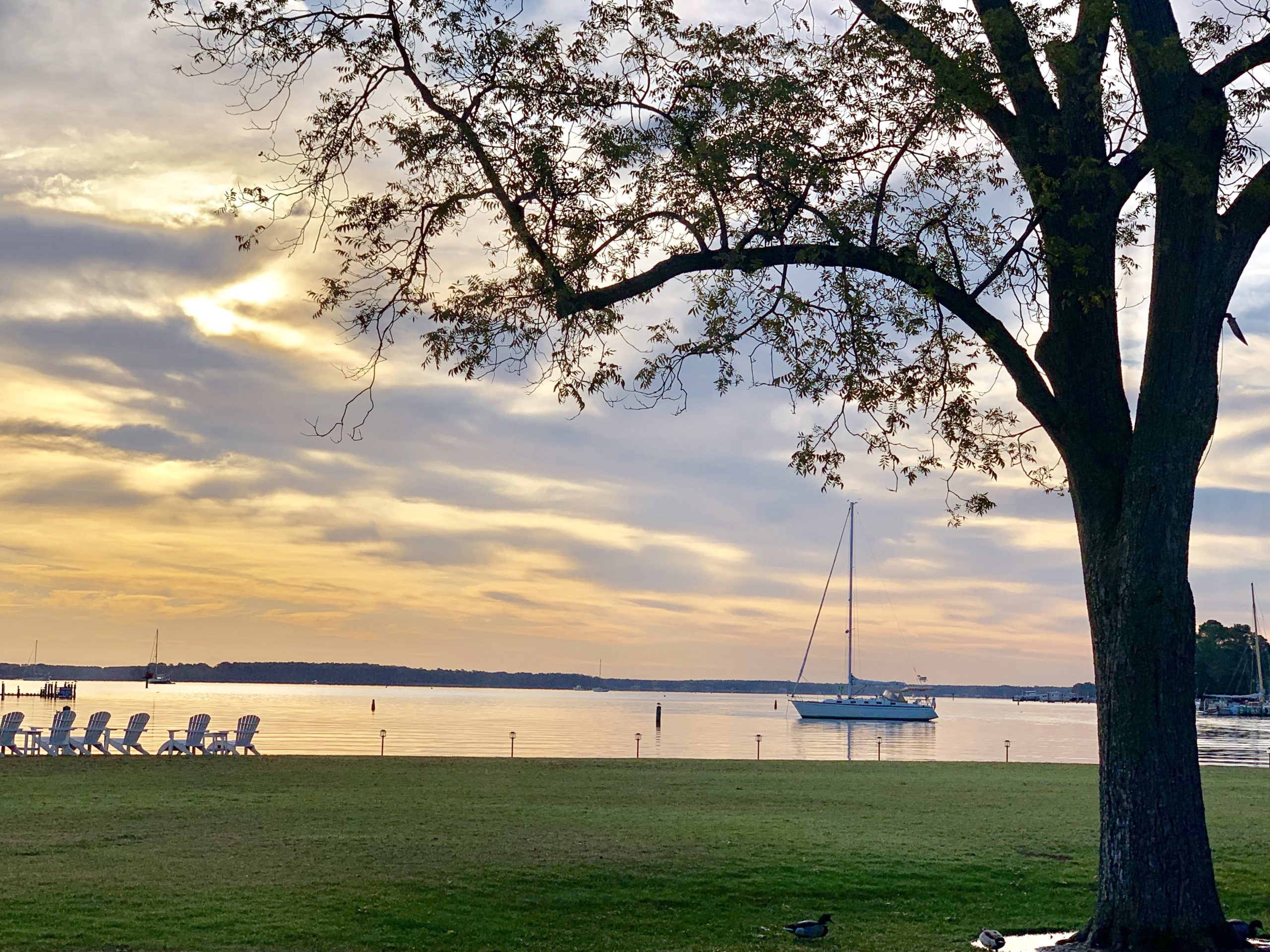
Photo credit: Joanne Leedom-Ackerman
August 31, 2008: From the Edge of the Indian Ocean
I’m sitting looking out at the Indian Ocean from the eastern edge of Africa in Dar es Salaam, Tanzania. It is Labor Day, at least in the U.S., though in the U.S. it is actually still Sunday night; but here it is morning with billowing white clouds, blue sky, palm trees, sun shining through—the end of winter in the Southern Hemisphere.
It took 17 hours of flying and a few hours of waiting in Amsterdam—roughly 20 hours to get here. When I arrived in the hotel room last night and the bellman turned on the TV, the BBC in a pulsating picture and sound was reporting on the approach of Hurricane Gustav to New Orleans and the interruption of the Republican National Convention. Was this important news in Tanzania? It was, in any case, the BBC news, and I was interested but couldn’t help but note how far one can go and still have America follow.
Outside the window in the hotel this morning, men are cutting the grass by swinging machetes across the lawn. From a distance it looks as if they are practicing their golf swings, but in the morning sun they are tending to the grass without lawn mowers or power tools.
In the following days here and in Uganda I’ll have the opportunity to visit schools and projects where educators and writers are responding to the shortage of books for children, particularly books with stories relevant to the children and books in local languages. This morning I’m aware of the stories we carry with us, the narrative in our heads wherever we go, the power of this narrative in shaping our lives and the importance of listening to the stories of others and opening up the narrative.
“Once upon a time in a place where the sun usually shines and the winds blow through the palm trees, there is a little girl who lives on the edge of the Indian Ocean, and every morning when she wakes up, she…”
August 31, 2009: Turkey Can Avert a Tragedy on the Tigris
It can develop energy and progress into the future without washing away the town of Hasankeyf, its jewel of the past.
From The Christian Science Monitor
Washington – In the southeastern corner of Turkey near its borders with Iraq and Syria, environmentalists, human rights organizations, and archaeologists recently won a battle in the effort to avert a cultural tragedy.
Swiss, German, and Austrian firms pulled out of their contract with the Turkish government to build a dam that would flood and destroy a historical ancient city, harm ecosystems downstream, and displace thousands.
To permanently protect this area though, it should be designated a UNESCO World Heritage site.
The Ilisu Dam, a cornerstone in a project to develop Turkey’s electrical and water capacities, is the largest and the most controversial of the 22 dams and 19 power plants scheduled in the $32 billion Southeast Anatolia Project.
At the heart of the controversy is the town of Hasankeyf, carved into the limestone cliffs above the Tigris River. Hasankeyf is reputed to be one of the oldest continuous settlements on earth, at least 10,000 years old, with relics found this summer that may date it to 15,000 years old.
In the Kurdish region of southeastern Anatolia, Hasankeyf has hosted at least nine civilizations, including the Assyrians, the Romans, the Byzantine Empire, the Mongols, and the Ottomans. On a central trading route in ancient Mesopotamia, Hasankeyf boasts more than 4,000 caves; 300 medieval monuments; 83 archaeological sites with ruins, including Hasankeyf Castle, built by the Byzantines in AD 363; and historic tombs and mosques. Its cultural and archaeological value is priceless.
Today the hillsides are dotted with artisans’ stalls, children on donkeys, and caves with restaurants inside.
If the Ilisu hydroelectric dam is constructed as planned 50 miles downstream, much of Hasankeyf – historic caves, ruins, and all – will be buried under 400 feet of water….[cont]
August 30, 2010: On the River: the End of Summer
Boats skimmed along the Potomac River this last weekend of August—power boats, yellow and red kayaks, boxy green canoes, sleek white sculls. I settled into the latter late Sunday afternoon, dropping oars into the warm water. Many in Washington are still out of town—on vacations or home visiting constituencies—but in their place are tourists exploring the nation’s capitol. The heart of the city beats on in festive cadence.
Baking in the summer sun, I eased leisurely down the river—past the Kennedy Center, the Watergate apartments, past the Georgetown waterfront where outside cafes were filled with people eating and bicyclists walking their bikes, past the new park along the river, then under Key Bridge, where a moment of shade brought relief. On the bridge above bikers and runners and cars crossed the river to and from Virginia. My scull sliced the surface of the water past the spires of Georgetown University, which peeked through the trees on the shore like a medieval fortress. I aimed out to the Three Sisters Islands, rowing with one oar to turn the scull then traversed the river, crossing the wakes of larger power boats so I could return on the opposite side, rowing past the nature preserve of Roosevelt Island towards the public boat house.
By the time I neared the home shore, sweat was dripping down my brow into my eyes, blurring my vision. The sun was slowly sinking in the sky, but relinquishing none of its heat. The boat house was already closing, and kayaks and canoes were pulled up on the dock; mine was one of the last sculls to return.
Summer is near its end. On Labor Day next weekend American flags will flutter beside the Potomac, and the political season with midterm elections will shift into high gear. But before the business of campaigns and politicians fill the air, summer may yet linger for just a bit longer like a temporary denouement before the pace of life accelerates. I take a moment here to savor the summer, which has been spent almost entirely in Washington—one of the hottest summers on record—a summer of writing, reading good books and welcoming into life a new grandchild. It has been a summer of quiet pleasures and great moments.
August 27, 2011: Before the Earthquake and Hurricane: Summer Music in the Afternoon
The air is surprisingly cool for late August. I’m sitting on an upstairs porch looking out over the tops of trees in their full dress of summer greens—maples, magnolias, dogwoods with white blossoms. The branches and leaves sway and rustle in the breeze. Somewhere a wind chime answers the moving air with a light ting and ringing like a message in the near distance, signaling the change of seasons. Overhead, shifting faces of white clouds drift through a blue sky, sliced by faint streaks from the trail of a jet that has long since passed by.
In this moment before evening, before the shift in seasons and the rush of autumn, I can almost hear the earth singing. Harmonizing with the wind chimes are thousands of crickets exploding with sound then quieting and birds sweeping through the sky calling to each other. The rustle of the trees, the call of the birds, the chirping of the crickets, the swoosh of the breeze are like nature’s symphony–an unexpected summer moment on this quiet August afternoon.
I sit high enough off the ground to see the sunlight golden on the tree tops and also to see the trees dark green, almost black, where the sun has left and the afternoon shadows have spread. I look down on the roses in a neighbor’s garden and look out on the brick chimneys of other neighbors’ houses.
I’m aware of the different voices of nature around me, each communicating its renditions of life, none of them taking notice of who will run for President of the United States, or who will emerge in power in Libya and Syria, or how the markets will close.
A flock of birds suddenly swoops past talking loudly to each other. What do they see and say and know?
[This post was written late afternoon Aug. 22. At 1:50pm on Aug. 23 Washington, DC shook as a result of an unusual 5.9 earthquake. As I edit this, we await the arrival of Hurricane Irene, characterized as a once-in-a-lifetime hurricane. The locusts, we hope, will pass us by.]
August 30, 2012: Diplomacy on a Summer Evening
It is a sultry evening at the end of summer in Washington, a backyard party on a patio with picnic tables on the deck, red Christmas lights strung across the porch and the night filled with animated conversation among ten Pakistani journalists and their American friends and hosts.
The journalists are soon returning to Lahore, Karachi, Balochistan, Islamabad and other cities and provinces in Pakistan. For the last month they have been working in newsrooms across America. Most are here for the first time, witnessing and learning about American culture and sharing their own culture and experience. They have worked from Tallahassee to Tucson to Los Angeles, from Washington, DC and Baltimore to Providence and Pittsburg; one journalist reported from Minnesota. They have covered American elections, crime, state politics, the judiciary, education and economics.
The Pakistani journalists have also met with the communities, including addressing hundreds of members of the Rotary Club in Tallahassee and having a one on one discussion with a Catholic bishop about abortion.
In their month they all agreed their misperceptions of America were changed.
–I thought Americans would be rude, said one and others agreed that that was their preconception. Instead they were friendly and helpful everywhere.
–They were very friendly, said another, but in Minnesota, they had little knowledge of Pakistan and held some myths.
–When people think of Pakistan here, they think only of terrorism. That was the general misperception.
–I saw how hard Americans worked. I always thought Pakistani journalists were energetic, but an American newsroom—that is energetic!
–I lived with the executive editor, and we were in the newsroom by 7am.
–I was impressed by the huge facilities in American newsrooms. The journalists are very professional. But I come away very proud of my fellow Pakistani journalists who work in much worse conditions.
–I was surprised that 50% of the staff was women. I even had a woman driving me.
The International Center for Journalists will bring 160 Pakistani journalists to work and live in the United States, and has sponsored American journalists into Pakistani newsrooms.
As we shared chicken tandori and lamb sausages and curries and rice in the fading summer light, the guests all agreed that this type of professional exchange opened and advanced relations between people in a way that politicians can’t or don’t.
–I covered the Governor and State legislature, said one reporter. The Governor was lobbying for his bills, especially to get his bill passed on gambling. It was just like Pakistan!
August 21, 2013: Peacocks and Politics
I’ve spent much of the summer on the Eastern shore of Maryland on a river, writing and listening to the quiet lapping of the water against the stones of the river bank, except when jet skis whish by and when the peacocks next door caw and caw at the neighbor’s farm. The peacocks call to each other all day long, broken by a rooster’s cock-a-doodle-do…actually the rooster is yodeling now, though I don’t know what he’s heralding in the middle of the afternoon.
The peacocks wander over from time to time, running across our yard like stealthy children hiding from their parents. I don’t know what prompts their visits. They usually leave a mess, but their brilliant feathers swishing by always surprise and astonish me.
Today as I was moving to a table outside to write this blog, I discovered one of the females nesting, hidden in a bush outside the house and, I believe, hatching a brood of eggs. I don’t know when she arrived, but she lay there motionless as though she had gone into a deep sleep, moving not at all as she protected her eggs. I’m not sure how long gestation is for peacocks, but soon we will be host to baby peacocks! Since the birds wander from farm to farm, no one claims ownership, certainly not me, but suddenly I feel a responsibility, for exactly what, I can’t say, at least a responsibility to give the mother the peace and quiet she has sought by escaping here, away from the other peacocks and roosters. Occasionally we have a dog visit on the weekend so my first responsibility is to make sure the dog doesn’t find the peacock….[cont]
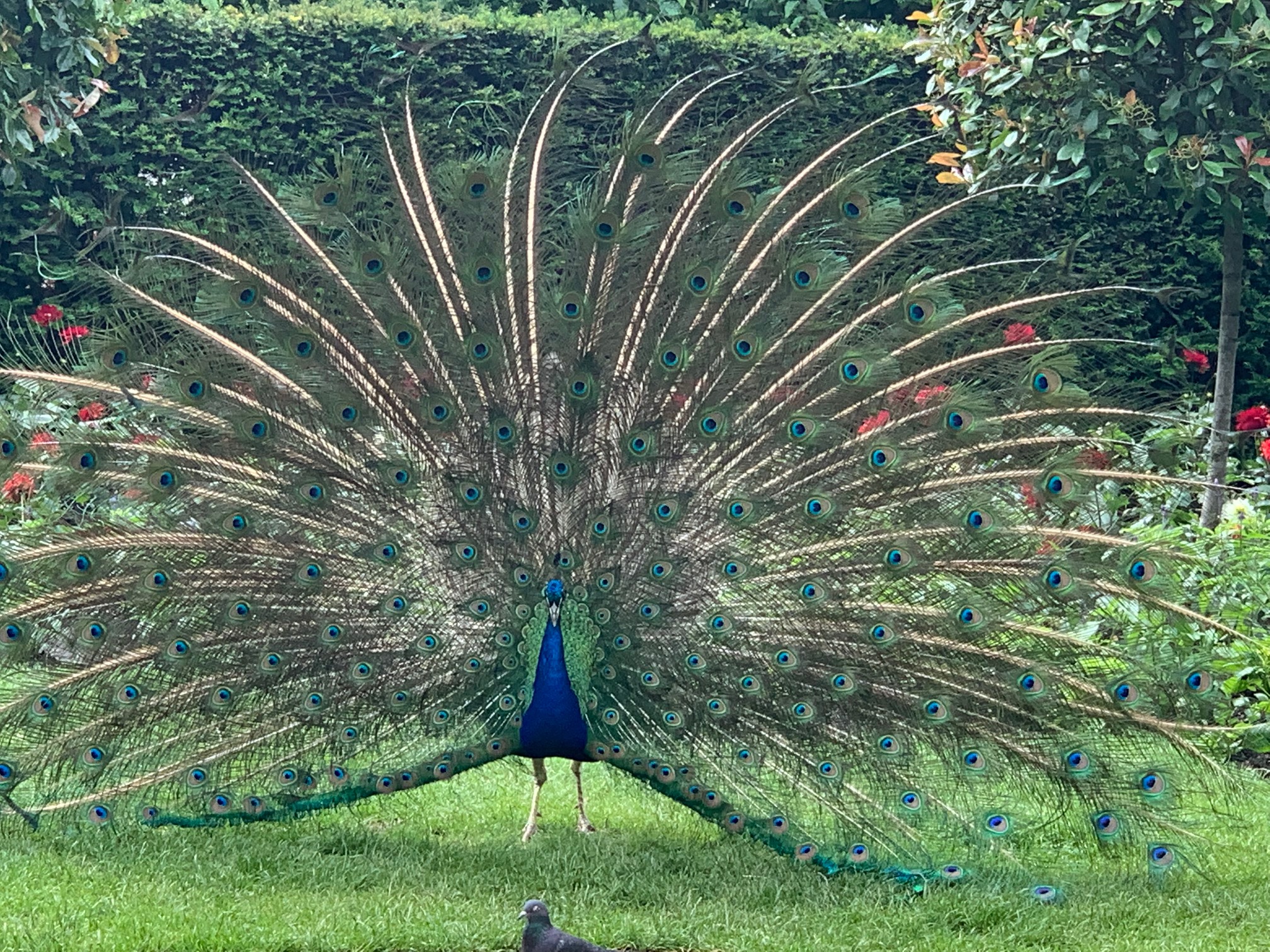
August 2, 2014: Poets, Pardons and Ramadan
(This piece appears on GlobalPost.)
Eid—the end of Ramadan—has come and gone. Traditional pardons have been handed out. In Qatar, poet Mohammed al Ajami (Al-Dheeb), was not among them. He continues to live in a prison in the desert, serving a 15-year sentence for two poems, one praising the Arab Spring and the other critical of the Emir. He (and his poems) “encouraged an attempt to overthrow the regime,” according to the charges.
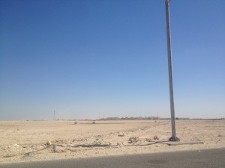
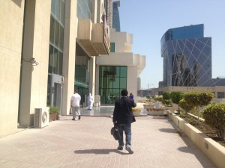
The over 70 pardons granted in Qatar are reported to have gone to Asian workers charged with theft, rape, drug abuse, bribery, prostitution, etc. These workers will now likely be deported. If Mohammed al Ajami were released, he would also likely leave the country to reunite with his family and then perhaps accept a brief fellowship offered as a poet at a major university.
Throughout the Muslim world Ramadan is a time when dispensations are handed out— as many as 1000 prisoners reportedly released in Saudi Arabia, 800 plus in Dubai, over 350 in Egypt— to individuals charged with violent and nonviolent crimes. But the amnesties were not given to writers, not to poet al Ajami, not to Egyptian journalists or Iranian bloggers. The offense of words and ideas are perhaps judged more dangerous.
Writers in prison in the Middle East who did not get pardons include: Bahrain (3writers), Egypt (5 writers), Iran (35 writers), Qatar (1 writer), Saudi Arabia (2 writers), Syria (11 writers), Tunisia (1 writer), United Arab Emirates (2 writers). *
August 27, 2015: “What to Read Now: War Narratives”
From the September/October 2015 issue of World Literature Today
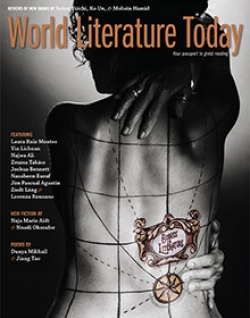
While the US-led wars in Afghanistan and Iraq have been going on for fourteen years, much of American literature from these conflicts is only now emerging. I appreciate the veterans who’ve woven the simultaneously “worst and best days of their lives” into literature. They have turned to all forms to find their truth—poetry, short stories, memoir and the novel. (Disclosure: I’m the mother of a Marine who served in both conflicts and is now one of the novelists listed here.)
I have framed these suggested readings with a history from the Great War a hundred years ago and with a diary of one of the long-serving detainees in Guantánamo. Truth in literature is determined in part by point of view. In these books, the reader can take a journey from many perspectives.
Margaret MacMillan
The War That Ended Peace
Random House
In this nonfiction book, Margaret MacMillan narrates history through the lives of those responsible for World War I. The characters and cousins could populate a fiction collection with their dramas, imaginations and absurdities. MacMillan offers an inside view, revealing the people and stories behind the politics and events that led to a war many feel—and felt at the time—shouldn’t have happened.
Brian Turner
My Life as a Foreign Country: A Memoir
W.W. Norton
The author writes of his deployment as an Army sergeant, beginning in the US learning to identify body parts, watching combat on television, and then arriving in Iraq and facing real combat in the first Stryker brigade. “We rode on a war elephant made of steel,” he writes of the nineteen-ton tank. A poet (Here, Bullet), Turner narrates his experiences and his return home in a poet’s language, which spins the harshest circumstances—the soggy, trodden straw—into gold and art.
Phil Klay
Redeployment
Penguin Press
A veteran of the US Marine Corps assembles a dozen short stories and first person narrators—soldiers on the front lines, in the rear, at desks, with their family, friends, wives and girlfriends back home. The narrators’ voices are witty, unflinching, nostalgic, and the stories make the reader laugh, cry and wonder how a generation honed on this conflict will return to life as it was.
Elliot Ackerman
Green on Blue
Scribner
This novel narrates the war in Afghanistan from the point of view of an Afghan orphan who gets caught up on the American side of the conflict in order to keep his brother alive. He quickly learns that the war has too many sides and so many points of view that truth shimmers only in the eyes of the beholder.
Mohamedou Ould Slahi (Larry Siems, ed.)
Guantánamo Diary
Little Brown
Guantánamo Diary tells the story of the “war on terror” from the point of view of one who has been detained, tortured, and continues to proclaim his innocence. With a literary and humane voice, Slahi, edited beautifully by Siems and redacted by a censor, renders the horror and humanity in this war that will not end.
August 11, 2016: Sounds of Summer
(This is not a poem)
August on the Eastern shore
Quiet on the river
Birds chirruping in the trees
Crickets—or are they cicadas—clicking in the afternoon, clicking that will build to a crescendo in the evening
CaCaCa of peacocks next door
Water trickling, flowing slowly out to the bay
A power boat whishing by, heading to the open water
A leaf blower, a lawn mower in the distance, jarring the quiet
Leaves rustling in the breeze
Breeze skimming the trees, rustling, rushing louder now, emboldened
More birds chirping, the beginning of a larger conversation
At the very top of a tree at the river’s edge a black bird keeps watch, looking first out to sea then to land, then trips lightly along the branches, lets out a caw and flies away.

 I sit here, listening to all these sounds of late summer.
I sit here, listening to all these sounds of late summer.
Soon the children will come home from camp, run outside, filled with their day—karate lessons, swimming, new friends—but for now in the quiet, I am “happy in my circle of oblivion,” to borrow a phrase from Garcia Márquez, whom I’m reading on this rare, undisturbed afternoon.
The news—the sturm and drang of presidential politics, the daily offenses—are outside this space on the river. For a brief moment the troubles of the world seem held at bay. Even the trials and triumphs of the Olympics must await the evening news.
I watch three billowing white clouds drift by ever so slowly in the blue sky.
As the breeze picks up, the trees rustle, continuing a conversation, stirring first one tree then another, passing along the wind’s gossip down the river bank.
If this light wind holds, it will be good kite-flying weather in the evening. We can have another picnic by the river with grandfather sitting in the Adirondack chair and everyone else on the grass—hot dogs, hamburgers, corn, applesauce, kite in the air, children running, laughing.
The parade of clouds drifts by overhead now like characters in the children’s play they plan for the grownups. “One, two, three…look at me!” The black dog passes all dressed up to play a part in the drama as he looks for scraps from dinner. The shapes of the clouds pass and just blue sky shines overhead. We will end the evening with S’mores at the fire pit as the moon rises over the river.
There are only three more weeks of summer—more books to read, stories to write, laps to swim, thoughts to think before the demands of schedules and meetings and deadlines crowd in.
For this moment I am grateful for the silence, the breeze, the birds, the river, the shining sky, the billowing clouds and the promise of this afternoon that I will carry with me.
August 14, 2017: The Beginning of Violence
In the wake of events in Charlottesville, Virginia last weekend, I wanted to share my short story “The Beginning of Violence” set at the first sit-in in Nashville, TN in 1960, published in No Marble Angels and republished in Short Stories of the Civil Rights Movement: An Anthology (ed. Margaret Earley Whitt, University of Georgia Press, 2006.). The anthology includes 23 short stories by black and white writers—stories of the heart, not just politics—an historic journey worth embarkation.
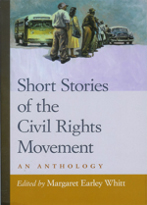
THE BEGINNING OF VIOLENCE
by Joanne Leedom-Ackerman
Nashville, 1960
The wind shot through you that day like fate or some might say like the will of God. No matter what you did, it got you. It weaseled under the buttons of your coat, pulled off your scarf. You couldn’t fight against it though you could stay indoors, but once you came out, you had to face the wind and find your way.
It was the day before Valentine’s, and snow was falling in thick wet flakes, had been since early morning and threatened to keep on all afternoon. As I said, it was not a day to be outside, but I was. I was downtown on the arcade doing last minute shopping for a sorority party that night. We’d been decorating all morning, but we’d run out of crepe paper and balloons; and Janie, the food chairman, was afraid she’d run out of paper plates and cups so I said I’d go downtown and pick up everything.
I went to Woolworth’s. At the Grand Ole Opry counter I bought a red plastic guitar set inside a big red plastic heart for the centerpiece on the officer’s table. I was an officer. I was treasurer of the Kappa Alpha Thetas at Vanderbilt University.
I didn’t feel like turning right around and going back into the cold so I stopped at the lunch counter for coffee and a grilled cheese sandwich. I was sitting there eating and reading “When Lilacs Last in the Door-Yard Bloom’d” for English class when a blast of air swept across my back. When I turned to see who was holding the door open, I saw dozens of Negroes coming into the store.
They moved straight down the aisles then disappeared among the cheap jewelry and face powders and school supplies.
I turned back around and finished my sandwich and Whitman’s poem. I was about to pay and leave when three Negroes sat down at the counter, one of them next to me. They all held brown paper bags with purchases they’d made. The girl beside me smiled, showing a curve of white teeth and asking more than most people thought she had a right to ask. I looked over my shoulder and saw thirty or forty more Negroes lining up to sit at the counter.
It took me a minute to understand what was happening. I’d grown up in Arkansas and Tennessee, and in nineteen years I’d never eaten beside a Negro. I’d never sat next to one on a bus or gone to the same bathroom. Things were changing in the South, but these were facts I’d lived with. Once in high school in Little Rock I’d signed a petition favoring integration, and that had almost gotten me thrown out of cheerleading. Some people thought anyone for the Negro was a Communist. I wasn’t a Communist; I just thought the Negro should have a chance. And yet even feeling that way, I wasn’t prepared to have the order of things put to question right where I was sitting.
The girl kept smiling. She had a soft mouth and big, dark eyes. Her hair was straightened, and she wore it like mine, in a pageboy with bangs. She was taller than me, and under her coat she looked strong. When she saw my poetry book on the counter, she reached into her pocket and took out a copy of the same book. I couldn’t help but feel she’d just drawn her gun…[cont]
August 3, 2018: Peace: Fabric with a Million Threads
Earlier this summer I had the opportunity to moderate a panel of high school teachers at the United States Institute of Peace called “A Year in the Life of a Peace Teacher.”
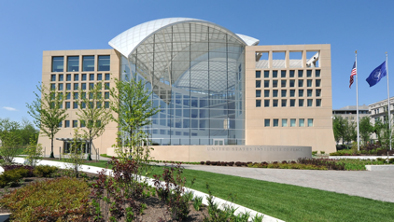
United States Institute of Peace in Washington, DC
On that morning of July 10 two positive news events broke: the final young soccer players and their coach, who had been trapped for almost two weeks, made it out of the caves in Thailand. And Liu Xia, wife of Liu Xiaobo, the Chinese Nobel Peace Laureate who died last year in custody, landed in Europe, released after a decade of virtual house arrest in China.
For me these events connected to the panel on the teaching of peace-building.
Was peace possible? Could peace be “built”? The answer we concluded that morning with cautious optimism was: Yes.
The miraculous rescue of the soccer team resulted because highly skilled citizens from nations around the world, including the U.S., Australia, Denmark, Britain, China and most importantly Thailand came together and exerted their best efforts with a common goal everyone agreed on.
Freedom for Liu Xia resulted in large part because citizens and politicians around the world spoke up and advocated on her behalf though a similar effort had not won the release of her husband.
That morning, listening to the teachers and their work with students reinforced a view that peace was not just building bridges between two opposing pylons or signing treaties, but was the weaving of hundreds, thousands, millions of threads, of each citizen taking responsibility within his/her own community.
Each year the U.S. Institute of Peace, founded in 1984 as a nonpartisan Institute to promote peace and resolution of conflicts around the world, also focuses on the U.S. and selects four high school teachers for year-long training which they take into their classrooms. They work on problem-solving and peace-building in their communities and also study global peace opportunities.
This year’s teachers from Missouri, Montana, Florida and Oklahoma shared ways they and their students ignited discussion in their classrooms and in their communities and then took initiatives relating to issues of race, immigration, etc. They emphasized the understanding that peace didn’t mean avoiding conflict but rather finding ways to engage nonviolently and then to find ways to resolve conflicts by listening, determining the interests of the other, showing empathy.
Specific stories of the teachers and their journeys with their students can be heard on this link.
To conclude the panel it was appropriate to quote Nobel Peace Laureate Liu Xiaobo. In his career and in his final statement to the court before he was sentenced to 11 years in prison for his writing and work towards democracy, he told the judge: “I have no enemies and no hatred.” In his life Liu explained that to build a society without hate, one had to begin with one’s self. After he died in custody last year, many questioned whether he would have claimed this had he known his end, but those who knew him well said he would have because he believed the responsibility for a peaceful and fair society began with oneself.
Hatred only eats away at a person’s intelligence and conscience, and an enemy mentality can poison the spirit of an entire people… It can lead to cruel and lethal internecine combat, it can destroy tolerance and human feeling within a society, and can block the progress of a nation toward freedom and democracy. For these reasons I hope that I can rise above my personal fate and contribute to the progress of our country and to changes in our society. I hope that I can answer the regime’s enmity with utmost benevolence, and can use love to dissipate hate.
It was poignant and fitting that day to see Liu Xiaobo’s wife Liu Xia’s smile as she landed in Helsinki.
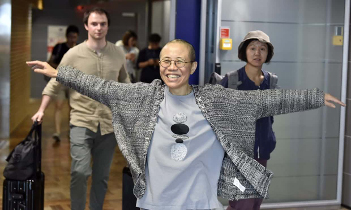
August 2019: [Beginning in May 2019 I started writing a retrospective of work with PEN International for its Centenary so posts were more frequent in 2019-2020. In August 2019 there is one post in the PEN Journeys and in August 2020 there are three.]
August 1, 2019: PEN Journey 7: PEN in Times of War and Women on the Move
Iraq invaded Kuwait August 2, 1990. When I picked up my 10-year-old son from camp in the U.S. that summer and told him what had happened, his first response was: What about Talal and Alec? These were two of his good friends at the American School in London—one was son of the Kuwaiti Ambassador; the other was from Iraq. He quickly understood the consequences. Fortunately, both of his friends had been out of their countries at the time, though I don’t recall Alec returning to the American School that fall. When the bombs dropped on Baghdad in January, the American School went into lockdown. The older students were issued identity cards. The security force around the school multiplied. When Talal came over to play that winter, he was accompanied by two imposing bodyguards who stayed outside.
Though the fighting in Iraq concluded by the end of February, security in London continued. By the end of March, the war in the Balkans had begun. Both wars brought to a close the honeymoon many felt after the fall of the Berlin Wall.
For PEN, the outbreak of war in Iraq and in the Balkans led to the cancellation of the planned Delphi Congress and to the convening of conferences in Europe and a two-day gathering of PEN’s Assembly of Delegates and international committees in Paris in April 1991. Delegates from 39 PEN centers came together to conduct the business of PEN at the Société des Gens de Lettres de France which occupied the 18th-century neoclassical Hôtel de Massa on rue de Faubourg-Saint-Jacques in the 14th arrondissement of Paris. There were no literary sessions or social gatherings, or the usual simultaneous translation of proceedings. The business was conducted primarily in English with intermittent French, the two official languages of PEN. (Spanish was added a few years later as PEN’s third official language.)
The Gulf War, the ethnic conflict in the Balkans, the aftermath of the Tiananmen Square trials and the ongoing fatwa against Salman Rushdie predominated discussions in Paris and later in November at the 56th PEN Congress in Vienna. The Gulf War had resulted in increased numbers of writers imprisoned and killed in the Middle East and an increase in censorship. Resolutions condemning the detention and imprisonment of writers in Saudi Arabia, Syria, Israel and Turkey passed the Paris Assembly. Little information was available from Iraq. Another resolution in Paris sponsored by the two American centers expressed concern to the U.S. government and all U.N. member states over the restrictions placed on journalists during the war and urged a review of the ground rules for journalists in conflicts….[cont]
August 5, 2020: PEN Journey 37: Bled: The Tower of Babel—Part Two
At PEN’s 71st World Congress in June 2005 over 275 writers from 88 PEN Centers gathered from around the world in the idyllic setting of Bled, Slovenia where history had been made 40 years before. In 1965, PEN had held its Congress in Bled, the first in Eastern Europe since the Second World War. Russian writers visited PEN for the first time. At that 33rd World Congress, American playwright Arthur Miller, who’d recently passed away in 2005, had been elected the first and only American President of International PEN.
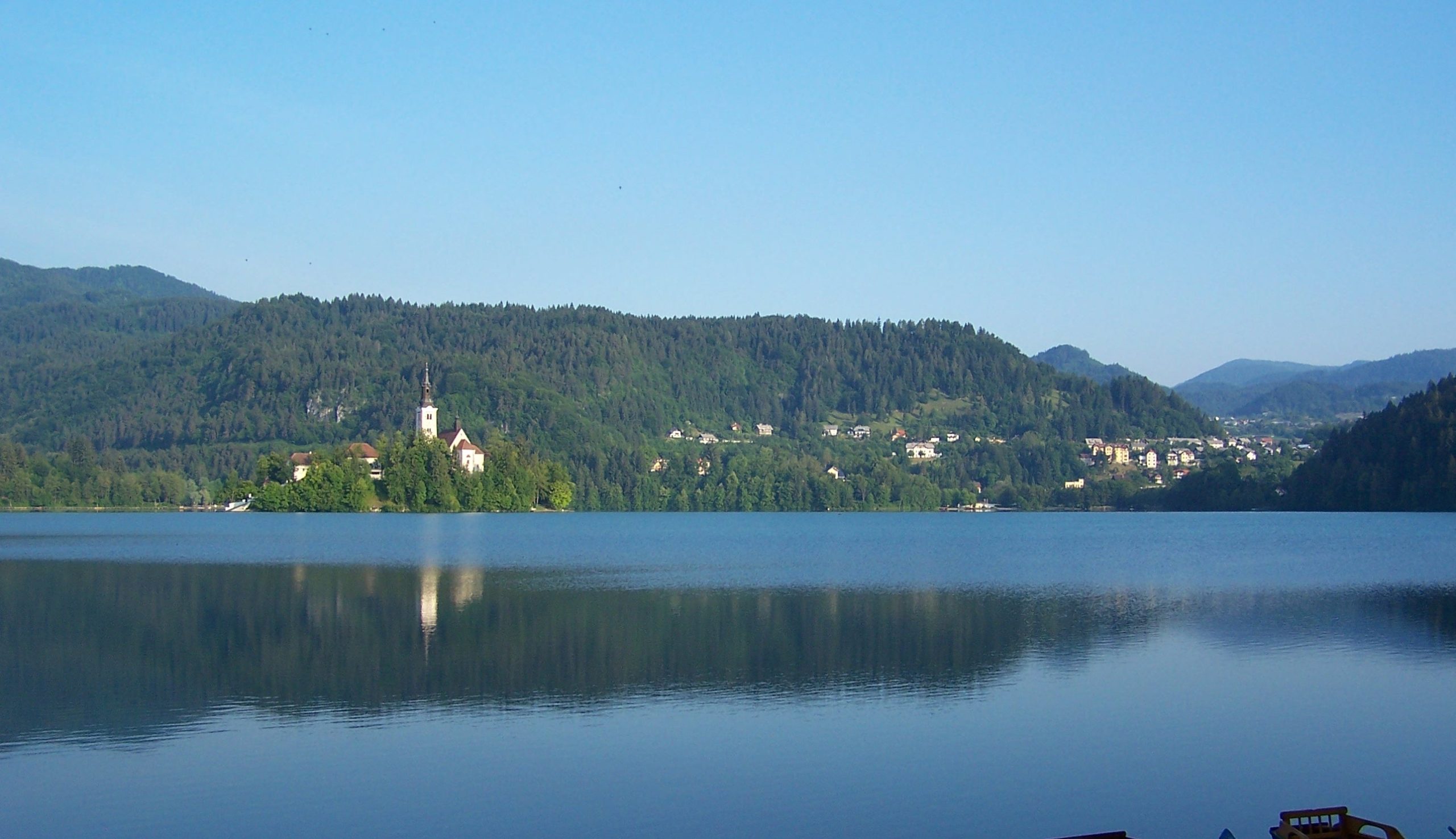
Lake Bled in Bled, Slovenia, site of PEN International’s 71st World Congress, 2005
In 2005 the global dynamics had changed. PEN now had active centers in most of the countries in the former Communist Eastern bloc, including in Russia. The European Union (EU) was in its ascendancy; 2005 marked Slovenia’s accession into the EU. Globalization was bringing benefits but also threats to the cultures of smaller countries.
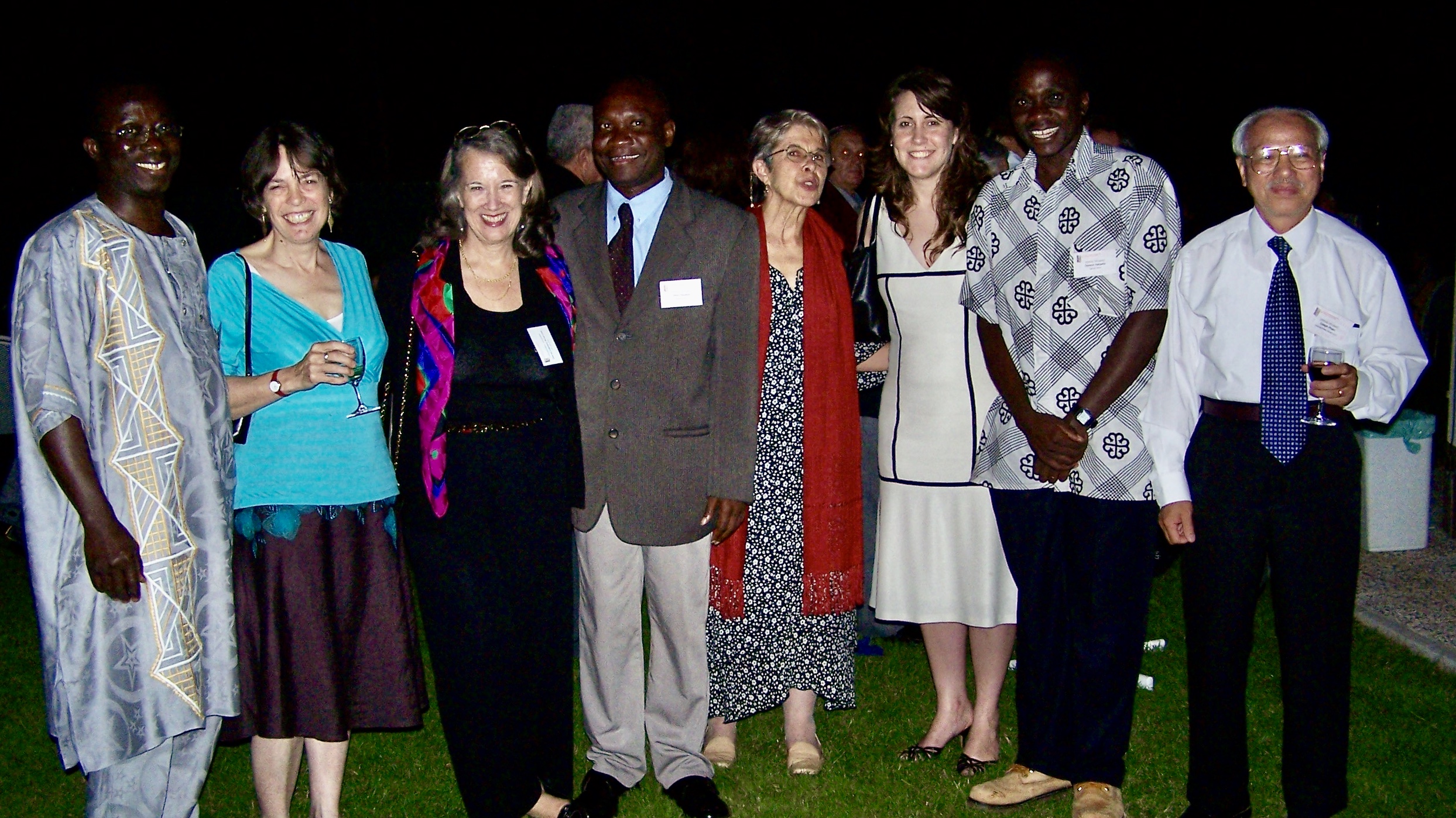
Reception 71st PEN Congress in Bled, 2005. L to R: Frank Asare Donkoh (Ghana PEN), Jane Spender (Program Director PEN International), Joanne Leedom-Ackerman, (PEN International Secretary), Alfred Msadala (Malawi PEN), Cecilia Balcazar (Colombian PEN), Caroline McCormick Whitaker (PEN Executive Director), Dan Khayana (Uganda PEN), Bao Viet Nguyen-Hoang (Suisse Romand PEN) [Photo credit for many photos: Tran Vu]
“We live in an age when many preconceived ideas, nurtured for centuries and ostensibly immutable, are no longer valid,” noted Slovene PEN President Tone Peršak. “The linguistic and cultural image of the world is in flux and civilization as a whole, under the influence of globalization, is taking on a new character. These events are also echoed in discussions within PEN centers…They guided us in our selection of the main topic for discussion at the Congress, namely the issue of linguistic and consequently cultural diversity of the world. The topic is proposed as a question: does linguistic diversity stimulate or hinder cultural development? Is it a curse or a blessing that made possible the emergence and encounter of various world views, different emotional responses to the human destiny, and finally also brought about the formulation of different schools of thought and philosophical doctrines?
“We regard the question of linguistic and cultural diversity also as a human rights issue. Attempts to unify and subject all aspects of life to uniform standards and norms is viewed as a very questionable encroachment on these rights. One of the topics is therefore the question of the need to protect languages and cultures, and that means also the smallest ones which may be on the verge of extinction. Let us also draw your attention to literature’s role in the preservation of the memory of the cultural landscape, which has been undergoing considerable changes and in some cases may even disappear forever…[Is] literature a kind of lingua franca which could and should contribute to a better mutual understanding and insight into the different cultures and nations that sustain cultural diversity?…”[cont]
August 14, 2020: PEN Journey 38: PEN’s Work On the Road in Kyrgyzstan and Ghana
There have been a number of conferences and a few Congresses in PEN I’ve regretted not being able to attend. One was the Women’s Committee conference June 2005 in Bishkek, Kyrgyzstan right after the 71st Bled Congress. As International Secretary, I have notes and reports from that conference. Nine years later in the fall of 2014, PEN held its 80th World Congress in Bishkek, a Congress I did attend. The Women Writers Committee led the way for International PEN into Central Asia. Later in 2005 members of the Women Writers Committee also met at the International PEN conference in Ghana which I did attend.

Bishkek, Kyrgyzstan, site of PEN International’s Women Writers Meeting in June 2005 and Accra, Ghana, site of PEN International’s African conference and also meeting of African women writers, November 2005.
First, Bishkek: The President of Bishkek PEN Vera Tokombaeva was concerned about the circumstances of writers in Central Asia since the breakup of the Soviet Union. She suggested to the new Women Writers Committee (IPWWC) chair Judith Buckrich that PEN hold a women writers meeting in Bishkek. Many of the institutions which had enabled writers to publish had vanished, and the status of women in the region had grown worse. Young writers from Kyrgyzstan, Kazakhstan, Uzbekistan and Tajikistan who were members of the PEN center were troubled by the decrease in the number of women working creatively. Only a handful were left.

PEN Women Writers Committee Chair Dr. Judith Buckrich and International PEN Board member Judith Rodriguez (Melbourne PEN)
Bishkek PEN did a study highlighting the problem. Central Asian women writers were struggling with poverty, it said, and literature was no longer published unless self-published with limited distribution.
“Women writers are now mostly on their own. They have fallen into a cultural vacuum,” the conference proposal noted. “They are not in contact with colleagues outside their own country and know nothing of the state of culture in the world. In the meantime the global community has begun to pay attention to Central Asia because its difficult geopolitical situation could lead to the rise of violent, ultra-religious and fundamentalist ideologies into the area. And it is partly the lack of modern local literature that makes the region a breeding ground where alien ideologies can take root among young people. Flourishing modern literature could be the means to disseminate democratic ideas and social awareness….”[cont]
August 31, 2020: PEN Journey 39: Spiritus Loci—Literature as Home
[From address at Translation and Linguistic Rights Committee Conference September, 2006:]
I Left My Shoes in Macedonia.
Last year at this conference, I packed in a rush, left behind a pair of shoes, but in the process got a title for a story.
I Left My Shoes in Macedonia.
I don’t yet know what story will emerge, or maybe only this brief talk will emerge, but Macedonia makes the title work, at least to my mind. I Left My Shoes in England…that doesn’t work…I Left My Shoes in France?…No. I Left My Shoes in the United States…please. I look forward to discovering who left the shoes and what the circumstances were and most of all what Macedonia has to do with the story.
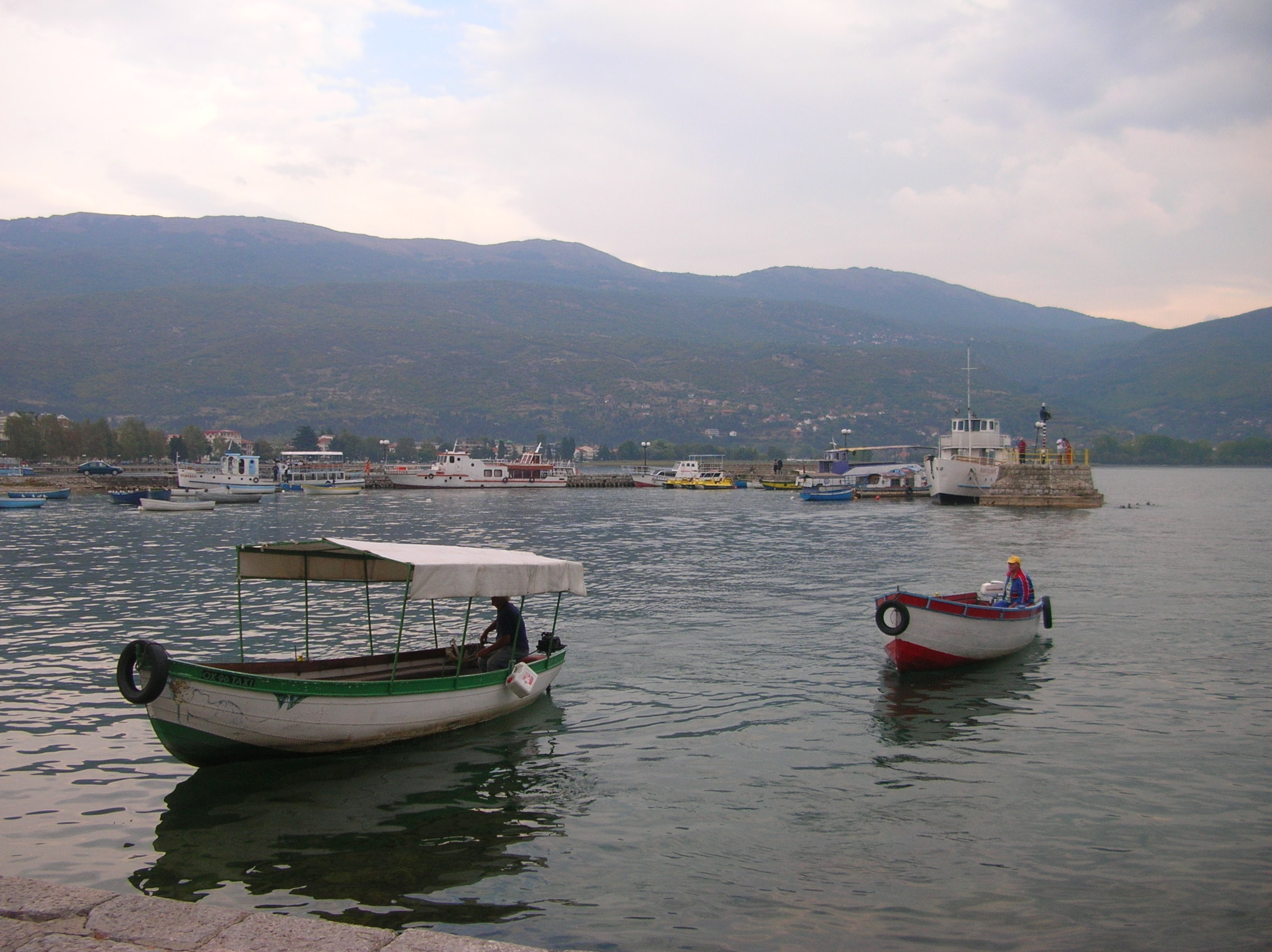
Ohrid, Macedonia, setting of PEN International Translation and Linguistic Rights Committee conference, 2006.
Exploring the conference theme spiritus loci will be part of the journey. As writers we know the power of place in literature and in our lives. The Latin term meaning the local spirit of a place is not always easily defined, but it relates to the geography, the history, the architecture and the people, who are both shaped by and shape the place. The ancient Romans thought every location had a spirit, some benign where people would live longer, happier lives and some evil and destructive of human well-being.
Today in a world grown smaller and more connected by jet travel, the internet, the global village, the cyber global village, with the blending of cultures and commerce worldwide, spiritus loci is perhaps a more fluid concept and to a younger generation, even a digital concept. On the internet I discovered a recording studio with the name Spiritus Loci; it moved from place to place recording people’s music wherever the musicians felt most comfortable.
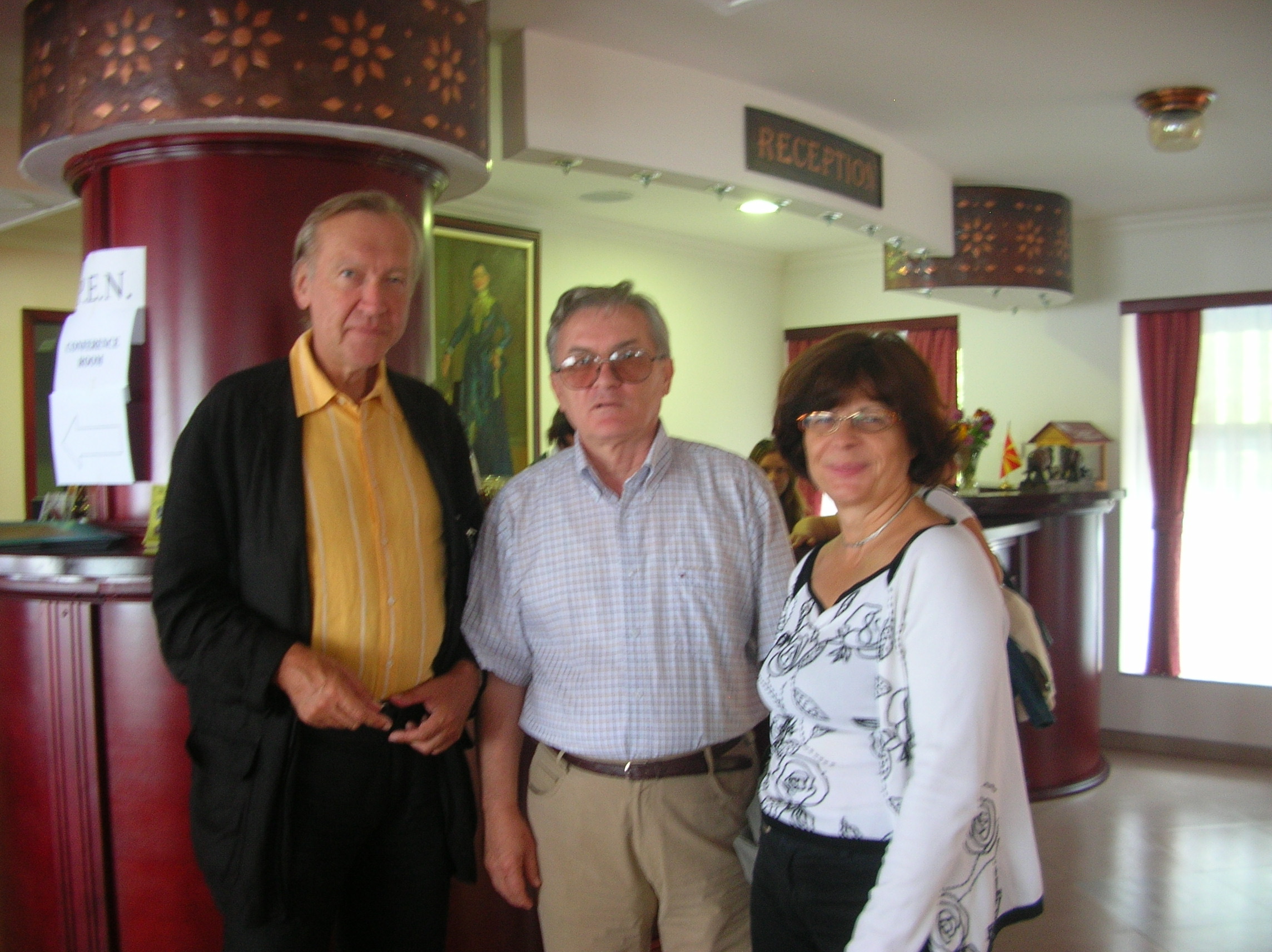
Eugene Schoulgin (Norwegian PEN) Dimitar Basevski (President Macedonian PEN), and Kata Kulavkova (Macedonian PEN & Chair PEN International’s Translation and Linguistic Rights Committee)
It is still the writer who can best capture a place and a people and render that spiritus loci for the reader. The best writers unveil the unity between location and character so that the writer’s version becomes the backdrop for understanding the place for generations to come, whether it be Tolstoy’s Russia, Balzac’s France, Dickens’ England, Achebe’s Nigeria, Toer’s Indonesia, Fuentes’ Mexico….[cont]
Launching into the Now—Portals of History, Glimpses of the Future
Though the world appears to be opening up with travel and in-person meetings and gatherings, at least in the U.S., I continue here in this space to revisit earlier blog posts like an archeological dig, excavating all the July posts since 2008. Together they compile a sort of dividing line between past—before the global pandemic lockdown—and future—whatever comes next.
I’ve yet to get on an airplane or train where I used to spend considerable time. I’m not reluctant to travel so much as at ease working where I am and have been the last 17 months.
I recently heard a physicist lecture, noting that he has never lived in the past nor in the future, only in the now. The mere fact of his being there makes it the now. So perhaps a historic dividing line is a misnomer as is the concept of annus horribilis. Looking instead at the certainty and continuity of Now, I determine and am determined by my present state of mind.
The July blog posts below peer into the rearview mirror of time and place—locations from Ghana, Turkey (Istanbul and Diyarbakir), China, England, Qatar, Jupiter/Pluto, Israel/Golan Heights, Portugal, Norway, Slovenia, Macedonia and America (Washington, DC)—and reveal the vagaries and hopes of human aspirations, some achieved and others derailed. Readers can click on the date and title to read the full post. In examining the events, I consider the continuity of the places and the resilience of individuals, even when history and homes were ultimately buried under 400 feet of water.
Now is what we have to shape and assist and is the place we live. The fact of getting there is cause for examination and celebration.
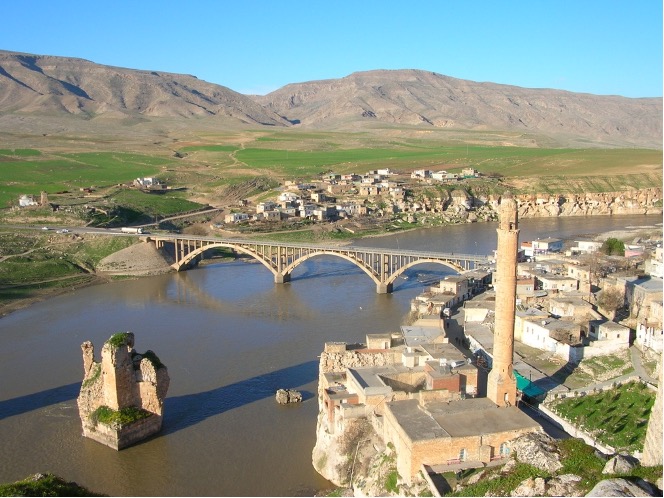
Hasenkeyf, Turkey, March 2005 during PEN Conference on Cultural Diversity, before the Ilisu Dam flooded the region. Photo credit: Joanne Leedom-Ackerman
July 31, 2008: Glass Beads: the Color of Hope, and a Peace Corps on Steroids
This past Sunday in the late summer afternoon with a thunder and lightning storm at two, then blue sky and sun by four, we held a small family barbecue to welcome home from Africa the daughter of a good friend…Our friend’s daughter had brought back a bundle of glass bead jewelry—blue and brown beads, black, red and white beads, etched beads, green and yellow beads, and red, white and blue beads all strung together in an array of bracelets and necklaces—as well as brightly colored children’s clothing, all of which she spread out on the table. She is selling these and will send the proceeds back to the refugees and the surrounding community; she’s also raising funds for at least one high school scholarship for a young man who helped her during her stay at the refugee camp.
There are thousands of stories like these of young people out in the world looking to learn and to give back. I have the privilege of knowing many in the U.S. and abroad whose commitment beyond their national borders suggests a generation that won’t retreat but will connect with the globe. They stay in touch with each other via the internet—even in villages or refugee camps, there is often a way to find an internet connection or at least a cell phone texting connection. These young people don’t hold political office; they don’t have a political agenda—at least not a partisan agenda–they are simply starting to take a share of the world onto their shoulders, one experience, one friendship, one lesson at a time….[cont]
July 28, 2009: On the Tigris: Hasankeyf—Walk into History
In the southeastern corner of Turkey near the Iraq and Syrian borders, where the Tigris River ambles south across the green plains of Anatolia, a major skirmish was won this month by environmentalists and human rights organizations when Swiss, German and Austrian firms pulled out of their contract with the Turkish government to build the Ilisu Dam. The Dam is a cornerstone in a larger project to develop Turkey’s electrical capacity over the next decade.
At the heart of the controversy is Hasankeyf—one of the cradles of civilization—claimed to be the oldest continuous settlement on the globe. Just this month archeologists have found relics they say date the site even earlier than the 10,000-12,000 years recorded; they are now speculating Hasankeyf may be 15,000 years old.
In the Kurdish region of southeastern Anatolia, Hasankeyf and its ruins rise up the limestone cliffs along the Tigris River, where at least nine civilizations have passed through, including the Assyrians, the Romans, the Byzantine empire, the Mongols, and the Ottomans. In ancient Mesopotamia, Hasankeyf was on a central trading route. The area boasts over 4000 caves, which were used as shelter and also as protection from invaders. Some of these caves are still occupied with artisan workshops and restaurants.
As one journeys up the hillside, up the stone steps to the ruins of Hasankeyf Castle, built by the Byzantines in 363AD, the visitor passes the minaret from El-rizk mosque and the circular Zeynelbey Tomb with its blue bricks in geometric designs. One can follow the secret water passageways through the rocks. Visiting Hasankeyf is a journey into antiquity with more than 300 medieval monuments and 83 archeological sites. Today the hillside is also dotted with artisans’ stalls and children on donkeys and restaurants inside the caves. During the controversy over the Ilisu Dam, the mayor in protest chose to live in one of the caves.
If the Ilisu Hydroelectric Dam is constructed as planned fifty miles downstream, much of Hasankeyf will be buried under 400 feet of water. The flooding will also submerge 80 surrounding villages in what would be Turkey’s second largest reservoir. While the government has said that it will move and preserve some of the antiquities, the Hasankeyf residents insist that it is impossible to move caves and many of the ruins. Those from other villages have also protested that the compensation being offered isn’t enough to resettle them….[cont]
July 25, 2010: Blessings and New Birth
This morning my first grandchild was born—a little girl with thick red lips, curious blue eyes, a curly cap of black hair and a surprisingly even temperament that accommodated two sets of grandparents, two uncles and an aunt all hugging, kissing and passing her around within an hour of her appearance in the world.
Everyone in the family is now napping, having had either a sleepless or restless night while the mother (and father) labored towards birth. But I am wide awake and making an effort to record this moment and also to fill this sultry afternoon while I wait to return to see the child. Outside, the temperature swelters above 100, then suddenly the clouds open and rain streams down on the earth. Just as suddenly the sun reappears, still a torch in the sky, but it is cooler now.
While everyone sleeps, I turn to the July blog post I’d intended to write today. I’d been collecting scraps of ideas and clippings for two possible directions for this month’s post, both focused on the wider world. One was to respond to a request for participation in a new project, a blog entitled “Drafting a New Story: Women’s Rights in the Middle East.” Another was a post tentatively titled “Imagining Cuba,” where the promised release of 52 dissidents has stirred some hope for an easing of rights in that country though the releases are conditioned on the prisoners leaving Cuba. Still, the first prisoners, many of whom are writers, have made their way to Spain and to freedom. One recently wrote in The New York Times, “I never imagined I would be born at the age of 60, at an altitude of several thousand feet above the Atlantic. That isn’t gibberish; it’s what I felt when I was released from jail in Cuba and exiled to Spain last Monday.”
The birth of a child brings one’s focus intensely close and personal and at the same time extends it outwards, straining towards the universe and the universal, towards the hope for future generations….[cont]
July 29, 2011: Tourist in Beijing: A Dance with the Censor
We were five PEN members in Beijing, proceeding to Hong Kong where we’d been invited to celebrate Independent Chinese PEN Center’s (ICPC) tenth anniversary. It happened also to be the 90thanniversary of the Communist Party in China as large commemorative plaques proclaimed in Tiananmen Square. And it was the 90th anniversary of PEN International.
We were there to visit writers and bookstores and any independent publishers we could find to gather information on the state of literature and freedom of expression in China and to show solidarity with threatened colleagues. Half the members of the Independent Chinese PEN Center lived in China, half outside. A number of ICPC’s members had been sent to prison for their writing, which the government deemed “subversive to the state.” The writing included articles challenging the demolition of old Beijing, food poisoning scandals and the lighting of 1000 candles commemorating Tiananmen Square. The most prominent of these imprisoned members was ICPC’s former president Liu Xiaobo, 2010 Nobel Laureate for Peace who helped draft Charter ’08 which set out a democratic vision for China.
Our first day—our recovery day—several of us visited the Summer Palace, Tiananmen Square and the Forbidden City as well as a visit to an embassy. In the evening we gathered at a bookstore with writers and journalists where discussion focused on literature and the shrinking landscape for free expression. Micro blogging (like Twitter, though Twitter is blocked) was proliferating, we were told, and often skirted the censors, but censorship of the internet and traditional forms of writing had intensified.
In the days ahead writers, journalists, scholars and officials in embassies, all agreed that the crackdown on freedom of expression in China hadn’t been this grave since the days of Tiananmen Square. The restrictions since February (when the Arab spring began) included arrests of writers and human rights lawyers, torture, increased surveillance, closing down of events at bookstores and monitoring of all communications and movement of suspected dissidents. Many of the so-called dissident writers and human rights lawyers were so closely watched that police literally sat outside their doors….[cont]
July 31, 2012: Pilgrims and the Olympics
On July 31, 1620 the Pilgrims departed from England to America.
A small community of English Protestants, unhappy with the Church of England, had earlier settled in Leiden, Holland hoping to find religious freedom. They found the freedom there, but also found they were kept out of the guilds and given menial jobs. Many of their children became attracted to the secular, more cosmopolitan life so they returned to London, where they got funding through a wealthy merchant and permission from the Virginia Company to establish a “plantation” across the Atlantic between the Chesapeake Bay and the mouth of the Hudson River. The “Separatists,” who called themselves “Saints,” joined up with a larger group they called the “Strangers.” These 102 Saints and Strangers, later known as the Pilgrims, set sail in the middle of summer on two ships headed for the New World.
However, one of the ships began to leak so both ships returned to port. All the passengers and their belongings crammed onto the remaining ship–the Mayflower–and set out again. By then it was the middle of September, the height of storm season on the Atlantic.
After two treacherous months, the Mayflower dropped anchor near the tip of Cape Cod, well north of the goal and a month later sailed across the Massachusetts Bay. By then it was the onset of a brutal New England winter, most of which the Pilgrims spent in harbor on the ship trying to survive. When spring finally arrived, only half of the passengers and half of the crew remained.
Technically, the Pilgrims had no legal right to occupy the land onto which they disembarked, a settlement they named “Plymouth” after the port from which they’d sailed. But they drafted and signed a document they called the Mayflower Compact. They promised to create a “civil Body politick” which would be governed by officials they would elect and ruled by “just and equal laws.” They promised allegiance to the king of England.
On this land they met the native population, one of whom actually spoke English, having been captured by an English sea captain and sold into slavery before he escaped to London. He and others shared supplies and taught the settlers how to survive in their harsh new land. For at least 50 years harmony and friendship existed between the Pilgrims and native Indians. This sharing and friendship is the origin of the American Thanksgiving, which is still celebrated in November each year even if subsequent history proved less admirable.
Today across the Atlantic in England the world is gathering and competing for the next two weeks in friendship in the XXX Olympic Games. Recalling a bit of history mid-summer is perhaps appropriate.
No blog posted July 2013
July 1, 2014: In Qatar, calls for release of prisoners come with the start of Ramadan
(This piece appears on GlobalPost.)
Commentary: The release of one imprisoned poet during Ramadan may seem a small act, but would be a significant humanitarian act toward a more enlightened state.

Muslim men perform the Eid Al-Fitr morning prayers outside the Ali Bin Ali mosque in Doha on September 30, 2008. Eid al-Fitr festivities marking the end of the Muslim holy fasting month of Ramadan are celebrated starting today in most of the Middle East countries. (KARIM JAAFAR/AFP/Getty Images)
I am not a Muslim, but I am focused on the arrival of Ramadan this year. The month-long observance began this weekend for 1.6 billion Muslims around the world. A time of fasting, increased prayer and charity, Ramadan is also a time when governments of Islamic countries grant amnesties to citizens and to those in prison.
Ramadan, the ninth month in the Islamic calendar, observes the time when Muhammad, a caravan trader wandering the desert near Mecca contemplating his faith, is said to have been called to receive the word of Allah. The revelation was eventually transcribed as the verses of the Qur’an.
The reconciliation of this holy time with political dispensations varies according to countries and their leaders. My focus is on the country of Qatar and the particular case of a poet in prison. Qatar has been in the news lately as the recipient of the five Guantanamo detainees. This transaction has taken the headlines.
But also in prison in Qatar is poet Mohammed Al Ajami, who has spent more than two years in solitary confinement for two poems. A father of four, Al Ajami is serving a 15-year sentence (reduced from life imprisonment) for poems criticizing the Emir and supporting the Arab Spring. One of the poems was read in a private reading in his apartment in Cairo, but was secretly taped by a fellow poet and uploaded on YouTube. Al Ajami was eventually charged a year and a half later with “encouraging an attempt to overthrow the existing regime….”[cont]
July 15, 2015: EYES ON PLUTO… “WE DID IT!”
Headlines from earth yesterday heralded the Iranian Nuclear Deal, but some of us were looking skyward. On a small green campus tucked into suburban Maryland at the Johns Hopkins University Applied Physics Lab scientists, engineers, media, friends, family, faculty and board of Johns Hopkins University awaited the report back from Pluto. The New Horizons spacecraft, built by Hopkins APL engineers and scientists, had arrived at the outer planet three billion miles away after a nine and a half year journey. That evening the spacecraft was reporting in after 22 hours of silence while it gathered extensive data as it passed within 7750 miles of Pluto.
The spacecraft, which had been built in a record four years at APL, had traveled at a rate of a million miles/day (between 31,000-46,000mph depending on its orbit). The evening before it had started downloading data and taking pictures in a rapid collection of scientific information. It couldn’t do that job and call home at the same time so its progenitors waited anxiously at Mission Control, aware that any number of unpredictable events like a pebble size bit of detritus colliding could disrupt and destroy the mission.
“Stand by for telemetry….” Mission Operations Manager (MOM) Alice Bowman alerted. At 8:52:37pm—right on time—New Horizons called home. “We’re in lock with telemetry with the spacecraft,” she affirmed as one by one the systems managers reported: “MOM, propulsion is nominal…MOM, thermal is nominal…MOM, power is nominal…” Nominal meant normal. MOM meant Alice. The conclusion: “We have a healthy spacecraft and we’re outbound for Pluto!” The room at Mission Control and in the auditorium nearby burst into cheers and tears and gave a standing ovation. It was a remarkable moment and extraordinary achievement.

The mission had proceeded like clockwork. It had been a team effort over a decade and a half, occupying 2500 people. The very best scientists and engineers built the space craft, designed its scientific mission (including the first student-designed project on a NASA mission), programmed its course. The trajectory included an important scientific data-gathering pass of Jupiter, where the spacecraft received a needed gravity assist which sent it hurling on its way into deep space.
New Horizons arrived at the closest approach to the planet just 72 seconds early. That precision over nine years and three billion miles was almost impossible to comprehend except to the scientists and engineers who understood that precision was essential to accomplish the task. Even a small margin of error projected over that amount of time and space could be disastrous….[cont]
No blog posted July 2016
July 24, 2017: Dogs, Cows and Wolves: Security on the Golan Heights
On the Golan Heights in the hills separating Syria and Israel fields of cows graze and sleep, swishing their tails, whisking off flies. Many of the cows lying in the fields appear to be waiting and contemplating as cows do. The cows are a source of milk and of meat and income for a kibbutz nearby. Among the cows wander white dogs. It is a peaceful scene except for the distant thudding and booming of the war in Syria just a mile away.

But at night wolves come out. The dogs and an occasional cowboy are the cows’ main defense. The wolves need to eat too, and a cow just standing there, especially if separated from the herd, is a natural target. The wolves are sleek and fast, and the cowboys respect them.
Sometimes the wolves score, but more often the dogs bark and circle, and the cows bellow. Dogs and cows together hold their own, and the wolves have to look elsewhere for food. Twenty years ago the cowboys determined that if they placed pups in with the cows from birth until they were 10 months old, the dogs would naturally identify with and want to protect the cows. If there are enough dogs, they can dissuade the wolves. The scheme seems to be working, but it is a standoff and not the same as peaceful coexistence.
This drama has played out with theme and variation over the past 50 years since the Golan Heights were occupied by Israel after the Six-Day War in 1967. Israel’s offer to return the Golan in exchange for peace with Syria was rejected then, and Syria attacked in the 1973 Yom Kippur war and was defeated. At present Israel occupies two-thirds of the hills of the Golan which overlooks the Valley and contains the Sea of Galilee and the Jordan River. The Golan includes volcanic fields with dark volcanic rock and lighter limestone rocks. Fruit trees, particularly apples, grow there. The area overlooks Israel which sees the Golan as a natural defense line that secures its border with Syria. Between the two countries lies a small demilitarized zone monitored by the United Nations.
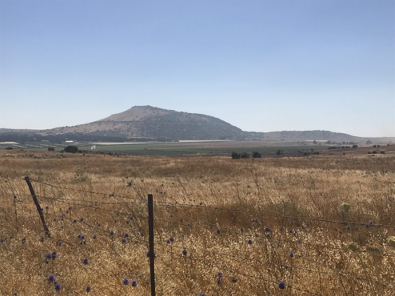
As the Syrian war turns yet another corner with the recent ceasefire, the Russians (and potentially by association Hezbollah and the Iranians) are now sanctioned to patrol and come within a mile of the Israeli border. Tension is again heightening. The border itself is protected by small fences and bunkers, but now on higher alert by the Israeli Army and those in the Reserves who tend the cows and pick the apples in times of peace.
No blog posted July 2018
July 2019: [Beginning in May 2019 I started writing a retrospective of work with PEN International for its Centenary so posts were more frequent in 2019-2020. In July 2019 there are two posts in the PEN Journeys and in July 2020 there are three.]
July 1, 2019: PEN Journey 5: PEN in London, Early 1990’s
PEN International celebrates its Centenary in 2021. I’ve been active in PEN for more than 30 years in various positions and now as an International Vice President Emeritus. With memories stirring and file drawers of documents and correspondence bulging, I am a walking archive and have been asked by PEN International to write down memories. I hope this personal PEN journey might be of interest.
I moved to London where International PEN is headquartered in January 1990 from Los Angeles. I came with my husband and my 9 and 11-year old sons who rarely wore long sleeves, let alone coats or jackets. A few weeks into our resettlement, London spun in its first major tornado of the decade with hail and winds whipping at hurricane force and cars and trees toppled and a few rooftops airborne. The weather was highly unusual for London. Our family, who was still in temporary housing, took the unwelcome weather as a welcome of sorts, signaling that we might just be in for an adventure. Did you see that roof flying…!
There were still complaints: only four television channels, movies strictly restricted by age and when you did get into a theater, you had assigned seats, milk that went bad in a day, delivered on the stoop in glass bottles, a refrigerator that barely held enough food for a day, appliances that came without plugs…And where was the sun?
Yet the magic of the city quickly affected us all. My youngest son discovered the best skateboarders lived in London, and London (and England) was full of history and castles, and my oldest son, who was soon moved ahead a grade in school because he was highly talented in math, met students from all over the world in his class at the American School, a few of whom talked and imagined in his orbit. He was put on the rugby team to help socialize and the following year on the wrestling team, where he eventually, as an adult and by then dual citizen, wrestled for Great Britain in the Olympics.
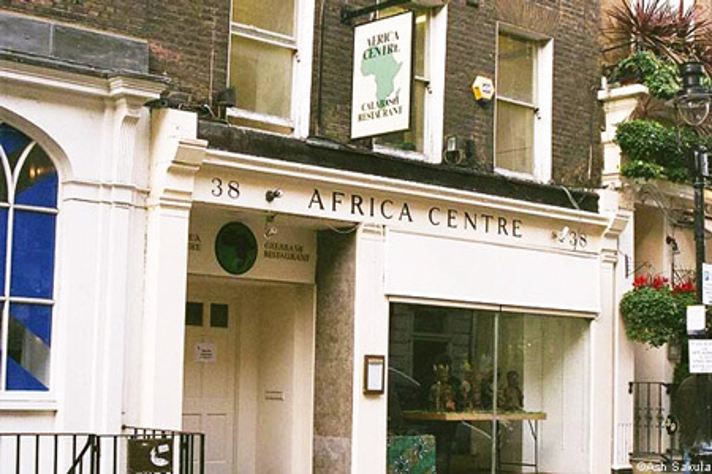
For me, finding home in London meant connecting with PEN, both International PEN and English PEN. Writers can be members of more than one PEN center, though can vote with only one center. I’d begun my PEN journey in Los Angeles at PEN Los Angeles Center (changed to PEN USA West). When my second book was published, I also joined PEN American Center, based in New York, and now in London. I joined English PEN, the oldest and the original PEN center since the organization was founded by British writers in 1921. International PEN and English PEN had separate offices, but the Administrative Secretary of International PEN and the General Secretary of English PEN were longtime friends and actually lived next door to each other in Fulham. The two organizations worked independently, yet closely together.
Early on I visited International PEN’s office, headquartered in Covent Garden on King Street in the Africa Centre. To get to the office at the front of the house, you had to go through the Africa Book Shop on the first floor. PEN had two rooms with several desks in the larger room with papers stacked everywhere. There was a filing cabinet and a photocopier and just enough space to squeeze between to get to the desk looking onto the street….[cont]
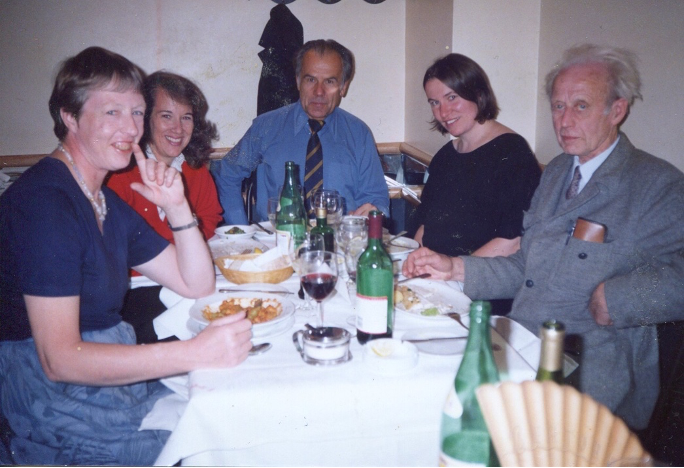
Fall 1990. Left to right: Elizabeth Paterson, Joanne Leedom-Ackerman, Per Wastberg (former PEN International President), Siobhan Dowd, Bill Barazetti
July 15, 2019: PEN Journey 6: Freedom and Beyond…War on the Horizon
PEN members played key roles in the shifting landscape of Europe in the early 1990’s as the Berlin Wall fell, and the East moved closer to the West. Playwright and PEN member Vaclav Havel, who spent multiple stays in prison for his opposition and activism against the Communist regime, was elected President of Czechoslovakia in December, 1989. Czech writers Jiri Stransky and Jiri Grusa, both of whom spent time in jail under the Communists, later worked with Havel. Jiri Stransky became President of Czech PEN, and Jiri Grusa worked in the Ministry of Foreign Affairs and later was elected President of PEN International in 2003. Dissident Hungarian writer Arpad Goncz, whose name was on the program of the 55th PEN Congress as a member of the Hungarian delegation, was prevented from coming because on the day he was to depart, he was elected President of Hungary.
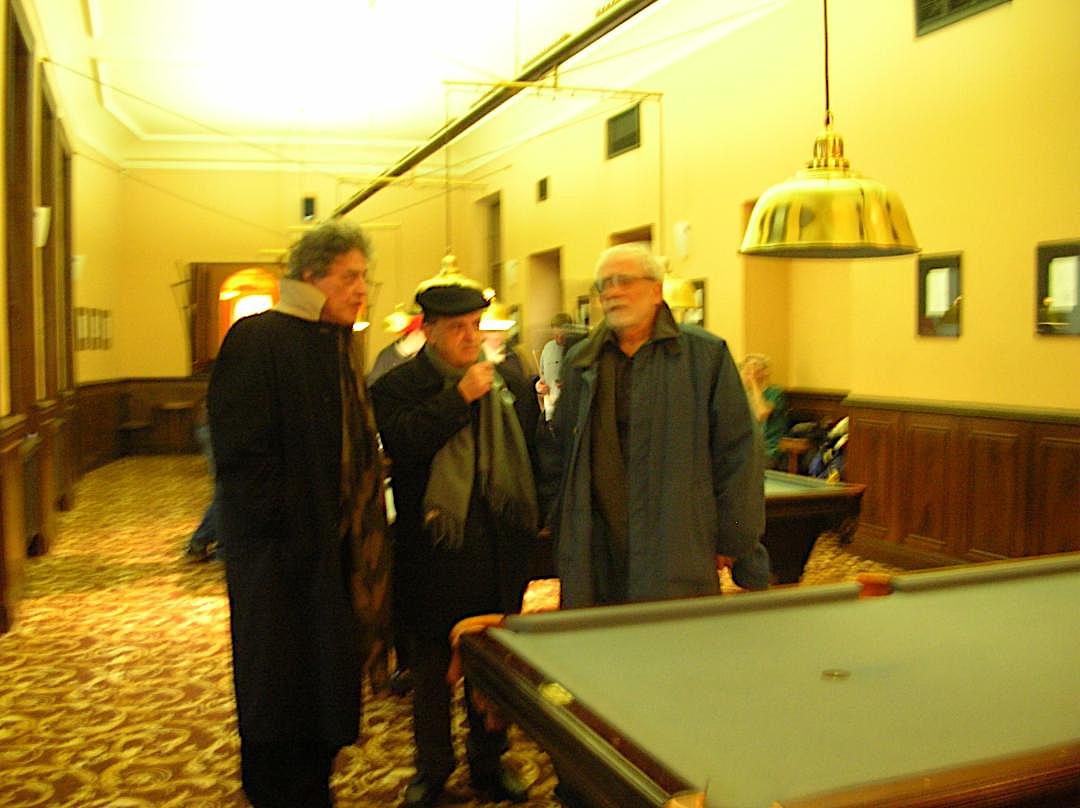
Czech PEN members playwright Tom Stoppard, Jiri Grusa (President of PEN International) and Jiri Stransky (Czech PEN President) at historic restaurant in Prague in 2005
At PEN’s 55th Congress in Madeira, Portugal May,1990, Hungarian novelist Gyorgy Konrad was elected President of International PEN after the unexpected death of President Rene Tavernier. According to the interim and past President Per Wastberg, Konrad had been “very active in the spiritual liberation not only of his own country, Hungary, but of Eastern and Central Europe.”
Konrad told the Assembly of Delegates, “It had been the spirit of human rights, which corresponded with the main interest of the freedom of the mind and of literature, which had been the motive force in recent events in Eastern Europe so that it had been the spirit, rather the physical force, which had caused the shifts in power.” [But] “liberated from the uneasy situation of the censorship of the one-party system, writers there were facing a new sort of danger, the danger of conflicts between nationalities spurred on by national chauvinism. If it was possible to find understanding between writers in that very disturbed part of Europe, maybe it would also be easier to find understanding between the governments and the peoples. Therefore the PEN Centers and their members could perhaps form the avantgarde of this understanding….”[cont]
July 9, 2020: PEN Journey 34: Diyarbakir and Beyond—Finding Byways for Peace
PEN has always been about building bridges, finding the byways of fellowship among writers whose currency is language and imagination and whose hope is that even with radically different histories and backgrounds, writers might find a way to sit down across a table from each other and share stories and listen to each other and thereby have a beneficent influence on the way they and their societies see themselves and others.
It is an idealistic goal that has been battered in PEN’s hundred year history, and yet the organization continues; the dialogues continue, and writers from over 100 countries continue to meet and talk, even from countries whose governments have not found peace in decades. There have been moments of seeing that optimism realized, at least for a time, and also seeing it smashed….
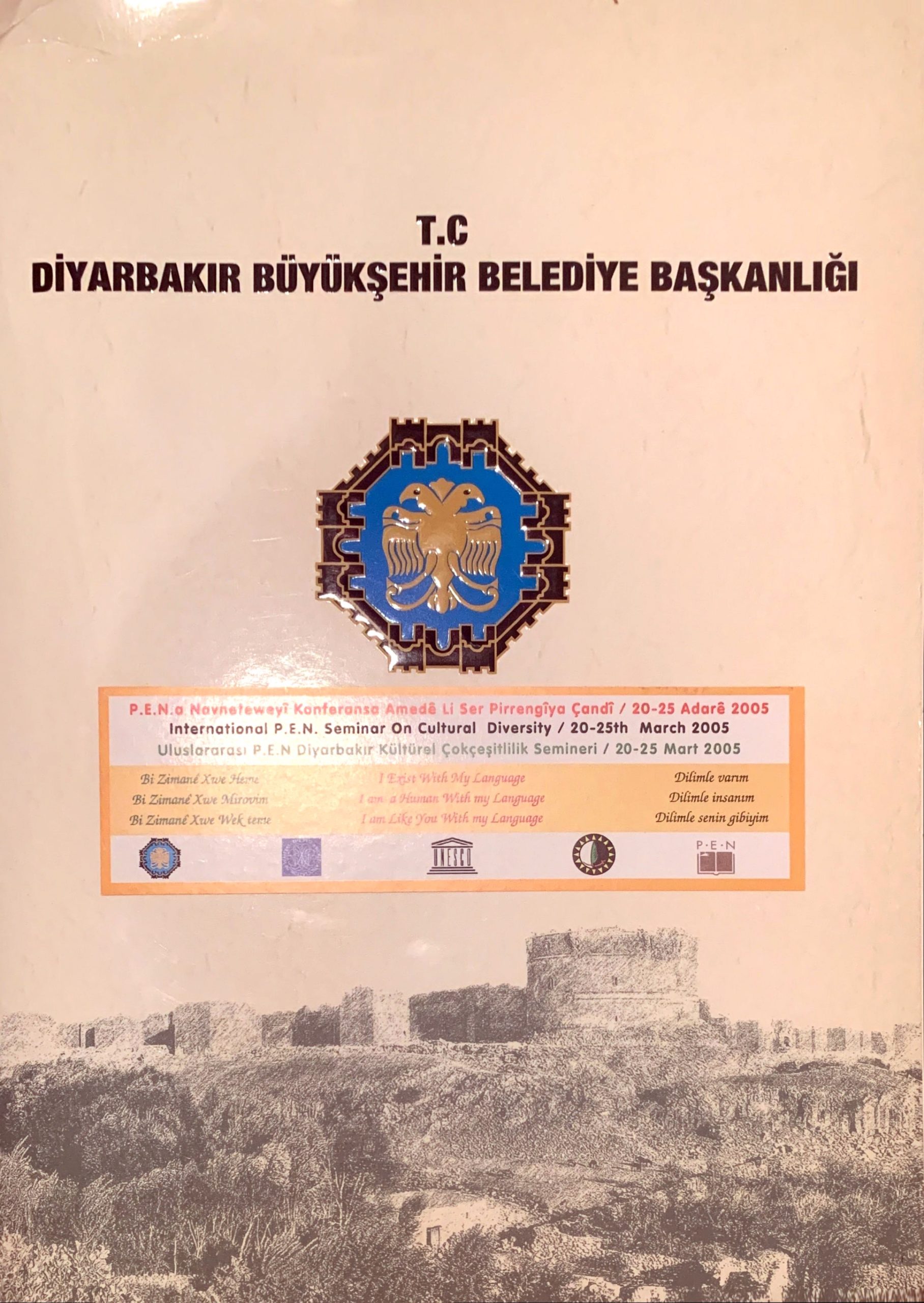
International PEN Seminar on Cultural Diversity in Diyarbakir, Turkey, March 2005
In January, 2005 we held our first board meeting of the year in Vienna where PEN President Jiří Gruša had recently taken up the position as Director of the Diplomatic Academy of Vienna which hosted us. The formal board meeting itself took place in the basement of the hotel restaurant where we were staying. Around the table in the cozy space where we sat on chairs and on a long booth was PEN’s diverse board from Algeria, Colombia, France, USA, Czech Republic, Denmark, Finland, Croatia, Australia, Norway and Japan. The search for an executive director, the new financial and employment systems going into place in the office, an upcoming meeting in Stavanger, Norway with the old Cities of Asylum Network, and an upcoming meeting in Diyarbakir, Turkey with Kurdish and Turkish PEN—all populated the agenda as did the omnipresent discussions on fundraising.
For me, the imminent departure of my Marine son from the combat zone in Iraq hovered in the corner of my mind. We were staying at a pension hotel with small rooms—single bed, dresser and nightstand; I could almost touch the walls on both sides. Outside it was snowing. I’d come to Vienna unprepared for the snow and had bought at a sale a large puffy yellow coat that now draped across the bed for warmth. At night in the dark as I fell asleep, I thought about my son and one night dreamed a desperate dream. Then the phone rang; it was 1:30 in the morning. My husband’s voice woke me. “Wheels are up!” he declared. “They are on their way home!” I still remember the moment, lying there in the dark, snow glistening in the light through the small window and feeling as though the walls had suddenly expanded and a weight lifted that I hadn’t been fully aware I was carrying. The memory…the snow, the Cathedral we passed each day in the square and at dusk in the evening, the puffy yellow coat…
I was wearing that same coat as snow fell later that month in Washington, DC the day my son finally pulled into our driveway. I was sitting on the front porch swing in the snow waiting for him, thinking about the hotel room in the dark, the restaurant basement where we helped craft a conference for writers from the hostile parties in Turkey and another to find sanctuary for writers fleeing oppression—all these memories are wrapped together in a moment of return and of the spirit lifting and life opening a corridor to walk down….[cont]
July 22, 2020: PEN Journey 35: Turkey Again: Global Right to Free Expression
PEN’s work attests to the power of the individual and also to a particular vision of globalization that advocates the global right to free expression, a right that supersedes national restrictions.
In February 2005 Orhan Pamuk, one of Turkey’s most noted writers, received threats and had his books burned by nationalist groups objecting to comments he made to a Swiss magazine while he was abroad. He referred to an Armenian “genocide.” While the Armenian community rallied to defend him, their support heightened certain nationalists’ protest in Turkey. Orhan wasn’t in Turkey at the time and hoped the turmoil would die down, but a government official in southern Turkey ordered the seizing of his books from local libraries so that they could be destroyed; it turned out later that there were none of his books in those libraries.
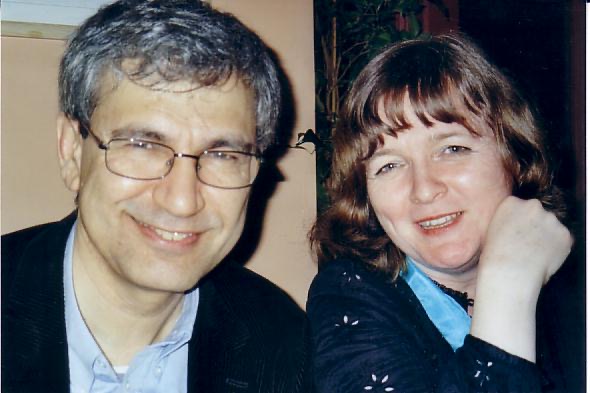
Novelist Orhan Pamuk and Sara Whyatt, International PEN Director of Writers in Prison Committee (Photo credit: Sara Whyatt)
At Pamuk’s request International PEN kept quiet publicly at first. In mid-April Sara Whyatt, International PEN’s Director of the Writers in Prison Committee(WiPC) and I had lunch with Orhan in London to discuss how PEN could help if the threat escalated. I was International Secretary of PEN at the time. We agreed that publicity at this stage could exacerbate the situation; however, we explained that PEN centers could work behind the scenes by direct contacts with their governments, and PEN would be prepared to step into public action should the need arise.
Pamuk intended to stay outside Turkey until late April/early May, but then he would be returning home to Istanbul. Sara stayed in touch with him and shared a plan for action if the threats resumed on his return. Meanwhile we told him PEN would continue to lobby for a change in the Turkish Penal Code that allowed the charges. Key PEN centers, who had good relations with their own governments, and centers from countries with influence in Turkey would make approaches. London’s WiPC would make similar approaches to Turkish officials in Ankara and also through mechanisms at the United Nations, OSCE, and the European Union (EU). At the time Turkey was hoping to become a member of the EU and was attempting to align its judiciary codes with those required by the EU. PEN also worked with the International Publishers Association.
PEN prepared a statement on the situation in Turkey from early 2005 and kept it updated with news and recommended actions for the over dozen PEN centers ready to respond on this case. There was also press guidance should the centers receive queries. Meanwhile PEN continued to work on the other cases of over 70 writers and intellectuals charged or in prison in Turkey, which had long been a country with a revolving door of writers harassed, detained, attacked and sent to prison.
On April 1, 2005 World Peace Day the Turkish press reported:
The investigation against author Orhan Pamuk due to this statement saying, ‘One million Armenians and 30,000 Kurds were killed’ [in Turkey] has ended with a case in which he is accused of violating article 301 of the new Penal Code (same as famous article 159 in the former one) “Insulting Turkish nationality” and with the demand of being imprisoned between six months and three years. The first hearing will take place at Istanbul Sisli No. 2 First Instant Criminal Court on December 16, 2005.
The Public Prosecutor claimed that Pamuk’s remarks in Switzerland’s Das Magazin were an infringement of Article 301/1 of the Turkish Penal Code which states that “the public denigration of Turkish identity” is a crime and that those found guilty should be given sentences ranging from 6-36 months.
With threats renewed by the Public Prosecutor and a lawsuit filed against Pamuk that could result in a three-year prison term, Orhan finally gave PEN the green light to launch its campaign. PEN centers mobilized globally, including in Turkey….[cont]
July 31, 2020: PEN Journey 36: Bled: The Tower of Babel—Part One
In pulling out papers from 2005 of PEN conferences and the 71st World Congress, I came across two documents that told a very human story in PEN and a coincidence of life that I share here:
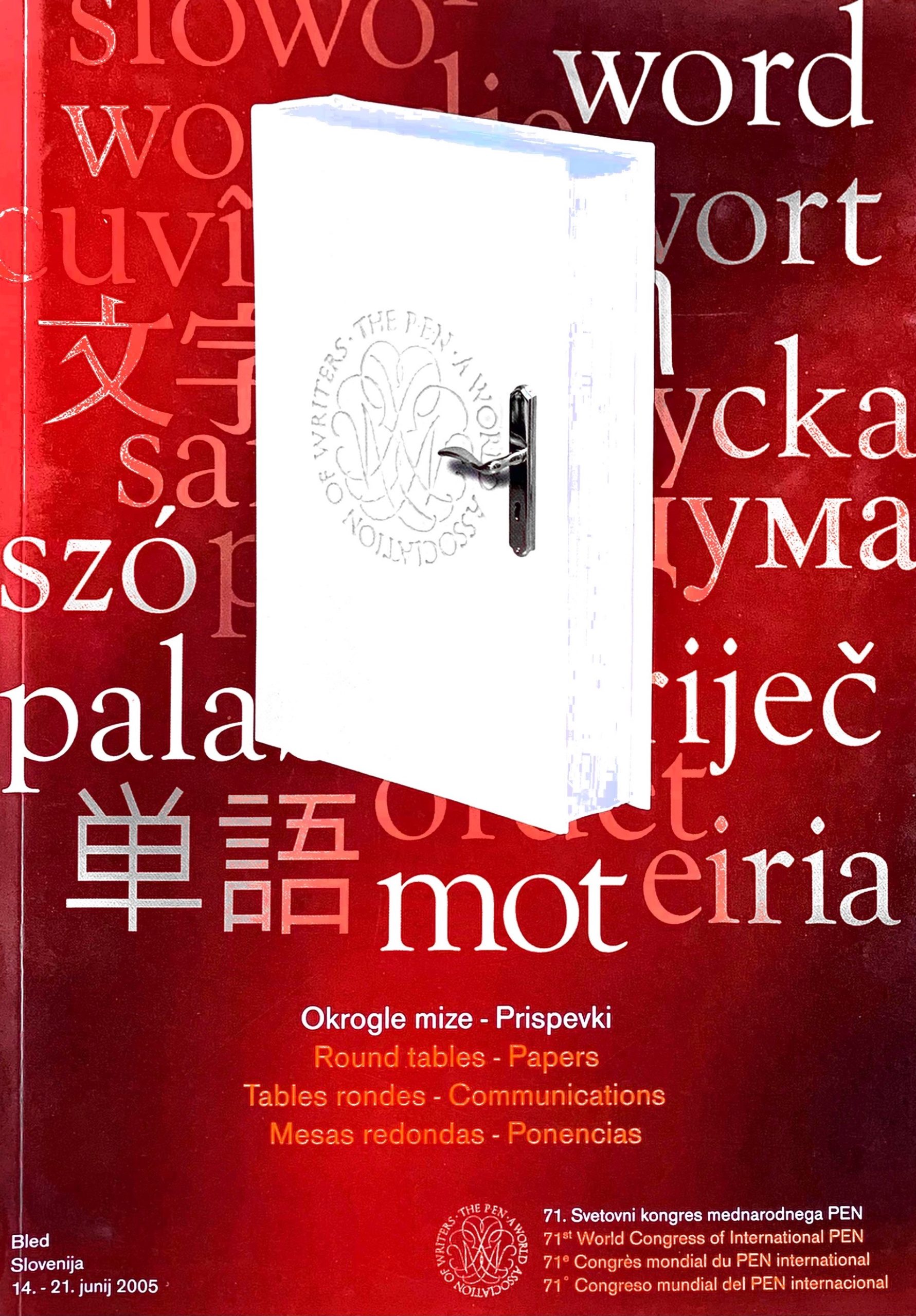
71st PEN World Congress 2005, Bled, Slovenia, Round Table Papers
The first paper I skimmed was a talk I’d given as PEN International Secretary at the Translation and Linguistic Rights Committee Conference in Ohrid, Macedonia in September 2005; the paper included the testimony of a PEN member at the end. The second text I read was from the Round Table Papers of the PEN Congress a few months before, in June 2005. This paper was on the Congress theme Tower of Babel: Blessing or a Curse? The paper was the first in that publication and was written by celebrated Nigerian poet Niyi Osundare who speculated on what the world would be should there be just one language and then meditated on what in fact the world was. Shared below are excerpts from Dr. Osundare’s paper, “The Blight and Blessing of Babel:”
“A one-language world would be too simple, too linguistically neat, too unrealistic. And, I daresay, too unnatural. For everywhere in nature there is a tendency towards fission and mutation on an intra-and inter-generic basis. Variety is not only the sauce of life; it is also its source…
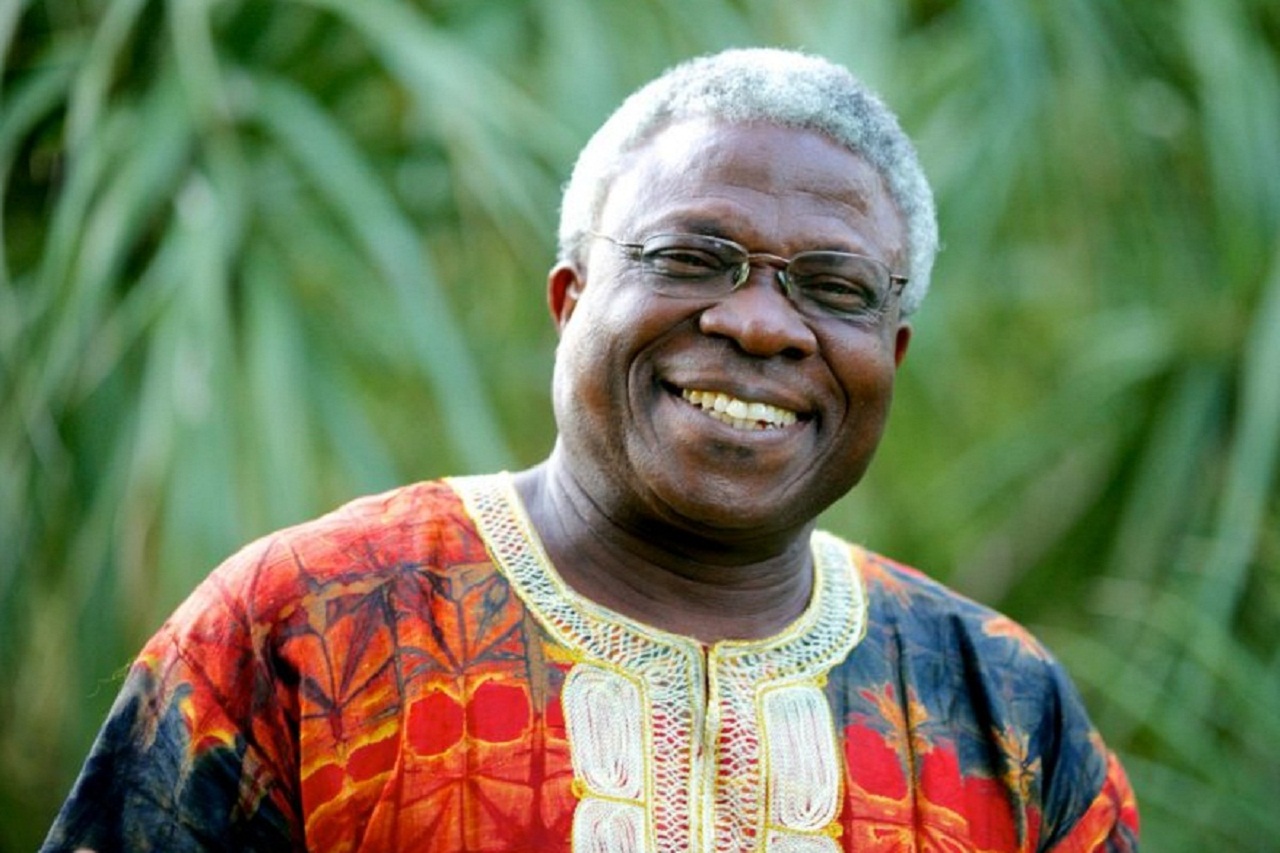
Nigerian poet Dr. Niyi Osundare
“Yoruba culture (the culture in which I was born and raised, and one that I know best) understands the necessity of diversity and inevitability of varieties in different aspects of human life. Hence the saying “Mee l’Oluwa wi” (Many, says the Lord) and “Ona kan o w’oja” (There are countless routes to the same market), both of them short, handy variations on a longer proverb “Oju orun t/egberun eye fo lai farakanra (The sky is wide enough for a thousand birds to fly without colliding). Corroborating this pluralist perspective is the folktale about the Tortoise, ever cunning and self-centered, who one day decided to capture all the wisdom in the world and seal it up in one pot for his own use in an effort to become the wisest being in the world. Of course, his project ended up in a laughable disaster as his pot fell to the ground and exploded while different fragments of the imprisoned wisdom dispersed in different directions, free for all, unmonopolisable. In an essentially pluralist Yoruba worldview, phenomena exist by mutual definition; a thing, a person loses its sense of proportion when there is nothing else to compare it with. The trajectory of life hardly ever follows one straight and narrow path; it must confront the crossroads, experience the thrills and tortures of decision and indecision, before arriving at the juncture of choice. And for the act of choosing to take place, there must be more than one…
“Literature (and the arts generally) is, no doubt, a powerful weapon in the struggle against the blight of Babel. By endowing our airy thought with that ‘little habitation’ and ‘name’ (hail Shakespeare, one of the supreme healers of the wounds of Babel), by generating universal sympathies, globalizing the particular and particularizing the global, by producing that music of the spheres whose winds stir the eaves in different lands, by evoking images which touch hearts across cultures, by articulating those humane values that are essential to human freedom everywhere in the world, by constantly lifting the human spirit and enriching, interrogating human reality with the supple possibilities of fiction…literature strives to restore some of the lost potentialities of Babel. For every significant writer is a bridge-builder of a kind, a witness, a participant-observer, an advocate of a truly humane future.
“No doubt, the phenomenon of Babel has left its fragmentations and dispersals. But it has also bequeathed to humanity a panoply of sounds and letters, an astounding (even if confounding) array of tongues which challenges the tyranny of uniformity and monotony of methods. It has necessitated the building of bridges across diverse tongues and cultures, these bridges being, in a way, a horizontal alternative and antidote to the vertical impossibility of the Tower itself.”
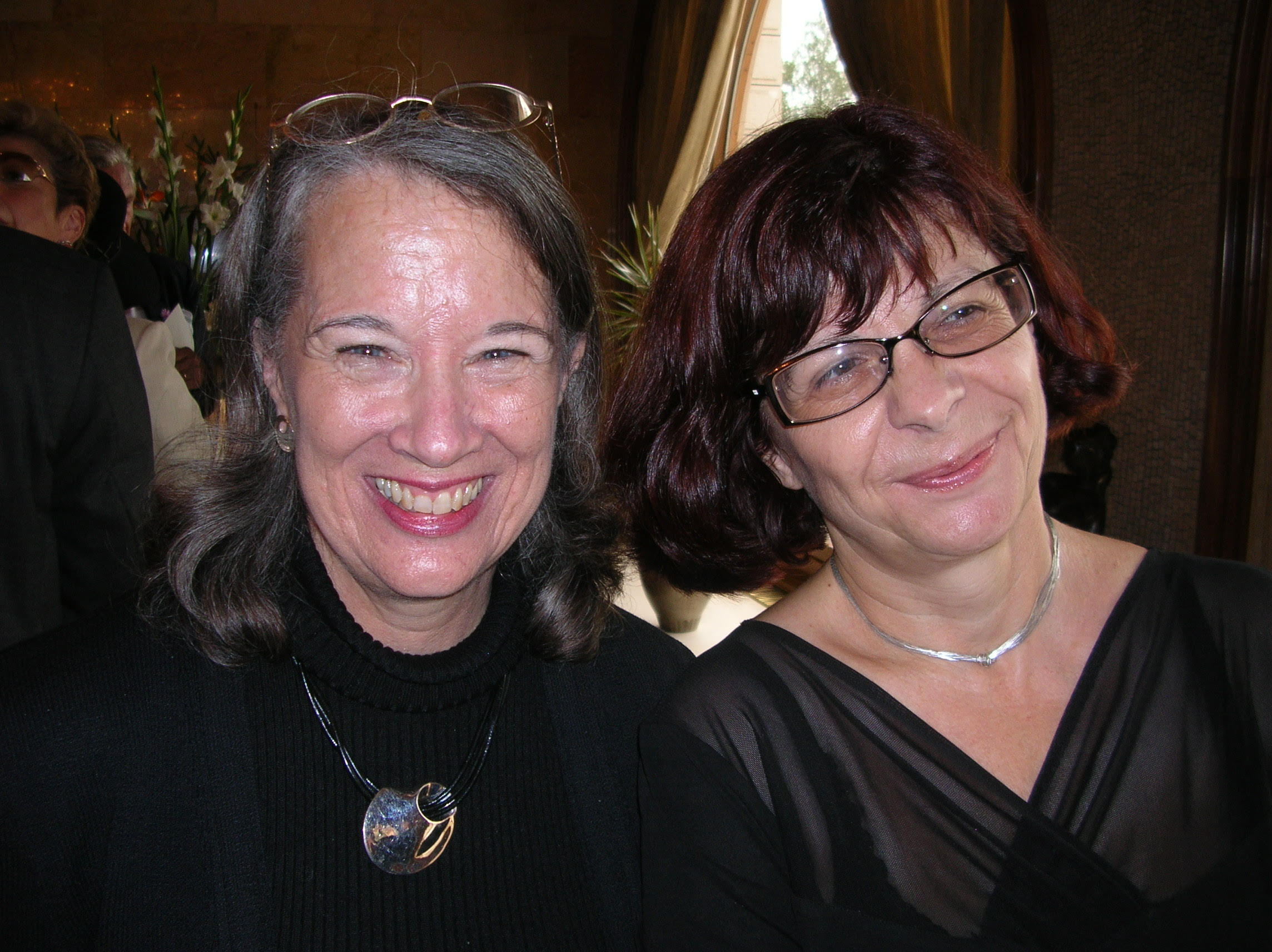
L to R: Joanne Leedom-Ackerman (PEN International Secretary) and Kata Kulavkova (Chair PEN Translation and Linguistic Rights Committee)
Dr. Niyi Osundare, a Nigerian PEN member, had moved to New Orleans for specialized education for one of his daughters and was also a member of the African Writers Abroad PEN Center. Recounted here is my talk to the Translation and Linguistic Rights Committee a few months after the Bled Congress, in September 2005. Only as I recently read the end of my paper did I grasp the connections and the range of PEN’s reach and work. My observations at the time:
The theme of the 8th Ohrid P.E.N. Conference—Writer Within and Without a Homeland—struck a particularly sonorous chord as I was preparing to come here.
In the U.S. the question of homeland has been on the national consciousness for the past month as one of America’s most diverse and multi-lingual cities—New Orleans—has literally disappeared. Its population evacuated as the city sank into the waters of the Gulf of Mexico. A large portion of the Gulf coast also fled in the face of Hurricane Katrina. Over a million people dispersed throughout the land in one of the largest displacements in the nation’s history. Many will never return to their homes….
When a home is suddenly gone, family scattered, livelihood and career and ambitions all uprooted, one is forced to consider what endures, and what one can take with him. Home moves from a physical place to a place in consciousness.
The ability to speak with others and to tell the story is especially important and makes the idea of language as homeland compelling, also imagination as homeland, literature and art as homeland, and particularly relevant to PEN, a community of fellowship as homeland.
I’d like to read a message to PEN’s Africa Writers Abroad Centre from a Nigerian writer trapped in New Orleans:
This is my first real internet access since the disaster struck…I can’t thank you enough for your concern and care. It’s been all so overwhelming. My wife and I are alive and, after passing through five horrendous “evacuation centers”, have been allocated to the Red Cross shelter in Birmingham, Alabama. The nightmare of the past seven days is simply unimaginable. We very narrowly escaped drowning in our own house. Pursued by an 8-foot high toxic flood water (15 feet in the street outside our door), we were forced up a stuffy, airless attic, where we were holed up for 26 hours, with no food, no water, no prospect of any rescue. We were only saved by the fortuitous intervention of a neighbor who heard our shout for help when he came round with his rescue boat to pick up something from his own house. With life vests provided by him, we managed to swim out of our house, leaving everything we had behind. Right now, all our clothes, books, academic and professional credentials, travel documents, computers, manuscripts, etc are submerged in the dirty waters of the New Orleans flood. Hell has no other name… We deeply appreciate your concern. Kindly pass on our gratitude to all on your list serve.
Yours in the Eye of the Storm
[Niyi Osundare]
I’m told he has been overwhelmed by the outpouring of concern. While the concern and offers of assistance can’t replace what was lost, it can fill in some of the spaces in the heart….[cont]
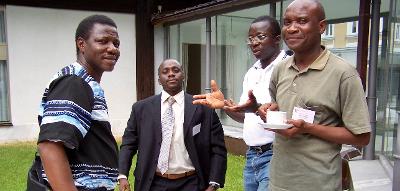
Delegates at PEN International World Congress, Bled, Slovenia, June, 2005. L to R: Remi Raj (PEN Nigeria), Dan Kayhana (PEN Uganda), Frankie Asare Donkoh (PEN Ghana), Alfred Msadala (PEN Malawi)
Hope: A Threshold of History
My wedding anniversary is June 3, but ever since the events at Tiananmen Square June 4, 1989, I merge the dates in my mind. I’m not sure why, but this year included, I made quiet dinner plans for our anniversary on June 4 by mistake. The Tiananmen memory for those who work on human rights does not recede. It isn’t visceral because I wasn’t there, but many of us watched first with hopeful attention the gathering of students and others in Beijing that spring and then in horror as the tanks rolled in.

Liu Xiaobo (with megaphone) at the 1989 protests on Tiananmen Square.
Though the Tiananmen Square protests and the names of participants like Liu Xiaobo have been struck from the internet in China and not recorded in history books for mainland Chinese students, the courage of the demonstrators and the repression of the government remain as historical facts and as memory.
Unfortunately, the memory is amplified today like a solemn tolling bell, repeating a mournful sound in places like Belarus, Venezuela, Iran, and Myanmar, where citizens push against authoritarian forces with nonviolent resistance. That bell, however, also echoes a higher enduring strain of freedom sought and won over the decades by citizens in Eastern Europe, South Africa, Chile and other countries, citizens who ultimately prevailed.
Those outside the direct struggles can remember and can support those in the resistance. For many of my colleagues, the support is through the work of PEN which campaigns for writers on the front lines. Often it is writers who are early victims since they are articulating an alternate vision to the authoritarian regime and are reporting the facts. Others open space for those who must leave their countries or lose their freedom or their lives and must work from the outside, organizations like the International Cities of Refuge Network (ICORN) which finds alternate locations for writers and artists.
In the last few months, I’ve taken this space of a monthly blog to return to posts from years past. I’ve taken a core sample as a slice of my history during that month. I do so again here and note several posts: June 2008: Back on the River, June 2009: A Time of Hopening and June 2017: Storm Cloud on a Summer’s Day. Hope is a fragile but essential tool, one that holds history together so that it doesn’t shatter on the shoals, on the disappointments and misbehaviors of humankind.
Liu Xiaobo was China’s first citizen to win the Nobel Prize for Peace in 2010, but he was in prison in China as “an enemy of the state.” Liu Xiaobo died in custody July 2017.
As I celebrate my wedding anniversary with my husband of many decades this June 3/4, I do so with the hope offered by Liu Xiaobo to his friends and fellow citizens whom he believed in when he noted in his “Final Statement:”
“I have no enemies and no hatred…Hatred can rot away at a person’s intelligence and conscience. Enemy mentality will poison the spirit of a nation, incite cruel mortal struggles, destroy a society’s tolerance and humanity, and hinder a nation’s progress toward freedom and democracy…
“For there is no force that can put an end to the human quest for freedom, and China will in the end become a nation ruled by law, where human rights reign supreme…
“Freedom of expression is the foundation of human rights, the source of humanity, and the mother of truth. To strangle freedom of speech is to trample on human rights, stifle humanity, and suppress truth.”
Since April I’ve been back on the Potomac River, sculling in the rushing waters after the spring rains, dodging logs and flotsam flowing downstream from Great Falls and beyond. I’ve been pressing into the middle of the river on hot, sultry days in June when barely a breeze stirs the air, though the current still hurries beneath the boat. I’ve been rowing beside much larger sculls from the universities, dodging the wake of the speed boats which cruise along beside the Viking-size crafts as coaches shout instructions. In my small white scull I’ve tried to hear what they call and emulate the grace and power of the collegiate oarsmen and women.
Facing forward, watching the landscape recede as I move backwards, I’ve been thinking about the past even as I plunge into the future. This perspective of the rower, driving headlong towards what he can’t see except for quick glimpses over his shoulder, is a useful one to master.I’m back in Los Angeles this week for readings and interviews and will be talking about my own earlier fiction—No Marble Angels and The Dark Path to the River. Many of the short stories in No Marble Angels are set during the Civil Rights era—the Nashville sit-ins, the Little Rock school integration, the aftermath of the ’68 riots in the cities. It was a time when ordinary citizens took extraordinary actions. It’s easy to romanticize the times, but the consequence of many of those actions changed our laws and our lives and opened up our society. The future grew out of the clarity of purpose of those who could glance over their shoulders and press towards the future even as they had to face the restrictions of their present day.
As the U.S. moves into its next era—whatever that may eventually be called—one hopes it will be a period of national and international Rights Realized.
As a young mother, I used to tell stories to my two sons constantly—on the way to school, standing in long lines anywhere, on car, plane or bike rides, on hikes. I would ask each to give me two things (people, ideas, places, plots) they would like in the story, and then I would weave the disparate ingredients into a tale. Their elements might include something like a dog, a butterfly, a battle of some sort, and a waterfall…the possibilities were open and endless, though usually there was some battle involved and some animal in most of the stories.
Over the last year and a half, partly urged by my now adult sons, I’ve committed to writing a blog post once a month. For me the process is a bit similar to the earlier exercise as I look over the month and try to wrap ideas, thoughts, events into 600 words. This month’s elements are particularly rich, probably too rich for a 600-word essay, though the literary form of the blog hasn’t been established or defined so it can, I suppose, be whatever one wants.
I began June at an International PEN Writers in Prison conference joined to the Global Forum on Freedom of Expression conference in Oslo, Norway, where the sun doesn’t set in the summer. In Oslo, activists from organizations around the globe discussed, debated, and strategized into the summer nights about the state of freedom of expression around the world and the mechanisms to protect it. Everyone understood that societies without this freedom are most often without political and civil freedoms as well so the defense of freedom of expression is the front line.
The timing of the conference coincided with the 20th anniversary of the crackdown in Tiananmen Square in China. This year of 2009 is also the 20th anniversary of the popular uprising against the military government in Burma/Myanmar after the election of Aung San Sui Kyi, who was re-arrested this May; it is the 20th anniversary of the fatwa in Iran against Salman Rushdie after the publication of The Satanic Verses, and it is the 20th anniversary of the fall of the Berlin Wall.
The year 1989 was a threshold year. So where have we come twenty years later?
After Oslo, I went briefly to Paris en route to Normandy, where the 65th anniversary of the World War II invasion was being celebrated. I was headed to Normandy for a bike trip through the countryside and the historical sites, not for the official celebrations, but I was in Paris the day President Obama and his family arrived. It was also the day of the men’s semi-finals of the French Open in tennis. (You see the elements of this blog complicating…)
Driving back to the hotel after Federer beat Del Potro and Soderling beat Gonzalez, I was talking in my broken French with the taxi driver talking in his broken English about the matches and about the arrival of Obama and about world politics in general. The driver was ebullient—an oxymoron perhaps for a French taxi driver—but he was ebullient nonetheless.
“The world…the U.S…France…Europe…it is hopening,” he said, gesturing with his arms, trying to explain what he meant about the opening he saw in the world and the hope he felt. “We have hopening between us!”…[cont]
June 2010: Summer Reading: Under a Tree With a Book
Summer has come with hot, steamy breath in Washington this year—already days nearing 100°. Even with the sudden flash of thunderstorms, the air clears only to steam up again. So much for my assurance to a newcomer that summer wasn’t so bad here, though maybe we will pay our dues in June and be rewarded with the summer breezes and cool evenings in July. August, we know, will be hot.
In the dog days it is a time to be indoors, or at least in the shade—biking along the Potomac or sculling on the river only early in the morning or as the sun is setting. Indoors or under the shade of a tree, it is a time to read.
Summer reading—the term brings back delicious childhood memories even of hot Texas summers where I would find a patch of shade in the back yard and lose myself in a book, or bike to a nearby pool and sit reading between laps, or curl up in a chair under the fan on the screened porch. I can still smell the mowed grass and the sweet fragrance of white gardenias on the bushes just outside.…[cont]
June 2011: Mockingbirds at Fort McHenry: A Tribute to Elliot Coleman
(The excerpt below is from a larger article about the poet and teacher Elliott Coleman in the recent Fortnightly Review:)
I was 20 years old, applying to Johns Hopkins graduate Writing Seminars from a small Midwestern college. I had come to campus to meet Elliott Coleman, the director and founder of the program. He had read my application and invited me to lunch at the Faculty Club. Looking back now and understanding the processes of application and the competition for a position in the Writing Seminars, I realize how remarkable his attention was, but he showed that kind of attention to students, making each feel important and valued.
I had sought out his work before I came to Baltimore. I no longer remember how I found the slim volumes of poetry in my remote college town before online ordering, but I did, and I had read his book of poems Mockingbirds at Fort McHenry. When I spoke about those poems, he was genuinely humbled and surprised that I had made the effort to read his books.
He asked, “Would you like to go see Fort McHenry?” That afternoon, the student showing me around drove us all out to Fort McHenry, and I walked around the area with Elliott Coleman as he talked about poetry and the genesis of his poems. I’m sorry I didn’t write down what he said, or if I did, I can no longer find the notes of that afternoon. But I knew then that Hopkins was where I wanted to be if I had the chance, and even though I was a fiction writer, I wanted to study with Elliott Coleman. Fortunately, I got that opportunity.
Elliott Coleman radiated a gentleness, a caring and a humility that shed light, illumining those around him. He didn’t seek the center of attention; he didn’t draw the spotlight to himself, rather he shined so that light fell on others.
From Mockingbirds at Fort McHenry:
Through a window in Tunis the green searolls its light. A few square white houses dazzle the Atlas mountains, the color of lions and honey. This foothill is hardly Africa; this bay is hardly Mediterranean. They partake of each other by reflection, absorbed as they are in the depths of space.
I recently engaged with facebook (no, I didn’t buy stock), but I gave in. I concluded that I needed at least to understand (is that possible?) and experience the social media phenomena and at most learn from and enjoy the connection to friends and colleagues, most of whom I know, but some of whom I just read and some of whom read me.
For the last three months I’ve checked my “wall” every few days and scroll through hundreds of shared observations, photos, and comments. The process is surprisingly quick. I engage more like a magazine editor with an unexamined metric for judgment, pausing to “like” certain contributions, commenting on a few and sharing even fewer on my own personal and authors’ facebook pages.
For the present at least I’ve limited my fb world and page largely to literature and human rights in order to put some boundary on the possibilities and on that evaporating commodity of privacy–not a 21st century value and an oxymoron in a discussion of facebook. That is not to say I don’t enjoy the news and photos and commentary on a range of issues from all the friends, but in my fb space, this is my focus for now.…[cont]
June 2013: No blog posted
June 2014: No blog posted
June, 2015: What Are You Not Reading This Summer?
I was recently sent a questionnaire as part of a profile asking me what I was reading:
I find myself reading several books at the same time. I just finished Phil Klay’s Redeployment today, am reading Jennifer Clement’s Prayers for the Stolen, am re-reading Graham Greene’s The Comedians, re-reading Kate Blackwell’s you won’t remember this and can’t leave this question without noting Elliot Ackerman’s Green On Blue. Because I read both e-books and paper books, I move around among narratives easily.
The answer was a snapshot in reading time, indicative of the pleasure of dancing among narratives. I find myself enjoying on several platforms the movement 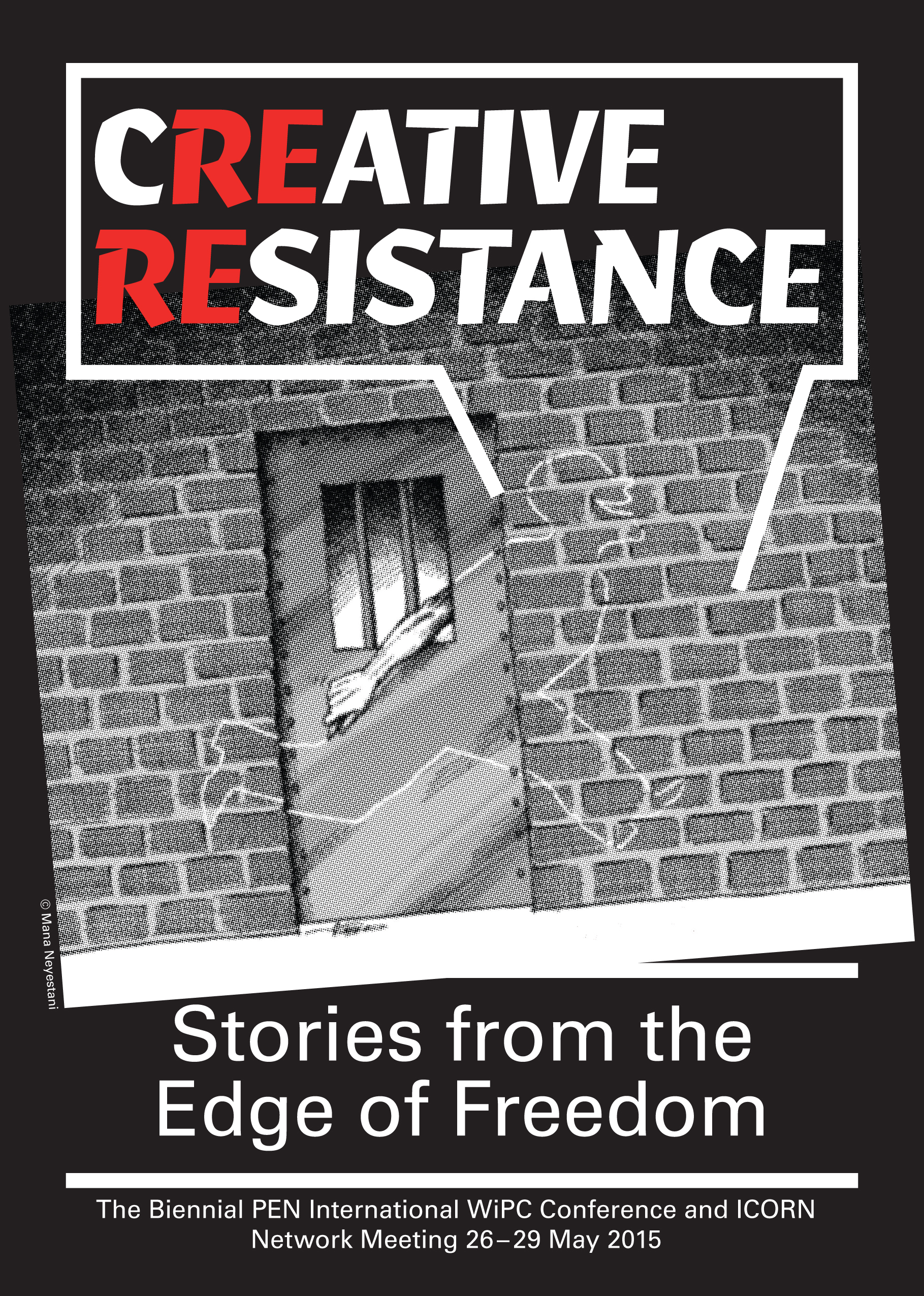 between hard-edged, nuanced stories of war and its aftereffects in Klay’s Redeployment and Ackerman’s Green on Blue, the harsh and surprising world of Clement’s indigenous Mexican women in Prayers for the Stolen and the gentle, but no less desperate stories of Southern women trying to find their lives in Kate Blackwell’s you won’t remember this, a collection recently re-published by a new small press—Bacon Press—in paperback. Graham Greene is a master who I am always re-reading, appreciating how he integrates the international world of politics and deceit with compelling narratives set around the world.
between hard-edged, nuanced stories of war and its aftereffects in Klay’s Redeployment and Ackerman’s Green on Blue, the harsh and surprising world of Clement’s indigenous Mexican women in Prayers for the Stolen and the gentle, but no less desperate stories of Southern women trying to find their lives in Kate Blackwell’s you won’t remember this, a collection recently re-published by a new small press—Bacon Press—in paperback. Graham Greene is a master who I am always re-reading, appreciating how he integrates the international world of politics and deceit with compelling narratives set around the world.
Recently I returned from PEN International’s biennial Writers in Prison conference and the International Cities of Refuge Network (ICORN) meeting, a gathering this year in Amsterdam focused on Creative Resistance, a gathering of over 250 individuals from 60 countries around the world who work on behalf of writers threatened, imprisoned and killed for their writing. I remain conscious of these voices too. They occupy a kind of negative space—those we are NOT reading, not able to read because they are not able to write.
The list unfortunately is long, and many individuals stand out for me, but I will highlight two here. Though I couldn’t read either because of language differences, I read with attention their cases and link here to actions that can be taken on their behalf:…[cont]
June 2016: No blog posted.
June 2017: Storm Cloud on a Summer’s Day
It is an almost perfect summer day—the sun is shining in a white cloud sky; the air is warm, not yet sweltering. Light filters through white umbrellas shading diners at the outside restaurant by the park. On this almost perfect New York day I am thinking about the rulers in China who have imprisoned for the last nine years one of the country’s courageous thinkers for ideas that will outlast him and his jailers.
Today it was announced Nobel laureate Liu Xiaobo is in critical condition, on medical parole having been given a terminal diagnosis. As a principal author of Charter’08 which advocates for nonviolent democratic reform in China, Liu Xiaobo, writer, critic and activist has lived his life as a man of ideas.
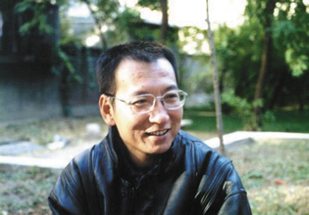
As the sun shifts above me, skirting over skyscrapers, finding a gap between the umbrellas and spreading over my table, I consider the trajectory and the life of an idea as it dawns, unfolds, iterates, then flies off where it is embraced, where it empowers and takes on a life of its own. Ideas are connected to, but not owned or encumbered by, those who articulate them.
The fallacy—the fundamental fallacy—of the rulers in China and elsewhere lies here. No one can imprison ideas. No one can manage or own the imagination of another. Government leaders can physically restrain with the hope that the idea will die, but in the case of Liu Xiaobo, the ideas behind Charter ’08, which was signed by more than 2000 Chinese citizens from all walks of life, endure. These ideas calling for a freer society continue to grow wings, often quietly, but sometimes even more quickly as the physical confines grow harsh.
“Any man or institution that tries to rob me of my dignity will lose,” declared Nelson Mandela. It is an injunction worth noting.
June 2018: No blog posted.
June 2019: [Beginning in May, 2019 I started writing a retrospective of work with PEN International for its Centenary so posts were more frequent in 2019-2020. In June 2019 there are two posts in the PEN Journeys and in June 2020 there are four.]
June 2019: PEN Journey 3: Walls About to Fall
Our delegation of two from PEN USA West—myself and Digby Diehl, the former president of the Center and former book editor of the Los Angeles Times—arrived in Maastricht, The Netherlands in May 1989 for the 53rd PEN International Congress. We joined delegates from 52 other centers of PEN around the world, including PEN America with its new President, fellow Texan Larry McMurtry and Meredith Tax, founder of what would soon be PEN America’s Women’s Committee and later PEN International’s Women’s Committee. Meredith and I had met at the New York Congress in 1986 where the only picture of the Congress on the front page of The New York Times showed Meredith and me in the background at a table taking down the women’s statement in answer to Norman Mailer’s assertion that there were not more women on the panels because they wanted “writers and intellectuals.” Betty Friedan argued in the foreground.

Front page of the New York Times, 1986. Foreground: left – Karen Kennerly, Executive Director of American PEN Center, right – Betty Friedan, Background: (L to R) Starry Krueger, Joanne Leedom-Ackerman, Meredith Tax.
Over the previous months the two American centers of PEN had operated in concert, mounting protests against the fatwa on Salman Rushdie and bringing to this Congress joint resolutions supporting writers in Czechoslovakia and Vietnam.
The theme of the Maastricht Congress—The End of Ideologies—in large part focused on the stirrings in Eastern Europe and the Soviet Union as the region poised for change no one yet entirely understood. A few weeks earlier, the Hungarian government had ordered the electricity in the barbed-wire fence along the Hungary-Austrian border be turned off. A week before the Congress, border guards began removing sections of the barrier, allowing Hungarian citizens to travel more easily into Austria. In the next months Hungarian citizens would rush through this opening to the West.
At PEN’s Congress delegates from Austria and Hungary sat a few rows apart, separated only by the alphabet among delegates from nine other Eastern bloc countries which had PEN Centers, including East Germany. This was my third Congress, and I was quickly understanding that PEN mirrored global politics where writers were on the front lines of ideas and frequently the first attacked or restricted. Writers also articulated ideas that could bring societies together.…[cont]
June 2019: PEN Journey 4: Freedom on the Move: East to West
I have attended 32 International PEN Congresses as president of a PEN Center, often as a delegate, as Chair of the International Writers in Prison Committee, as International Secretary and now as Vice President. The number surprises me when I count. The Congresses have been held on every continent except Antarctica. Many were grand affairs where heads of State such as Vaclav Havel in Czechoslovakia, Angela Merkel in Germany, Abdoulaye Wade in Senegal greeted PEN members. Some were modest as the improvised Congress in London in 2001 when PEN had to postpone the Congress planned in Macedonia because of war in the Balkans. PEN held its Congress in Ohrid, Macedonia the following year. At these Congresses writers from PEN centers all over the globe attended. Today PEN International has centers in over 100 countries.
Among the more memorable and grand was the 54th PEN Congress in Canada, held in September 1989 when PEN still held two Congresses a year. The Canadian Congress, staged in both Toronto and Montreal by the two Canadian PEN centers, moved delegates and participants between cities on a train. The theme—The Writer: Freedom and Power—signaled hope at a time when freedom was expanding in the world with writers wielding the megaphone.…[cont]

54th PEN Congress in Canada, 1989. Front row: WiPC chair Thomas von Vegesack, Joanne Leedom-Ackerman and PEN USA West Executive Director Richard Bray. Back row: Digby Diehl (right) and other delegates.
June 2020: PEN Journey 30: Barcelona: A Surprise
I was having lunch with my husband at a Georgetown restaurant in Washington, DC on a Saturday in May, 2004. I was due to fly out the next day for Barcelona to attend International PEN Writers in Prison Committee’s 5th biennial conference, part of a larger Cultural Forum Barcelona 2004. My husband and I were talking about our sons—the oldest was getting a PhD in mathematics and was also training for the 2004 Olympics as a wrestler, hoping to make the British team. (He had dual citizenship.) The younger, recently graduated with an advanced degree in International Relations, had just deployed to Iraq as a Marine 2nd Lieutenant and was heading into a region where the war was over but the insurgency had begun. It was an intense time for our family, yet as parents there was not much we could do except to be there, cheering for our oldest at his competitions and writing letters and sending packages and prayers for our youngest. It was a time when as parents we realized our children had grown beyond us and were taking the world on their own terms.
I was planning to be away for the week in Barcelona where PEN members from around the world were gathering for the Writers in Prison Committee (WiPC) and Exile Network meetings. Carles Torner, PEN International board member, chair of PEN’s Translation and Linguistic Rights Committee and former President of Catalan PEN, had helped arrange International PEN’s participation and funding as part of the Universal Forum of Cultures—Barcelona 2004. This would be the largest WiPC conference to date with delegates from every continent and multiple speakers and side events.
Carles, a poet, fluent in PEN’s three official languages English, French and Spanish, was one of the highly respected, organized and talented PEN members. He’d also been involved in the years’ long reformation of PEN International. As members looked to who could be a strong replacement for the current International Secretary when Terry Carlbom’s term ended in a few months, there was widespread enthusiasm for Carles to stand for the office. I was among the enthusiasts.
My phone rang at that Saturday lunch. International PEN Board member Eric Lax, already in Barcelona for meetings, said he had news and a question; he told me he was calling on behalf of others as well. The news: the Catalan government had also recognized Carles’ talents and had offered him a position as Director of Literature and Humanities Division at Institut Ramon Llull to promote Catalan literature abroad. A father of three, Carles had accepted this paid position which meant he couldn’t stand for PEN International Secretary, an unpaid position. He wouldn’t have the time for both, and there would be conflicts of interest.
Eric asked if I would allow myself to be nominated. A number of members and centers, including the two American centers, were asking, he said. PEN’s Congress where the election would take place was only a few months away in September and nominations were due soon. I was flattered but said no for a number of reasons. Eric asked that I not answer yet, just come to Barcelona, talk with people and let them talk with me.…[cont]
June 2020: PEN Journey 31: Tromsø, Norway: Northern Lights
The week before PEN’s 70th World Congress in Tromsø, Norway in the Arctic Circle, my oldest son competed in the Athens 2004 Olympic Games, the only wrestler to qualify for TeamGB (Great Britain). He had dual citizenship and was the first British champion to qualify for the Olympics in wrestling in eight years. In his sport, there was no seeding of competitors; instead, after making weight, each wrestler reached into the equivalence of a hat and drew their first round competitions. True to his history, my son drew the best opponents. As one news commentator noted: “Coming to the mat is Nate Ackerman, born in the US, wrestling for Great Britain, getting his PhD in mathematics at the Massachusetts Institute of Technology…but that won’t help him now as he faces the three-time World Champion from Armenia.” My son lost to the Armenian wrestler. His other opponent was the world bronze medalist from Kazakhstan who went on to win the silver medal at the Olympics. Though my son didn’t win either match, he also didn’t get pinned, and he wrestled nobly. The Olympic Games in Athens was a magical time.
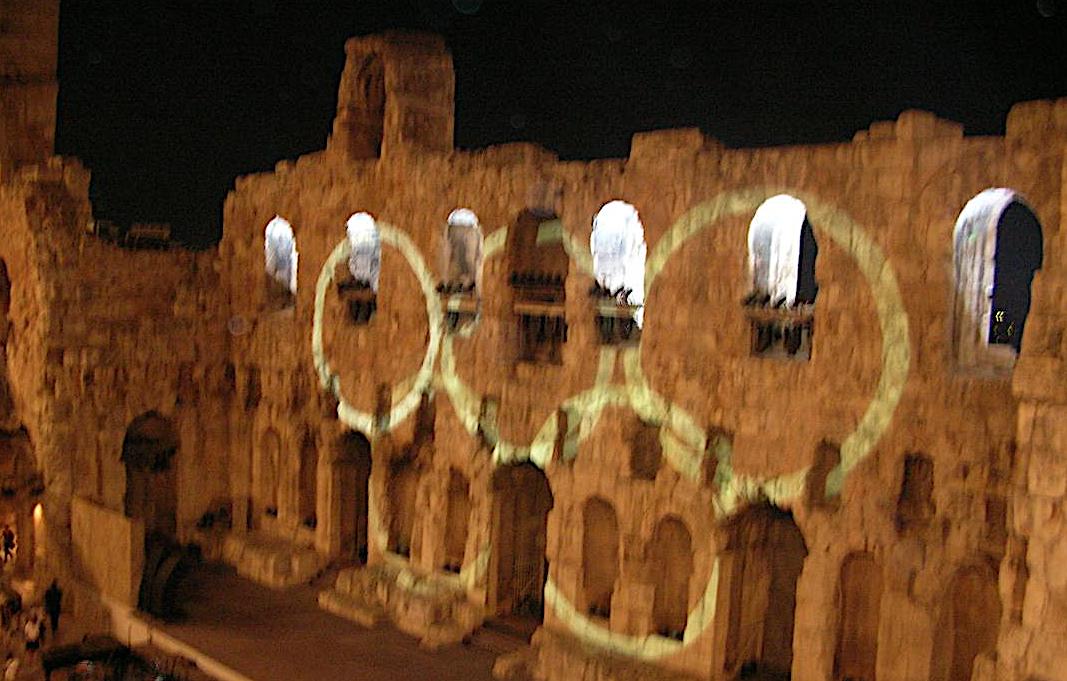
Olympic circles projected in light on the Acropolis at the 2004 Olympic Games in Athens
I was heading to Tromsø with a smile inside, though behind my smile was also a quiet attention that never left me for my youngest son, a Marine, was in Anbar Province, Iraq that summer, patrolling in 120° and alert for IED’s and snipers along the roadside. He had missed his brother in the Olympics and his brother missed being able to talk with him.
As I changed planes in northern Europe, I realized I was going to need a coat in the Arctic Circle and bought a light foldable one at an airport shop which I took to a decade worth of PEN Congresses after. On the plane I reviewed the stack of PEN papers and resolutions.
I was arriving at the Congress having agreed to stand for International Secretary. (See PEN Journey 30). The other PEN member standing was Giorgio Silfer, a poet and playwright and president of Esperanto PEN.
Norwegian PEN hosted over 300 writers, editors, and translators from at least 60 countries for the 70thWorld Congress whose theme was Writers in Exile—Writers in Minority Languages. The Rica Arctic Hotel where we stayed and met was an easy walk to the small downtown of Tromsø, capital of northern Norway, well above the Arctic Circle and called “the Paris of the North.”…[cont]
June 2020: PEN Journey 32: London Headquarters: Coming to Grips
PEN is a work in progress. It has always been a work in progress during its 100 years. Governing an organization with centers and members spread across the globe in over 100 countries can be like changing clothes, writing a novel and balancing a complex checkbook all while hang gliding. Perhaps an exaggeration, but not by much.
In 2004 the leadership of President and International Secretary were at the center of the governing structure along with the Treasurer and a relatively new Board. The President represented PEN in international forums. The International Secretary was tasked with overseeing the office and the centers of PEN and with any tasks the President handed over like running board meetings and setting up the agenda for work. The concept was that PEN should be able to elect as President a writer of international stature to represent PEN in global forums but not have the obligation to run the organization. That could be the role of the International Secretary, along with the Board and staff.
When I assumed the role of International Secretary, PEN did not yet have an executive director, though the consensus had built from the strategic planning process that we needed one. Both the President and International Secretary were volunteer, unpaid positions, which meant they were not full time. At the post-Congress board meeting after Tromsø, we agreed to begin a search for an executive director.
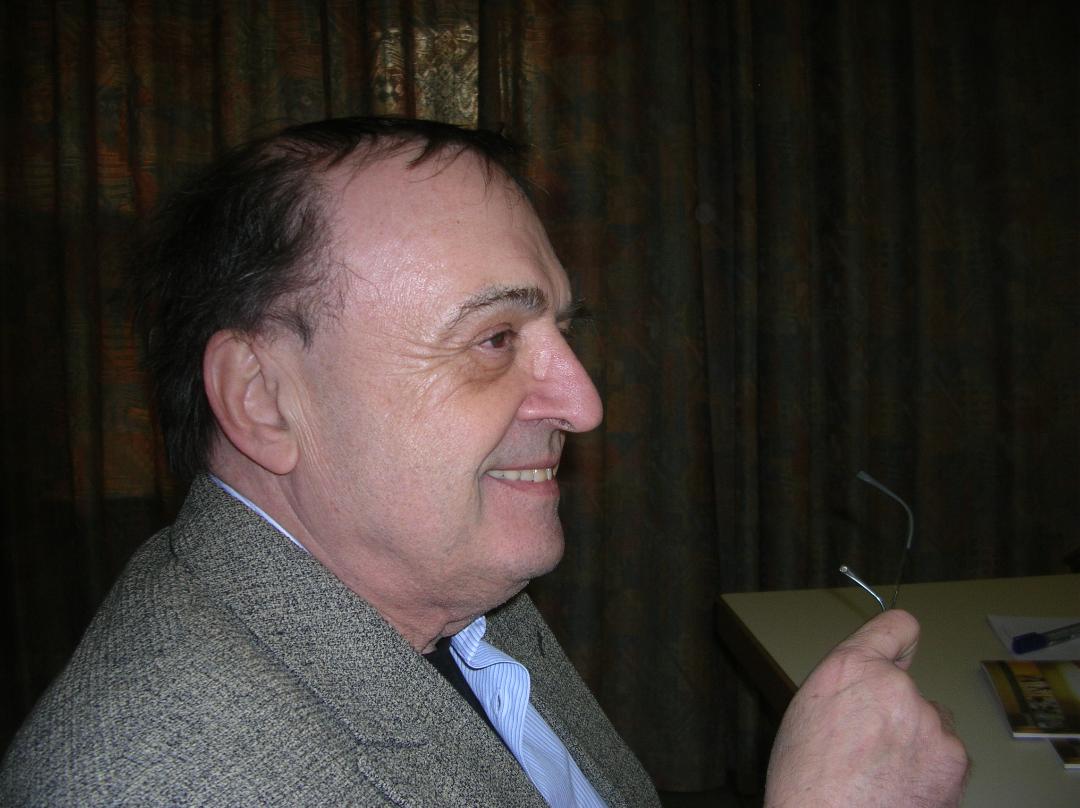
International PEN President Jiří Gruša
I suggested monthly board meetings, which had not been the practice. We could do these by phone, which meant there were only a few hours a day when everyone would be awake. If Judith Rodriguez in Melbourne, Australia could stay up past 11pm and Eric Lax in Los Angeles didn’t mind waking up at 7am, the rest of us—Takeaki Hori in Japan, Sibila Petlevski in Croatia, Eugene Schoulgin in Norway, Elisabeth Nordgren in Finland, Cecilia Balcazar in Colombia as well as President Jiří Gruša when he joined from Vienna or Prague and me in Washington, DC or London—could find our time zone and call in. The technology was not as sophisticated as today, and we didn’t yet use skype so the calls were not cheap, but we began to manage each month.…[cont]
June 2020: PEN Journey 33: Senegal and Jamaica: PEN’s Reach to Old and New Centers
A few days before I flew out to Dakar, Senegal for a PEN conference in November 2004, my youngest son, a Marine in Iraq, called and told my husband and me that we would not hear from him for a while. We knew, without being told, that the U.S. and British troops were likely about to return to Fallujah, the center of the insurgency. Civilians there had been advised to get out of the city, and they were leaving.
On the opening day of the PEN conference in Dakar, November 7, 2004, the battle for Fallujah began. The headlines in the newspapers in Dakar were about the civil war raging in neighboring Ivory Coast so I was not reading about Iraq during the five-day PEN Africa meeting. In 2004 there were no iPhones or phone news feeds and rare coverage of the Middle East was on the evening news. I was quietly attentive each day and prayerful and focused on PEN’s work.
I have modest notes from the first PAN Africa conference, but I have some of my most vivid memories, most particularly of the people I met and of my first trip to Gorée Island just off the Senegalese coast opposite Dakar, a place of its own historic upheaval. Gorée Island was the site of the largest slave-trading center on the African coast from the 15th to the 19th century, ruled successively by the Portuguese, Dutch, English and French. The dungeons and portals to the sea where men and women and children were sent out in chains still stood along with the stucco houses of former slave traders.
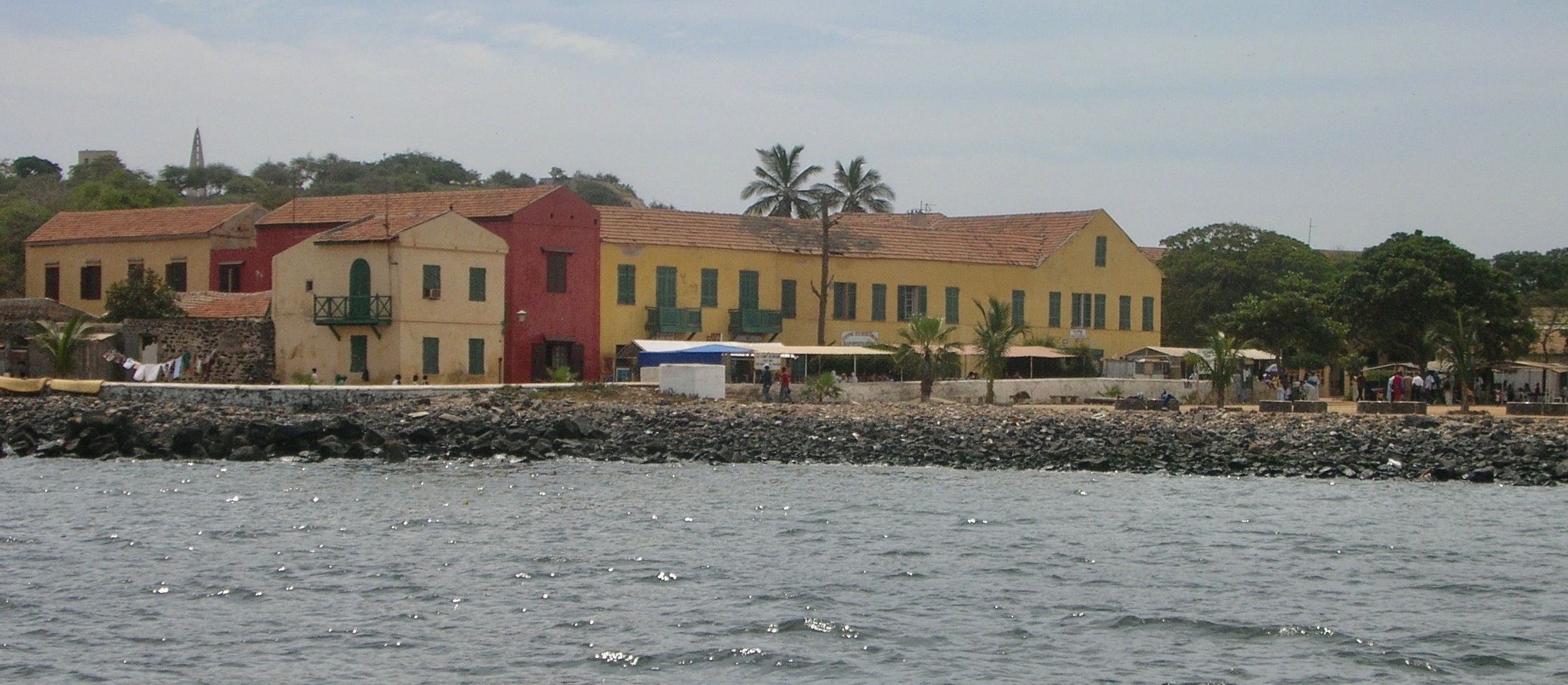
Gorée Island, site of slave trading in 15-19th centuries, off coast of Dakar, Senegal
A tall Gambian doctoral student assisting Senegalese PEN guided a few of us around Gorée. Fluent in French, English and Spanish, he was writing a doctoral thesis on the secrets of history and myth in the epic of Kaabu according to Mandingo oral traditions—clearly a future PEN member. Thoughtful, knowledgeable, he spent the day sharing history. During and after the Dakar meetings, our paths crossed in subsequent PEN conferences and congresses, and we know each other still. Dr. Mamadou Tangara earned his doctorate at the University of Limoges in France shortly after and eventually became the Gambian Permanent Representative to the United Nations. During Gambia’s constitutional crisis in 2016-17, he and other diplomats called for the president to step down peacefully; he was dismissed, but when power changed hands a few months later, he was reappointed as Minister of Foreign Affairs for the Gambia. The friendship with Mamadou Tangara remains and is one of my many valued friendships from PEN.
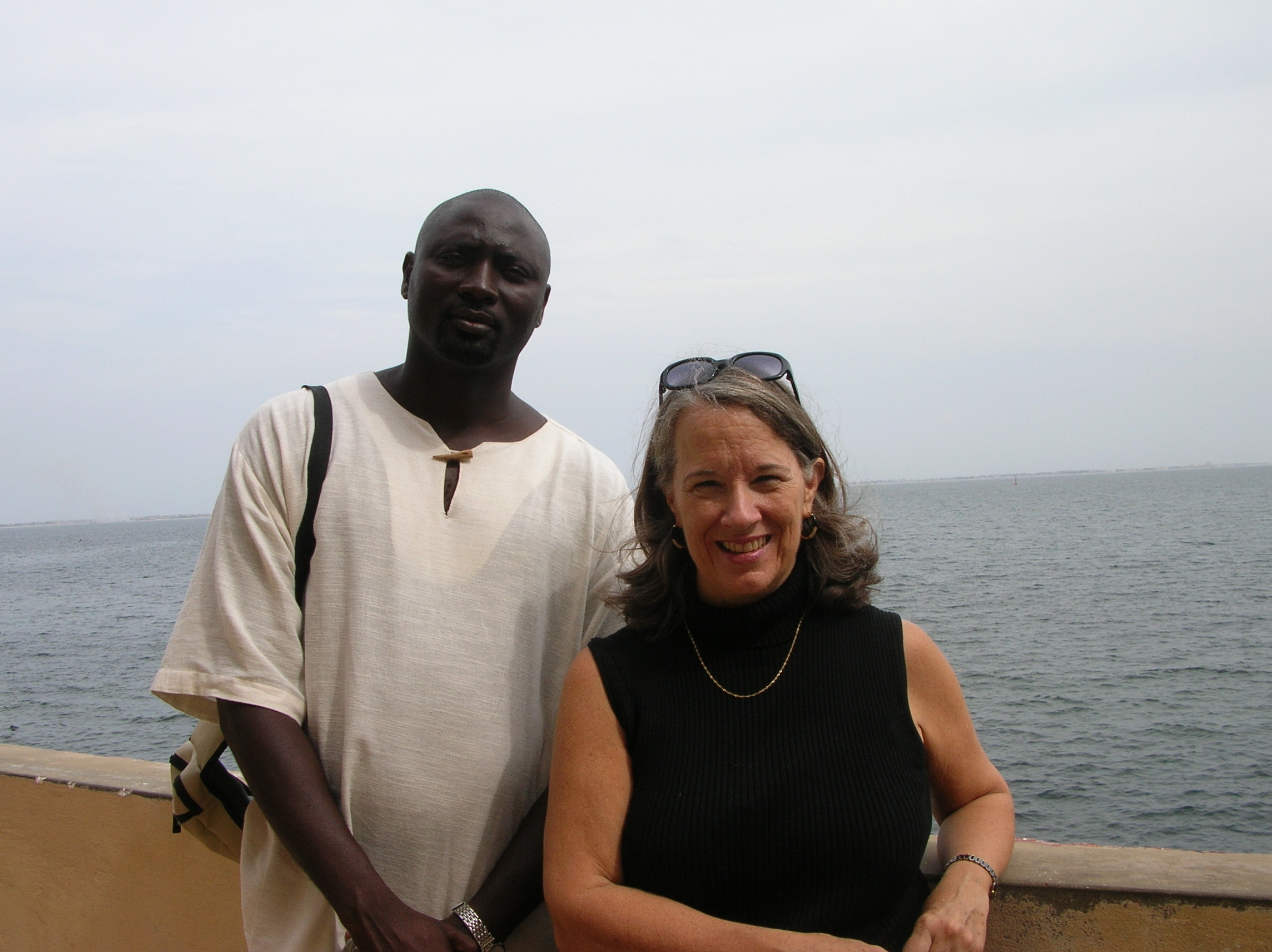
Mamadou Tangara (Gambia) and Joanne Leedom-Ackerman (PEN International Secretary) on Gorée Island at PEN’s 2004 Dakar conference
Mamadou’s mentor at the time was an older Gambian journalist and editor Deyda Hydara, who joined PEN members from more than a dozen African centers in this conference to prepare for PEN’s first PAN African World Congress in Senegal in 2007. The Congress would be PEN’s first in Africa since the 1967 Congress in the Ivory Coast when American playwright Arthur Miller was International PEN President. Though the Gambia didn’t yet have a PEN Center, Deyda was planning on starting one. At the time Deyda Hydara was co-founder and primary editor of The Point, a major independent Gambian newspaper. He was also correspondent for AFP News Agency and Reporters Without Borders and was an advocate for press freedom and a critic of his government’s hostility to the media.
A month after PEN’s Dakar conference, the Gambian government passed a bill allowing prison terms for defamation and another bill requiring newspaper owners to purchase expensive operating licenses and register their homes as security. Deyda Hydara announced his intent to challenge these laws. Two days later on December 16, 2004 Deyda Hydara was assassinated on his way home from work. To this day his murder remains unsolved. The following year Deyda Hydara won PEN America’s Freedom to Write Award posthumously and later the Hero of African Journalism Award of the African Editors Forum.…[cont]
Around the World in Thirteen Years…
Slowly we are emerging from the pandemic year(s) though we are all still mostly in digital mode. Colleagues at home and abroad are squares on a screen with various backgrounds—real and virtual bookcases and vegetations, some, as I myself, often simply snapshots at our best. Unless you need to present, it is often easier to turn off the video camera and listen and participate in a meeting without worrying about sitting up straight.
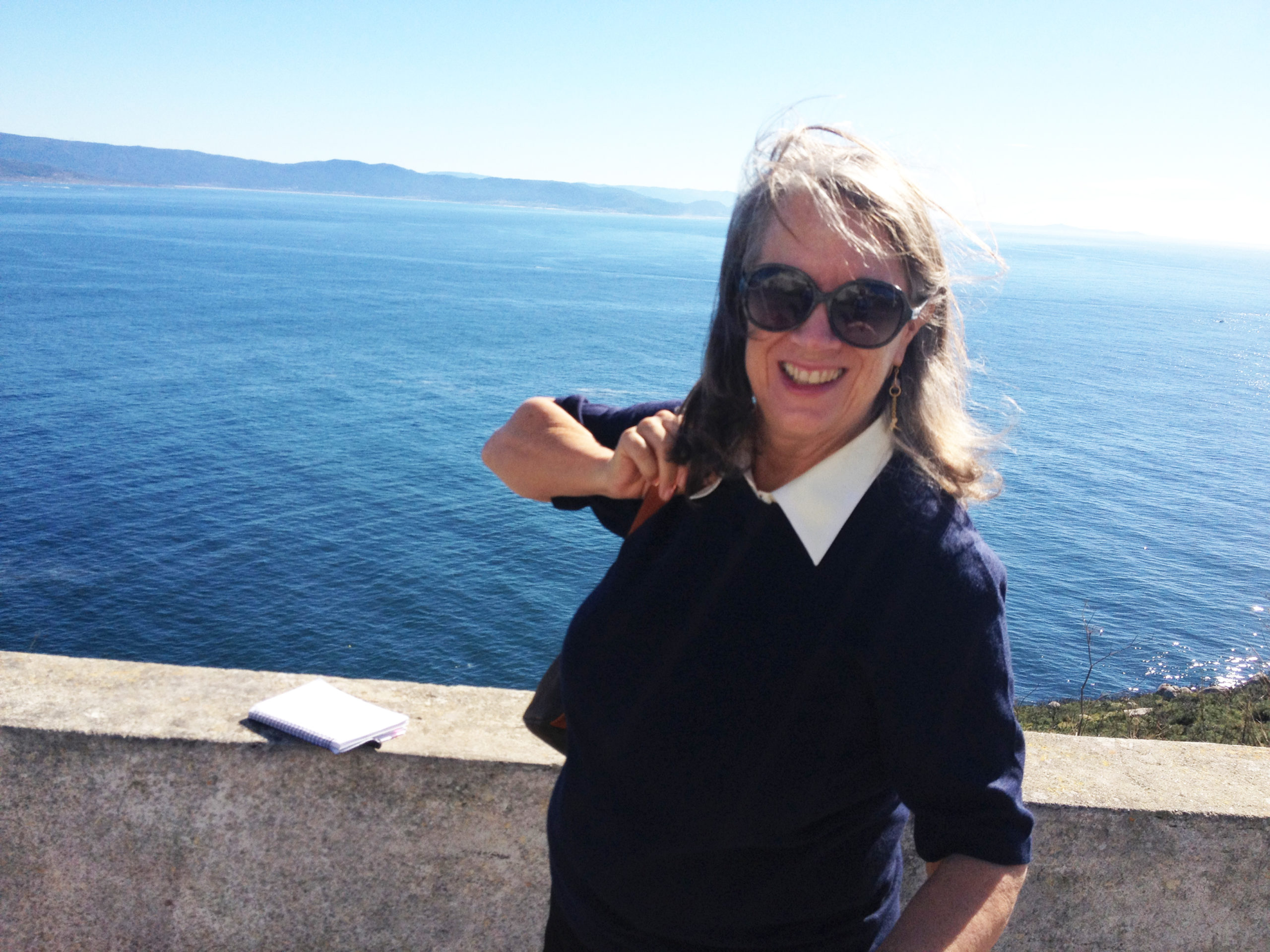
Photo credit: Joanne Leedom-Ackerman
My screen shot is a reminder of times past as I’m standing by a wall above the Atlantic Ocean at Cape Finisterre, Spain, wind blowing my hair, wearing dark glasses, my pad of paper and pen at hand. Finisterre was where the ancients thought the world ended as they looked westward over the vast Atlantic Ocean.
But that is another story, one from a time when I thought the world’s connections were a given, not relegated to cyber.
For this monthly blog post, I’ve taken a core-sample of posts written in May since the blog began in 2008. If you’re interested, you can click the title and read the full post. The journey is through time and geography, ranging from Hong Kong to London to Krakow to Tunis to Tehran to Istanbul to San Miguel de Allende and Mexico City, to Bellagio and in the U.S. to Chicago and Washington, DC. With the exception of the post focused on a prisoner in Iran, I was in each city working, at conferences or researching or otherwise engaged in the places over the last 13 years. It seems a bit of a lifetime ago when the world was so easily transited.
May 2008: China from the 22nd Floor
On June 4 China will face the 19th anniversary of the killing of citizens occupying Tiananmen Square. Nineteen years ago as president of PEN USA, I remember well sorting through dozens of unfamiliar Chinese names as we sought to untangle what writers had been arrested. Today there are at least 42 writers imprisoned in China.
I wake up 22 stories in the air. Most of Hong Kong is in the air with thousands of high rises shooting into the sky. I’m in a cubicle—two small beds pressed against each wall, a tiny shelf between, a TV mounted on the wall at the foot of one bed. At the head of the bed is a large window so the room is airy and looks out on other windows in the sky.
I wake in the middle of the night because of jet lag and then again early in the morning before the sun rises. I turn on the TV whose screen flashes the financial news of Hong Kong—the major world indices, Hong Kong currency exchange rates, global gold prices, Hong Kong stock market prices, statistics on which the financial world relies, accompanied by jazz and elevator music. The only news channel on this hotel TV is the Chinese Broadcasting Company from the mainland; it broadcasts the mainland government’s view of the news…[cont]
May 2009: The Talking City–A Birthday Tribute (or) Tiananmen Square and the Fourth of July
I live in a political town, probably the most political city in the US. Debate and policy forums run all day and all night. Any day of the week you can find and attend debates on what should be done about North Korea, Iraq, Afghanistan, the Middle East, China, the economy in general—interest rates, taxes, trade and monetary policy; the economy in specific–the automobile industry, the oil industry; U.S. domestic policy in general—state vs. federal; US domestic policy in specific–abortion, health care, gay marriage, public education.
Washington likes to talk. Everyone has an opinion about almost everything, and you can hear those opinions formally at the think tanks and forums around town, on the cable news and talk shows, or in the restaurants and cafes. In the evenings at the receptions, the book parties, the embassy parties, the talking continues.
At the center of all the debate and discussion are the legislators, the executives and the President who will make the decisions after the talking is done, or more often while it is still going on…
I originally set out to write a blog about the upcoming 20th anniversary of the student protest and subsequent massacre in Tiananmen Square in Beijing on June 4; however, having taken this detour into Washington, I will stay there and appreciate the ability to talk and talk and talk and debate. Even though the plethora of opinions can wear one down after a while, it is possible to turn off the TV, decline the forum invitations, take a discussion of a novel to the receptions and remain watchful and grateful that there are so many opinions, so many involved citizens and officials and so many diverse policies to choose from…[cont]
May 2010: Introducing Isabel Allende
PEN Faulkner: Discovering Stories That Need to Be Told
From my introduction of Isabel Allende at the Washington National Cathedral
Isabel Allende has been called “a literary legend,” a “cultural bridge builder” and one of the most influential Latin American women leaders, but she is also like a good friend with whom you take off your shoes, curl up on the sofa and figure out life together.
I first met Isabel Allende over 20 years ago in Los Angeles when she was giving a reading. I was involved with PEN, who may have been co-sponsoring the program—I no longer remember—but I remember attending a powerful evening with my colleagues. For the past months I’ve been absorbed in continuing my reading of Isabel Allende, and I can confirm that I am one of her good friends—though she may not know this. But as a reader, I have the feeling I am not alone in this club, or tribe, because if you immerse yourself in her fiction and memoirs, you not only feel you know her from her easy and confidential prose, but you think she surely knows you because of her insights into life. And even if she doesn’t, you feel she might want to know you and then let you move into the tribe of people she collects around her…[cont]
May 2011: Memorial Day—Rolling Thunder and Beyond
When I began this blog, I promised…who? myself mostly, a few friends, family that I would post once a month. Most of the months I’m burrowing away on fiction, on the long process of writing a novel—writing, rewriting, thinking, rethinking. It is a different discipline to pull away from that marathon of 400+ pages and sprint to the end of the block with 4-600 words that have some cohesion and at least one idea worth passing on. I tend to put off this arbitrary deadline till the very end of the month.
So…this is a rather long throat-clearing on Memorial Day, a hot, steamy day in Washington, a day with the sun full and unobstructed in a clear blue sky. I’ve finished my fiction writing and now have the remainder of the afternoon to write May’s blog post. This space often focuses on issues abroad, but today I’d like to focus on Memorial Day, a time in Washington when Rolling Thunder motorcycle bikers roar through the streets to memorialize Vietnam and all vets and where flags fly at half mast to honor those who have died in wars.
Memorial Day was perhaps first celebrated in the U.S. in 1865, right after the American Civil War by freed African slaves in South Carolina at the grave site of Union soldiers. The African Americans honored the Union soldiers who fought to help win their freedom. Originally called “Decoration Day,” the event was declared a national observance in 1868 with a date specifically set that was not the anniversary of a battle. Both North and South had lost hundreds of thousands of men in the Civil War, but by the end of the next decade the national memorial observances honored those from both the Blue and Gray states.
The honoring of veterans who have given their lives in war through the centuries is an occasion, solemn and celebratory with speeches, politics, picnics and some reflection. As the U.S. begins pulling out of war zones, it is also a time to consider what journey we have been on—where it is yet going, where it has taken us and where it has taken others outside our borders. War cannot be completely bound by borders nor by time frames for war impacts history and the future of us all….[cont]
May 2012: History, Hope and Politics: London Before the Olympics
I’m back at Sticky Fingers restaurant in London on a gray, drizzling Sunday afternoon, visiting this site of our family’s youth, sitting in a red leather booth with a dark wood table, wooden blinds over the windows, rock and roll rhythms from the sound system, and Rolling Stones memorabilia covering every inch of wall space. This spot is down the road from where we lived in London in the 1990’s and where I used to sit writing most afternoons before my children joined me on their way home from school. I return here almost every time I visit London.
Today the booths are filled with other parents and children chattering and eating hamburgers and fries and salads on this bank holiday weekend. The management has changed; they no longer know me, but they are still accommodating, letting me sit in a booth with good light, working as long as I like.
Outside Sticky Fingers, London is preparing for this summer’s Olympic Games with new construction dotting the landscape. One of my other favorite restaurants I went to visit has been demolished and is now a construction site for a new hotel, with men working frantically in the hope of opening by July. In the City of London itself a hotly contested election has just concluded for the Mayor who will preside over the Olympic Games with the incumbent conservative winning, barely.
Across the Channel today, the French are voting on who will govern France, though the Olympics have no influence there. After all France lost the Olympic bid as any Brit will remind you. The political tuning fork of Europe is vibrating this spring between the conservative and socialist paths of governance. (By Sunday evening it was clear the Socialists and anti-austerity electorate had won in France and in Greece though it wasn’t clear how the economic realities would square with the political will or how the European monetary Union might calibrate.)
In the theaters of London which tourists come to see, a third of the dramas focus on World War I or World War II as the historic reference point when the nations of Europe broke into conflict.
However, in the present, London is concentrating on the summer games as it anticipates the world’s nations and athletes gathering, independent of political and economic differences. For two weeks in late July and August London will showcase competition in its most elegant, accomplished and constructive form in the XXX Olympic Games. What happens after that…well, that will be another story….[cont]
May 2013: Living In and Beyond History
The white horse-drawn carriages clomp on the gray stones of Old Town Krakow, circling this largest of medieval town squares in Europe. On the fringe sit restaurants with white and yellow umbrellas advertising Polish beers where residents and tourists dine on red-checked table cloths. In the center the Town Hall Tower dominates, and around the periphery old terraced houses and shops form an arcade where one can buy everything from pastries to books to clothes to shoes.
Today tourists can look out over the city from the observation deck at the top of the gothic Town Hall Tower, originally built of stone and brick at the end of the 13th century. The tower used to house the city prison with a medieval torture chamber in its cellars. Thirty miles to the west lay some of the worst torture chambers of the 20th century: the prison camps of Auschwitz and Birkenau, where an estimated three million people died during World War II.
This historic city of Krakow was the scene last week of “Writing Freedom”—the biennial gathering of PEN International’s Writers in Prison Committees from around the world in joint symposiums with ICORN (the International Cities of Refuge Network) and the third Czeslaw Milosz Literary Festival.
Along the Vistula River writers gathered from every continent and from regions where they are now, or were in the past, under threat, including Iran, Iraq, Syria, Yemen, Bahrain, Egypt, Morocco, Algeria, Ethiopia, Eritrea, Zimbabwe, China, Myanmar/Burma, Pakistan, Philippines, Turkey, Russia/Chechnya, Belarus, Mexico, El Salvador, as well as from all over Europe and North America. The more than 200 guests strategized over the challenges to freedom of writing and expression. They explored new threats such as digital surveillance, new adversaries in non-state actors and new and old methods of protest and advocacy; they also heard reports of those currently on the frontlines.
While global solutions to these large questions are not easily forthcoming, answers are often found in specific acts of one writer advocating on behalf of another, of one city opening its doors to one writer at a time, of a community gathering and raising a collective voice and finding where to target that voice….[cont]
May 2014: Tunisia could be the first Arab Spring success. But it’s not there yet.
Tunisia has many advantages that set it up well for progress. But the country’s future will not be assured without international support. It must fortify a weak economy, combat crime and terrorism, and continue government reforms.
(Op-ed published in The Christian Science Monitor, May 27, 2014)
Tunis, Tunisia
In Roman times wild animals paced beneath Tunisia’s El Jem colosseum, ready to spring into mortal combat with gladiators – usually slaves fighting for their lives and sometimes freedom – as an audience looked on. Recently I paced the floor of this same amphitheater, trying to imagine its history – and future.

Today, Tunisia is engaged in its own struggle for the life of its new democracy. Though a small country – 64,000 square miles with 11 million people – Tunisia is vital to regional stability. Now this ancient North African country where the Arab Spring began is poised to become the first success in the region – but only if it can shore up a weak economy, curb the dual threats of terrorism and crime, and continue needed government reforms.
Three years after a young street vendor set himself on fire to protest the authorities’ harassment and corruption, three years after the citizens rose up and ejected their longtime autocratic leader, Tunisia has laid the groundwork for its future. In January, the citizenry adopted a new Constitution that was widely debated and passed with the votes of more than 90 percent of the Constituent Assembly. All sectors endorse and are proud of the forward-leaning Constitution, which balances the secular and religious and is looked at as a model for the region.
As a further mark of progress, the Assembly recently passed a law establishing a judicial body to determine the constitutionality of new laws. It will be replaced by a new constitutional court after the next election. This opens the way now for the Assembly to pass a law to set up elections, which are anticipated this year….[cont]
May 2015: No blog posted.
May 2016: Call for Help inside Iran’s Evin Prison
Shared below is a letter that managed to get out of Iran’s infamous Evin Prison from journalist and human rights activist Narges Mohammadi. She is detained on charges of “gathering and colluding to commit crimes against national security” and “spreading propaganda against the system.” According to reports she has also been charged with “insulting officers while being transferred to a hospital” because of her health. Narges Mohammadi is former vice president and spokesperson of the Defenders of Human Rights (DHRC) which represents prisoners of conscience. She is also involved in a campaign against the death penalty in Iran.
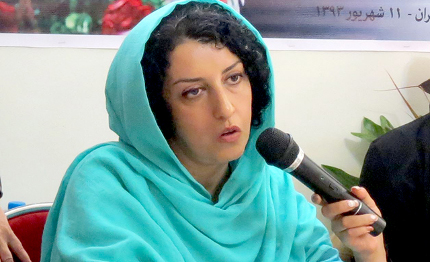
Narges Mohammadi
On May 17 the verdict in her case was handed down. Narges Mohammadi was sentenced to five years in prison for “meeting and conspiring against the Islamic Republic,” one year for “spreading propaganda against the system” and ten years for her work advocating against the death penalty. Under Iranian penal code, a person with several jail terms must serve the most severe so she must serve ten years, although sentenced to 16 years total.
Dear members of International PEN,
I’m writing this letter to you from the Evin Prison. I am in a section with 25 other female political prisoners, with different intellectual and political point of view. Until now 23 of us, have been sentenced to a total of 177 years in prison (2 others have not been sentenced yet). We are all charged due to our political and religious tendency and none of us are terrorists.
The reason to write these lines is, to tell you that the pain and suffering in the Evin Prison is beyond tolerance. Opposite other prisons in Iran, there is no access to telephone in Evin Prison. Except for a weekly visit, we have no contact to the outside. All visits takes place behind double glass and only connected through a phone. We are allowed to have a visit from our family members only once a month….[cont]
May 2017: American Writers Museum Launches in Chicago
(Published in World Literature Today, May 10, 2017)
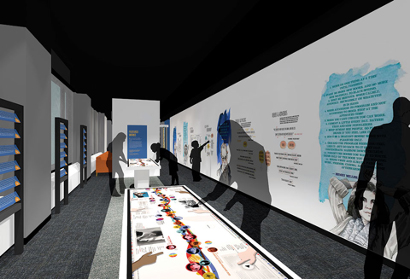
The new American Writers Museum, opening this May in Chicago, celebrates American literature in a lively, interactive space that honors America’s writers past and present.
Located on the second floor of a grand old building on Michigan Avenue’s “Cultural Corridor,” the American Writers Museum is the realization of a seven-year journey that began with a question: Why was there no national museum in the US honoring writers?
Malcolm O’Hagan, a dedicated reader and retired engineer and businessman, had visited the Dublin Writers Museum in his native Ireland and began to talk with friends and professionals about developing an American museum. He brought on writers, scholars, and publishers to develop the idea and curate the selection of writers. All agreed the focus should be on writers no longer living who’ve stood the test of time, but the museum should also celebrate contemporary literature with readings, book signings, and programs.
“I see the museum as a literary jewel box where a visitor can enjoy old friends—the books, words, characters of writers they know and also get to meet new ones,” O’Hagan says. Chicago was selected because of its central location, the support of the city, and its rich literary heritage, which includes writers like Carl Sandburg, Saul Bellow, and Gwendolyn Brooks.
One of the governing principles was not to create a museum for static artifacts—though there will be some artifacts—but a place where readers, writers, and visitors can learn….[cont]
May 2018: Gathering in Istanbul for Freedom of Expression
(Below is my talk for the Gathering in Istanbul for Freedom of Expression, a conference held every two years, but this year it is being held via video May 26-27. For the first time in 21 years the organizers judged that a gathering in person was too problematic given the arrests and crackdowns on the media. Turkish presidential elections are scheduled for June 24 alongside parliamentary elections.)
I first visited Turkey for the inaugural “Gathering in Istanbul” in March 1997. At the time I was Chair of PEN International’s Writers in Prison Committee and joined 21 other writers from around the world. Along with over a thousand Turkish artists and writers, most of us had signed on to be “publishers” for Freedom of Thought, a book that re-issued writings which had violated Turkey’s laws against “insulting the State.” The book included work by noted authors, including celebrated novelist Yasar Kemal. None of us aspired to go to Turkish prison, but we understood the importance of showing up and showing solidarity with our Turkish colleagues. During that Gathering we visited prisons where writers and publishers were incarcerated and visited court rooms where they were charged.

Rally at Istanbul University [includes Soledad Santiago (San Miguel Allende PEN), James Kelman (Scottish PEN), Alexander (Sascha) Tkachenko (Russian PEN), Kalevi Haikara (Finish PEN), Joanne Leedom-Ackerman, (WiPC Chair/American PEN with bullhorn), Şanar Yurdatapan (Turkish rights activist and organizer)]
Unfortunately, that opening has closed, and we are here today on video because the biennial ‘Gathering in Istanbul’ for the first time in 21 years is too problematic to hold in Istanbul. The situation for freedom of expression is worse than ever in Turkey with more writers in prison than anywhere else in the world. Depending on the statistics of the day, there are more than 250 journalists and media workers in or facing prison terms, 200 media outlets closed, and thousands of academics and civil servants let go or facing charges….[cont]
May 2019: [Beginning in May, 2019 I began writing a retrospective of work with PEN International for its Centenary so posts were more frequent in 2019-2020. In May 2019 there are two posts in the PEN Journeys and in May 2020 there are four.]
May 2019: PEN Journey 1: Engagement
PEN International celebrates its Centenary in 2021. I’ve been active in PEN for more than 30 years in various positions and now as an International Vice President Emeritus. With memories stirring and file drawers of documents and correspondence bulging, I am a bit of a walking archive and have been asked by PEN International to write down memories. I hope this personal PEN journey will be of interest.
February 13, 1989: I was President of PEN Center USA West and on an airplane when I read that Salman Rushdie’s novel Satanic Verses was being burned in Birmingham. The next day a fatwa was issued on Rushdie. What was a fatwa, we all asked at the time, as we, along with PEN Centers around the world, mobilized to protest that a head of state was ordering the murder of a writer wherever he was in the world.
November 10, 1995: As Chair of PEN International’s Writers in Prison Committee, I was standing vigil with others outside the Nigerian Embassy in Washington, D.C. when word spread that novelist and activist Ken Saro Wiwa had been hanged that morning in Port Harcourt, Nigeria.
October 7, 2006: My phone rang at 7:30 on Saturday morning. I was International Secretary of PEN International, and the International Writers in Prison Program Director was calling to tell me that Anna Politkovskaya had just been shot and killed in Moscow. We all knew Anna—I’d last had coffee with her at an airport in Macedonia. We worked with her on the situation of writers in Russia and Chechnya and had enormous respect for her knowledge and courage.
January 19, 2007: We were about to begin a PEN International board meeting in Vienna when a call came from Istanbul. Hrant Dink had just been shot and killed outside his newspaper office in Istanbul. Dink was an editor of an Armenian paper and a writer whom members of PEN knew well and worked with on freedom of expression issues in Turkey.
Most writers long active in PEN’s freedom-to-write work can tell you where they were when the news broke on each of these cases. They can tell you because the lives of these writers and many others have been critical in the struggle for freedom of expression around the world….[cont]

Salman Rushdie, Ken Saro Wiwa, Anna Politkovskaya, Hrant Dink
May 2019: PEN Journey 2: The Fatwa
It was President’s weekend in the US—between Lincoln and Washington’s birthday, coinciding with Valentine’s Day, 1989. I was President of PEN Center USA West and had just hired the Center’s first executive director ten days before. I’d been working hard with PEN and was also finishing a new novel, teaching and shepherding my 8 and 10-year old sons. For the first time in a year and a half my husband and I were going away for a long weekend without our children. He had also been working nonstop and had managed to clear his schedule.
On the plane to Colorado where we planned to ski, I read that Salman Rushdie’s The Satanic Verses had been burned in Birmingham, England. The next day Ayatollah Khomeini issued a fatwa against Rushdie. What was a fatwa? The Supreme Leader of Iran was calling for the murder of Rushdie wherever he was in the world, and he was offering a $6 million reward. As information about the fatwa developed, it also included a call for the death of whoever published The Satanic Verses.
I began making phone calls. This was a time before omnipresent cell phones so I had to find phones and numbers where people could reach me. (Usually our vacation dynamic was that my husband was on the phone.)…[cont]
May 2020: PEN Journey 27: San Miguel de Allende and Other Destinations—PEN’s Work Between Congresses
Over the years I’ve used various metaphors to describe PEN International—a giant wheel with 140+ spokes that reach out into the corners of the globe. A vast orchestra with the string, woodwind, brass and percussion sections scattered across the map, directed by local conductors and the Secretariat in London.
PEN’s core is an idea, codified in its Charter, acted upon by writers around the world organized into PEN centers. These writers and centers gather intensity as they work together.
Writers in a country or region or language are empowered to work as a center of PEN by the whole body of centers—the Assembly of Delegates—which vote on a center’s membership at PEN’s annual Congresses. During the months in between, PEN centers act both individually and collectively—celebrating and presenting literature in the many cultures and languages, mobilizing on issues of freedom of expression, acting to preserve and celebrate languages and translation, in particular minority languages, discussing and debating issues of peace, addressing the situation of women writers, and assisting and protecting writers who find themselves in exile. All of this activity between the annual Congresses occurs in the PEN centers and in the work of PEN International’s standing committees and at regional conferences which convene during the year….[cont]
May 2020: PEN Journey 28: Bellagio: Looking Forward—PEN for the 21st Century
In discovering Lake Como in Northern Italy on a walking tour in 1790 poet William Wordsworth called it “a treasure, which the Earth keeps to itself.” Poet Percy Bysshe Shelley declared it “exceeds anything I ever beheld in beauty with the exception of the arbutus islands of Killarney.” He extolled the chestnut, laurel, bay, myrtle, fig and olive trees that “over-hang the caverns and shadow the deep glens which are filled with the flashing light of the waterfalls.” These descriptions from the English romantic poets are matched no doubt by Italian and other poets encountering Lake Como, one of Italy’s largest and one of Europe’s deepest lakes.

Lake Como—“a treasure which the Earth keeps to itself” and the site of PEN International’s strategic planning conference, July 2003
Lake Como is one of my favorite places so meeting for an International PEN strategic planning conference above the shimmering Y-shaped lake set among the Alpine foothills was an ideal working vacation the summer of 2003. I participated as a PEN vice president and a trustee of the International PEN Foundation and former Writers in Prison Committee chair, along with International PEN’s President Homero Aridjis, International Secretary Terry Carlbom, Treasurer Britta Junge Pedersen, current and past board members, other trustees of the International PEN Foundation, several vice presidents and the standing committee chairs.
Twenty-six of us from 14 countries gathered to discuss the changed global context for PEN, which had grown from 95 to 134 centers in the last 14 years, and to consider the demands on this organization dedicated to the role of writers in promoting intellectual co-operation, tolerance and pluralism in the world….[cont]
May 2020: PEN Journey 29: Mexico City and the Road Ahead—Part I, Form
A PEN International World Congress is a hybrid—a mini-UN General Assembly with delegates sitting at tables behind their center’s (and often country’s) name plates discussing world affairs that relate to writers; an academic conference with panelists addressing abstract philosophical themes; a literary festival with writers reading their poetry and stories and sharing books, and finally a civic engagement with resolutions passed on global issues which are then delivered, sometimes by a march or candlelight vigil to a country’s embassy that is oppressing writers.
Heads of state and UN officials frequently visit and/or speak at PEN Congresses depending on the openness of the host country; esteemed writers, including Nobel laureates, and former PEN main cases are often guests. The Congress’ size varies depending on the resources available, but the financial commitment is out of reach for many PEN Centers.
The 2003 International PEN Congress in Mexico City was celebrated as the First Congress of the Americas. Hosted by Mexican PEN, it was also supported by Canadian PEN, Quebecois PEN, American PEN, and the Latin American PEN Foundation. It was the final Congress under the presidency of Mexican poet and novelist Homero Aridjis. Organized around the theme of “Cultural Diversity and Freedom of Expression,” the 69th Congress welcomed delegates from 72 PEN Centers from every continent except Antarctica….[cont]
May 2020: PEN Journey 29: Mexico City and the Road Ahead—Part II, Substance
…As well as reporting on the welcoming of new centers, Part 1 of PEN Journey 29 recounted an historic Charter amendment, major rules and regulation changes and a strategic plan—the nuts and bolts and essential frame for any organization, especially one as complex as International PEN as it sought to modernize its governance and structure. In Part II the focus turns to the substance of PEN’s work and of the 2003 Congress.
The final gathering under the presidency of Mexican poet and novelist Homero Aridjis, PEN’s 69th World Congress hosted more than 250 participants, speakers and guests, including Nobel laureate and PEN International Vice President Nadine Gordimer and also listed on the literary programs Nobel laureate and former PEN International President Mario Vargas Llosa and many writers from the Americas—Michael Ondaatje, John Ralston Saul, Francine Prose, Andrés Henestrosa and writers from at least 12 indigenous regions and languages in Mexico—Huichol, Maya, Mazahua, Mazatec, Mixtec, Náhuatl, Tenec, Tojolab’al, Tzotzil, Wuirárica, Yoleme, Zapoteca.

PEN International 69th Congress. L to R: Deborah Jones (PEN USA West), Jens Lohman (Danish PEN), Isobel Harry (Canadian PEN), Terry Carlbom (PEN International Secretary), General José Francisco Gallardo (former PEN main case) and his family; Nadine Gordimer (PEN International Vice President) and General Gallardo; General Gallardo, translator, and Jens Lohman (photos courtesy of Sara Whyatt)
Homero Aridjis noted: ‘The Congress programs explore the literature of the Americas, of Canada, the United States and Latin America, shining a particular light on the indigenous literatures which are so essential to understanding the cultural map of our continent from Chile to Canada.’…[cont]
Spring’s Return
The buds burst onto the trees this past weekend in Washington, DC and the Eastern Shore of Maryland and in Northern Virginia, heralding spring with cherry blossoms, tulip blooms, jonquils, forsythia. The skies dawned blue, then cloudy and windy with the backwash of southern storms, and now blue again. Spring has come!
It has been over a year since most of us have traveled anywhere though slowly the hum of life is returning.
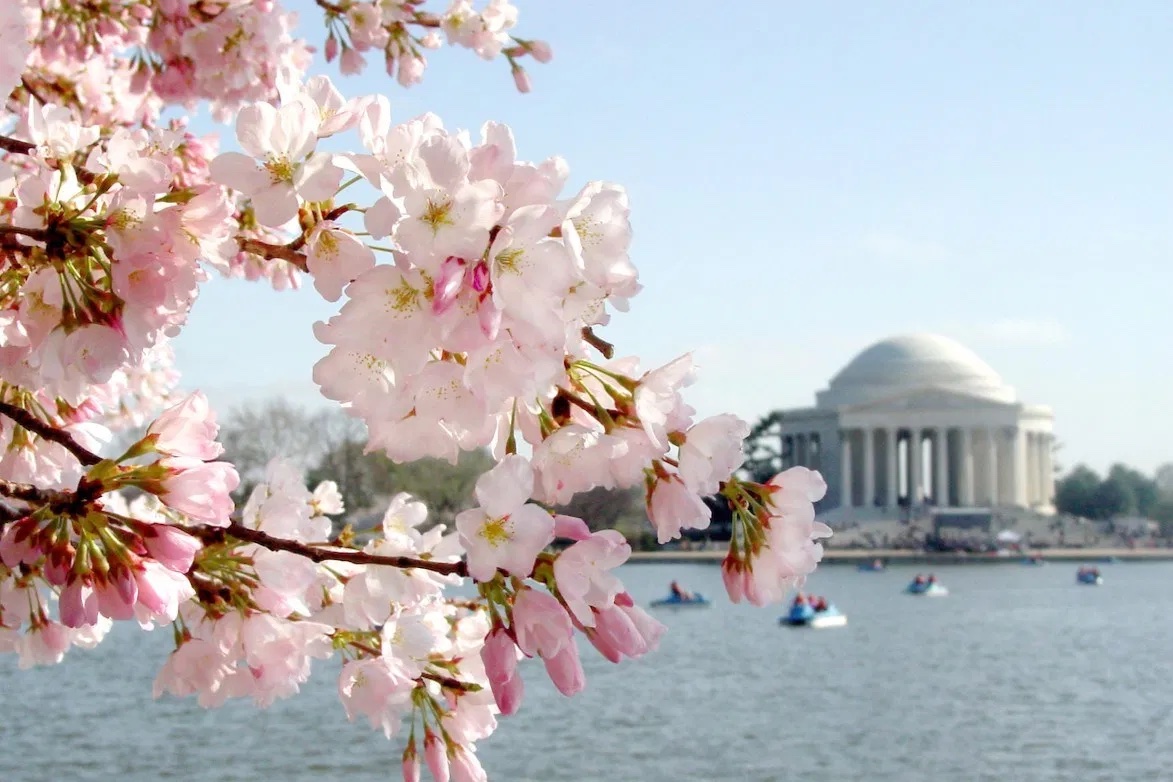
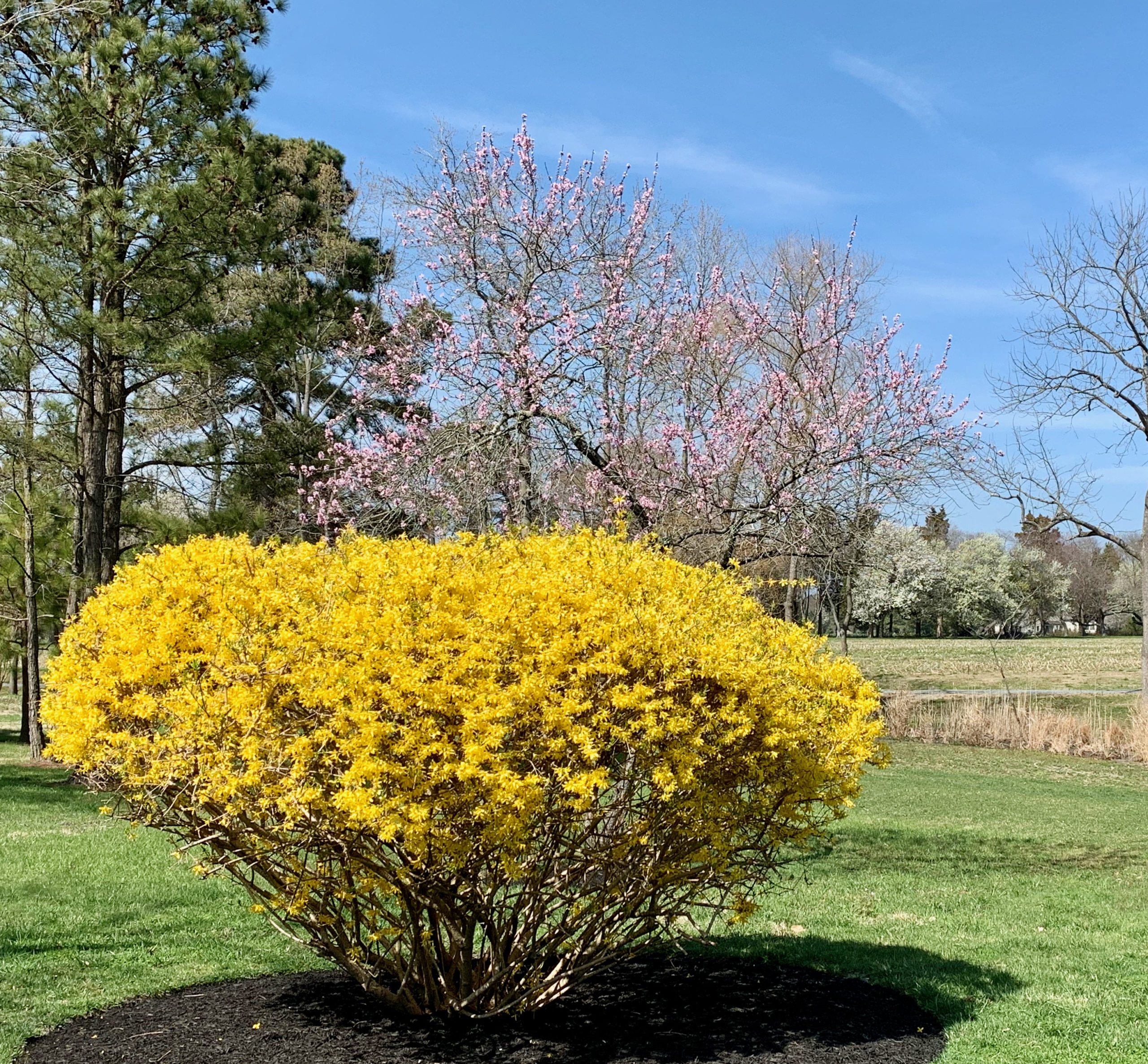
Photo credit: Joanne Leedom-Ackerman
In the absence of first hand encounters, I shared last month a retrospective of March blog posts and found appreciative readers so I repeat the exercise again. These April posts travel from China to Myanmar to Turkey to a sweep of Africa. Many of the issues remain current today.
This 2021 retrospective may prove to be a kind of dividing line—before and after the flood. None of us knows how the world will accelerate again with citizens crossing borders. I hope for the return to a world connected. We are more digitally connected after this year and that digital connection continues to gain momentum. But I also look forward to sharing a meal with colleagues around the globe and to gathering in person.
Below are the opening paragraphs of April blog posts beginning in 2008. Readers can continue reading the essays by clicking the titles. The journeys bridge past and present with a promise, I hope, of a future in situ and in person in years to come:
April 2008: OLYMPIC RELAY–A POEM ON THE MOVE
One of the more creative and moving responses to the Olympics in China this year is a poem relay, initiated by writers and members of International PEN. The poem June, was written by Shi Tao, who is currently serving a 10-year prison sentence for sending to pro democracy websites a government directive for Chinese media to downplay the 15th anniversary of the Tiananmen Square protests.
You may recall in 2004 Shi Tao was identified when Yahoo! turned over his email account to the authorities. Charged with “illegally providing state secrets to foreign entities,” Shi Tao now faces the next decade in prison. His poem June is his memorial of the 1989 Tiananmen Square crackdown.
June
By Shi Tao
My whole life
Will never get past “June”
June, when my heart died
When my poetry died
When my lover
Died in romance’s pool of blood
June, the scorching sun burns open my skin
Revealing the true nature of my wound
June, the fish swims out of the blood-red sea
Toward another place to hibernate
June, the earth shifts, the rivers fall silent
Piled up letters unable to be delivered to the dead.
(translated by Chip Rolley)
International PEN through its 145 centers around the world is circulating the poem as a parallel to the Olympic Torch relay. Over 110 PEN centers are participating by translating the poem into at least 90 (and counting) languages, and then sharing the written and oral versions in their countries and on the internet. By the end of the journey the poem is likely to be translated into as many as 100 languages, languages large and small–multiple Chinese dialects, English, French, Spanish, Catalan, Basque, Galician, Portuguese, German, Italian, Swedish, Norwegian, Danish, Dutch, Finnish, Icelandic, Bosnian, Serbian, Slovene, Croatian, Macedonian, Romanian, Hungarian, Finnish, Arabic, Hebrew, Farsi, Russian, Chechen, Hindi, Pashto, Kazakh, Kyrgyz, Greek, Turkish, Kurdish, Japanese, Malay, Haitian, Somali, Afar, Swahili, Igbo, Hausa, Yoruba, Krio, Wolof, Poular, Lusoga, Lingala, Chichewa. Tagalog, Cree, Nahuatl, Tsotsil, Mayan, Bikol, etc. etc….[cont]
April 2009: “There Will Still Be Light” *
In August, 1993 in Myanmar (Burma), Ma Thida, a 27-year old medical doctor and short story writer was arrested and sentenced to 20 years in prison, charged with “endangering public tranquility, of having contact with unlawful associations, and distributing unlawful literature.” She had been an assistant to Aung San Suu Kyi and traveled with Suu Kyi during her political campaign.
In September that same year at the International PEN Congress in Spain, I stepped into the Chair of International PEN’s Writers in Prison Committee. One of the early main cases that came across my desk was that of Ma Thida.
Last week in Providence, Rhode Island Ma Thida and I shared a stage with others at Brown University in a program: There Will Still Be Light: a Freedom to Write Literary Festival focused on the situation in Burma today as well as the situation for the freedom of writers around the world. For the past year Thida has been at Brown as a fellow of the International Writers Project (a joint appointment of the Writing Program and the Watson Institute for International Studies) which gives a writer under stress a year to work and to share their work and cultural heritage….[cont]
April 2010: Stranded in Casablanca, Out and About in Tangiers
The volcanic cloud hovered above like the mythic hand of Vulcan, unseen and disrupting the plans of mere mortals.
I was stranded in Casablanca after a short research vacation, en route to a literary festival in London and board meeting in Paris. What does one do, stranded in Casablanca? I headed north to Tangiers and waited out the volcanic ash and waited for an open seat on an airplane. It was not hard duty.
The “doorway” to Africa, where the Mediterranean and Atlantic oceans meet, is where Hercules is said to have smashed through the Isthmus and created two continents. Under blue sky with no volcanic ash in sight, I contemplated the pillars of Hercules, one in Europe—the Rock of Gibraltar—and the other in Africa. I wandered through medinas and souks, drove along the coast, visited Tetouan and Cueta, guided by a 6’2” history teacher who strode slightly in front of me in a long saffron robe, maroon fez, hands behind his back, instructing me in 3000 years of history in this region where the Phoenicians, the Carthaginians, the Romans, the Moors, pagans, Christians, Muslims and Jews all trod, where at least four colonial powers—England, France, Spain and Portugal—claimed and fought for land. I learned that Morocco was the first country to recognize the United States after it gained independence, and the first foreign legation the new United States of America sent out was to Morocco.
“You understand?” the guide kept asking me as he spun through the stories of conquest and power, of cultures on the move. “I told you that, remember?” I expected an exam any moment.
In mythology Hercules features most prominently in the region, but in the days after the volcano, I also read legends of Vulcan. In one tradition he is said to be the father of Jupiter, king of the gods. In another mythology he is the son of Jupiter and Juno, who threw their ugly baby off Mount Olympus. Vulcan fell for a day and a night and broke a leg when he finally landed in the sea. There he sunk to the bottom where a sea nymph found him and raised him as her son. According to legend, he spent a happy childhood playing with dolphins and the fish and all the wonders under the sea.
On land Vulcan eventually discovered fire and its properties, including fire’s ability to draw out from stones the iron, silver and gold which Vulcan then hammered into swords and shields and into jewelry for the woman he thought was his mother. In myths as in history, events come back on themselves. Juno, admiring the woman’s jewelry, discovered that the talented blacksmith who’d fashioned it was Juno’s own son. Juno demanded that Vulcan return; he refused. The plot thickened….[cont]
April 2011: Clouds Over the Bosporus
It rained every day on the Bosporus as we ferried back and forth across Istanbul’s grand waterway to discuss current and impending conflicts in the globe. Inside the windowless room, sitting in a large square facing each other, former presidents, prime ministers, foreign ministers, ambassadors and a former NATO commander toured the world in words and debate to find paths to end these conflicts, to encourage the opening up of political systems and to keep those systems, their leaders and others from killing their citizens. Reports from seasoned, on-the-ground researchers informed the discussion of the board of the International Crisis Group.
Outside the meeting room, the Middle East continued in a state of foment. Its citizens had taken by surprise many of the experts in the room. Egypt’s and Tunisia’s regimes had fallen through nonviolent resistance comprised of strikes and mass protests by its citizens. However, Libya’s President Gaddafi was attacking and threatening to slaughter his dissenting citizens and had sent that country into civil war. Syria and Bahrain, slightly more restrained, had also killed hundreds of protesting citizenry.
The doctrine of the Responsibility to Protect was a focus of the debate. At what point does the international community have a responsibility to intervene when a government not only doesn’t protect its citizens but attacks them? Can the international community prevent such actions so that there will never again be another Rwanda or Srebrenica? Does the responsibility to protect inevitably lead to military intervention as it has in Libya? How does the U.N. and NATO unwind its commitment? Can it? Should it? And what about the simultaneous bloodshed in the Ivory Coast? Why were nations not invoking the Responsibility to Protect there?
These questions unfurled and swirled with no definitive answers. Rather, the answers were iterative, inching towards solutions. Even with some of the brightest minds around the table, foreign policy and diplomacy is not so much an art or a science; it is more like a grand bazaar, a trading of perceptions and perceptions of national interests….[cont]
April 2012: Africa of the Mind: Friends Real and Imagined
(This blog post originally appeared on www.africa.com, a website that features arts, culture, news, travel and commentary about Africa.)
Africa for me began in imagination. I was writing a novel The Dark Path to the River, which had an unnamed African country as the back story for a drama at the United Nations. The African characters started talking in my head, telling me their stories.
I had read widely about Africa, but at the time I had only been to Kenya on a traditional safari. I continued reading African literature, audited courses on African folklore and politics. While writing the book, I returned to Africa, to Zimbabwe, Zambia, and Malawi, where I visited schools and children I’d been engaged with through a nonprofit organization. I listened to the rhythms of the languages, to the songs, observed the colors of the green hills, the red dirt, the fuchsia, orange, yellow and blue flowers, the clothing of the same astonishing colors and patterns. I met with fellow writers and artists.
I have since returned to Africa dozens of times. I’ve visited schools in east, west, central, and southern Africa. In Uganda, I’ve plowed through the bush in a jeep to arrive at classrooms in a clearing whose materials hung from the roofs of huts with no doors so the cows of the pastoralist herders wouldn’t trample them. I’ve visited brick schools built by villagers in Malawi where the children sat on the extra bricks for stools: I’ve sat in classes in bullet-scarred schools that have been rebuilt after the civil war in Sierra Leone. In Ethiopia I’ve participated in a village bridal ceremony, have sat around smoking fires in villages in Mali eating goat and rice, have walked through the modern capitol buildings of Abuja, Nigeria, watched the sun rise over the Indian Ocean in Tanzania and set on the Atlantic in Sierra Leone….[cont]
April 2013: Two Voices Behind the Iron Doors
(In the past weeks I was brought to focus again on the situation of two writers in prison, one in China, the other in Turkey, both countries that have consistently challenged and imprisoned writers. In China the hope for expanded freedom of expression that came with the Olympics and China’s engagement with global institutions has not materialized, and Chinese writers remain in prison with long sentences. The situation in Turkey for a while was improving, but in the past year arrests have again escalated.)
Voice in China
I had dinner recently with three colleagues of Liu Xiaobo, the Nobel laureate and writer currently serving an 11-year sentence in a Chinese jail. Two of his friends, Shen Tong and the other friend arrived in the U.S. around the time of the Tiananmen Square protests in 1989, but the younger best-selling writer and democracy activist Yu Jie didn’t leave China until January, 2012 after being detained and tortured and put under house arrest. He now lives in Virginia.
Yu Jie consulted with Liu Xiaobo during the writing of Charter 08, the manifesto calling for democracy in China which resulted in the imprisonment of Dr. Liu. He and Liu Xiaobo also co founded the Independent Chinese PEN Center, and Yu Jie has written a biography of Liu Xiaobo.
At a round wooden table in a bustling Washington restaurant the friends outlined their campaign. Among their strategies, they are working to gather a million signatures worldwide calling for the release of Liu Xiaobo and his wife Liu Xia, who has been under house arrest since Liu’s imprisonment. So far they have gathered about half a million signatures in 130 countries, including from 135 Nobel Laureates. The Friends of Liu Xiaobo are also campaigning for the release of other prisoners of conscience in China. They and the Nobel Laureates are mobilizing support around the world and have been told the Chinese government has started to take notice and to worry about the scope of the campaign. Dr. Liu is the only Nobel Peace Prize Laureate in prison….[cont]
April 2014 I didn’t post in April.
April 2015: Overheard in Washington: Politics and Cherry Blossoms
I write in restaurants. I find my corner, find the plug, choose the restaurant and the table where I am not taking up needed space, where I can hunker down and concentrate with just enough ambient noise to take me back to my roots of writing in the middle of a newsroom. I have my favorite spots around town. I know the nicest waiters and waitresses, the best cups of coffee, the places I can write through breakfast and lunch without taking up space for other customers and can get fed at the same time.
The routine also gives me access from time to time to interesting conversations. I am not a natural eavesdropper, but it is unavoidable when people sit nearby and talk as if I am invisible. People’s lives come together and fall apart in restaurants and sometimes in my presence. In Washington I have also overheard conversations I’m sure were meant to be confidential. It surprises me how one assumes a lone person ten feet away can’t hear just because she appears engaged in her work.
This morning I am in one of my favorite spots, big floor to ceiling windows, few people here but me this early, truly fresh squeezed orange juice (one of the reasons I come here). I plug in my computer; the waiters and waitresses know me well and bring decaf coffee and yogurt parfait, and I settle in for several hours work. But twenty feet away a meeting is going on around a big table, everyone perched on high stools leaning in. I am good at ignoring such talk, but I hear the word ISIS and then talk about their finances and other interesting international issues. As I’m setting up my work for the morning, I listen casually, wondering if this is a group of government employees strategizing in the open at this restaurant with good coffee and fresh squeezed orange juice. Or is it a team from an NGO or a think tank, and then I hear the word “campaign.” And I know with a sinking feeling that the long campaign season has begun. Whose campaign? The name is never mentioned, but by the pronoun, it is not hard to guess….[cont]
April 2016 I didn’t post in April.
April 2017 I didn’t post in April.
April 2018 I didn’t post in April.
I passed two ducks strolling down the highway on Easter morning—large mallards waddling and chatting with each other, staying on their side of the white-lined shoulder, yet precariously close to the cars whizzing by. They appeared oblivious to the traffic. I wondered where they were going and where they thought they were. They were several miles from water. On their side of the small highway on the Eastern shore of Maryland sprawled a shopping center with a supermarket, restaurants, movie theater. On the other side spread a bit of green field and beyond that more stores and beyond that woods, and beyond that the water—the Tred Avon River which eventually flows out into the Chesapeake Bay.
I was tempted to turn around and try to get a picture, but by the time I could make the turn and get back, they would likely have flown away. Instead, I carry their picture in my mind. I love ducks….[cont]
[April 2020: [Beginning in May, 2019 I began writing a retrospective of work with PEN International for its Centenary so posts were more frequent in 2019-2020. In April 2020 there are four posts in the PEN Journeys.]
April 6, 2020: PEN Journey 23: Nepal—WiPC Crossing the Bridge Between People
[PEN International celebrates its Centenary in 2021. I’ve been active in PEN for more than 30 years in various positions and now as an International Vice President Emeritus. With memories stirring and file drawers of documents and correspondence bulging, I am a bit of a walking archive and have been asked by PEN International to write down memories. I hope this personal PEN journey will be of interest.]
As I write these PEN Journeys, memory differs with each one. I sit and think, pulling up whatever memories I have. Some are visual; some are of activities, some of the twists and turns in PEN itself; many are of friends, a few of incidents; others come from concurrent parts of my life such as moving to London with my family and connecting to work at International PEN headquarters (PEN Journey 5), or scaling the Berlin Wall just after Germany reunited (PEN Journey 4), or visiting Russia shortly after the coup attempt (PEN Journey 8).
I have paper documentation for most of PEN’s events, not because I was an archivist in the making but more of a packrat who was too busy to sort through papers after a congress or conference and so set the files in a drawer. I am not even accounting for all the emails and digital files that began to accumulate in the late 1990’s and 2000’s. In my recounting, I am only now entering that period when the internet and email were burgeoning. For some of the Journeys I have photographs, but my picture-taking was random in retrospect, probably reflecting my role at the time. The more work I had, the fewer pictures. There were no iPhones or Android phones during these earlier years so I had to have a camera at hand. In certain years I have no photographic record of PEN though some may yet turn up in the recesses of my basement. There are, however, always pictures in my head.
For the Writers in Prison Committee’s (WiPC) third biannual meeting in Katmandu, Nepal in the spring of 2000, I have lots of pictures. We were celebrating the 40th anniversary of International PEN’s Writers in Prison Committee. As ex-chair, I helped with the conference, but the burden of the meeting wasn’t mine so I was also out with camera in hand. In my head I still carry the landscape of Nepal—the hills outside Katmandu with the haze over mountains in the distance, the woman in a red sari walking up the hill carrying bundles of sticks, the gentle landscape and the harsh conditions….[cont]
“Contrary to our tradition, this year’s PEN Congress is being held in a country in which a massive, genocidal military and paramilitary operation is under way. Besides mass murder, the crimes perpetrated against the civil population of Chechnya include deportation, rape, torture, destruction and theft of personal property as well as the systematic looting and destruction of the material bases of Chechnyan culture and civilization. At the same time, freedom of information has been severely curtailed, and the official propaganda plays on xenophobic and even racist ethnic stereotypes…” So began a Declaration from the 67th World Congress of International PEN voted by the Assembly of Delegates in May 2000.
The decision to hold the International PEN Congress in Moscow was a controversial one, resulting in some members refusing to attend because of Russia’s prosecution of the war in Chechnya and the concern that holding a Congress in Moscow would give the government an appearance of approval. However, PEN’s Secretariat with the new Executive Committee concluded that the long-planned millennial Congress also presented the opportunity for International PEN to show solidarity with Russian PEN which had been outspoken both on the war and on behalf of Russian journalists and writers under pressure.
“The writers of Russia, united under the auspices of the Russian Centre of the International PEN Club, are concerned about the escalation of the war in Chechnya which is becoming a threat to not only peaceful residents of Grozny-city but also to the national security of Russia. The ultimatum announced to women, children and old people of the Chechen capital makes them hostages of both terrorists and federal forces. It is hard to believe that in this situation the Russian authorities are going to use the same methods as terrorists. We are very aware how hard it is to cut the tight Chechen knot, but in any case innocent people do not have to become victims of the decisions taken…” Russian PEN sent this appeal earlier to the acting President of the Russian Federation, Vladimir Putin.
Russian PEN members, including President Andrei Bitov, had signed the appeal. Russian PEN’s General Secretary Alexander (Sascha) Tkachenko noted at the Congress that it was essential to call on all those involved—Russian and Chechen—to cease their brutalities. Sascha himself had regularly stood up to the Russian government. He championed the cases of imprisoned writers Alexandr Nikitin and Grigory Pasko, both of whom had recently been freed after trials. Pasko, who was a journalist and former Russian Naval officer, had been arrested and accused of espionage for his publication of environmental problems in the Sea of Japan. Nikitin, a Naval officer, had been charged with stealing state secrets by contributing to a report that revealed the sinking of Russian nuclear submarines and the dangers these decaying submarines posed to the environment.
The freedom and the openings which many embraced after the break-up of the Soviet Union in the early 1990’s were beginning to close down and restrictions tighten. At the Moscow Congress Pasko expressed his gratitude for everything PEN had done to obtain his freedom. He urged the Assembly to focus on environmental problems. But he warned that the structure of the current Russian government had grown out of the KGB, and he feared nothing good would come for free speech or the environment….[cont]
April 17, 2020: PEN Journey 25: War and More War: Retreat to London
“Whenever and wherever writers band together, whenever and wherever the members of PEN gather, regionally or nationally, there seems to be an emergency on our agenda…” So German novelist Günter Grass opened the 67th PEN Congress in Moscow in 2000. Grass was referring to the crisis in Chechnya at the time, but his observation held true the following year as PEN hastily arranged a replacement Assembly of Delegates in London, November 2001.
Two months earlier the United States had been attacked on September 11. A month later a U.S.-led NATO coalition invaded Afghanistan. But the conflict which upended PEN’s plans stirred in the Balkans with an impending civil war in Macedonia.
PEN’s 2001 Congress was originally to have taken place in the Philippines, but funding fell through. (Philippine PEN finally hosted a Congress in 2019.) Macedonian PEN agreed to move its 2002 Congress ahead a year and host PEN in the ancient city of Ohrid, but the Albanian National Liberation Army attacked Macedonian security forces in February 2001. As fighting escalated, PEN was again faced with the dilemma of whether to hold a Congress in a country in conflict.
Finally, in August given the political situation in Macedonia, which was close to civil war, PEN’s Executive Committee “against the advice of the International Secretary” but “united in trying to overcome the situation,” decided to cancel the Macedonian Congress. Instead PEN planned a three-day replacement Assembly of Delegates in London where the business of PEN and its committees would take place but without all the literary and social events that usually accompanied a Congress. Delegates who arrived early could attend English PEN’s Day of the Imprisoned Writer service at St. Brides on Fleet Street, and English PEN hosted an opening reception and literary evening at the British Library; another reception at Lancaster House was hastily arranged, hosted by the Parliamentary Undersecretary of State for Foreign and Commonwealth Affairs. Ten years earlier a similar replacement Assembly had taken place in Paris when the Congress had been canceled in Delphi because of finances and the start of the Balkan War. (PEN Journey 7)
In September, “alarmed by the escalating volatility of the situation,” International Secretary Terry Carlbom sent a letter to PEN’s Vice Presidents announcing the change and asking for support. That letter was dated September 11, 2001.
On September 11, I was in New York City. I had just flown in the night before from an International Crisis Group board meeting in Brussels to attend meetings at Human Rights Watch. That morning I was dressing and watching the news when, like millions of Americans, I saw the first plane fly into the World Trade Center. I assumed it was a terrible accident when suddenly live on tv I saw the second plane crash into the South Tower….[cont]
April 24, 2020: PEN Journey 26: Macedonia—Old and New Millennium
I remember diving from a rowboat into Lake Ohrid and swimming in pristine water. I love to swim but never did so at PEN Congresses. However, the 68th Congress was held on one of Europe’s oldest—3 million years old—and deepest lakes which floated in the mountainous region between North Macedonia and eastern Albania. The water was the cleanest I had ever seen or felt. I swam without looking back until finally, I heard a voice from the boat shouting, “Come back! You’re almost in Albania!”
Albania, or rather the Albanian Liberation Army, a paramilitary organization, had recently been in conflict in Macedonia and was the reason PEN’s Congress there had been postponed the year before. (PEN Journey 25)
Swimming with me was my friend Isobel Harry, Executive Director of Canadian PEN, and in the boat sat Cecilia Balcazar from Colombian PEN and another PEN member. They watched over us in this break from the PEN meetings. My memories of the 2002 PEN Macedonia Congress include intense meetings of the Assembly in the Congress Hall of the old Soviet-style Metropol Hotel and neighboring Bellevue Hotel conference center and relaxed gatherings afterwards at lakeside cafes in the town of Ohrid, a UNESCO World Heritage site.
In the evenings we gathered for literary events with UNESCO-like titles—The Future of Language/Language of the Future and Borders of Freedom/Freedom of Borders. These were also the themes of the Congress. There was music and poetry in Macedonian and other languages I didn’t understand, recited in cavernous, shadowy chambers, including in the ancient Cathedral Church of St. Sophia, a structure from medieval times, rebuilt in the 10th century. Its frescoes still adorned the walls from Byzantine times in the 11th, 12th and 13th centuries and had been restored after the church was converted to a mosque during the Ottoman Empire.
While current politics and conflicts occupied the daytime work of PEN, history suffused the gathering. Civilization in Ohrid dated to 353 BC when the town had been known as “the city of light.”
“The old millennium, especially in ‘old’ Europe, should, I believe, be left behind with all its anachronistic boundaries—geographical, historical, racial, ethnic, state, linguistic, religious and cultural—and give way to the unfolding of the new millennium, to its open-mindedness and tolerance,” Dimitar Baševski, President of Macedonian PEN, wrote in his introduction to the Congress. “For generations we in Macedonia have lived with a creed according to which culture and not warfare or power is perceived as the field for competitiveness among nations. The aims of the World Congress of International P.E.N. in 2002 perfectly correspond with the spirit of this creed.”…[cont]
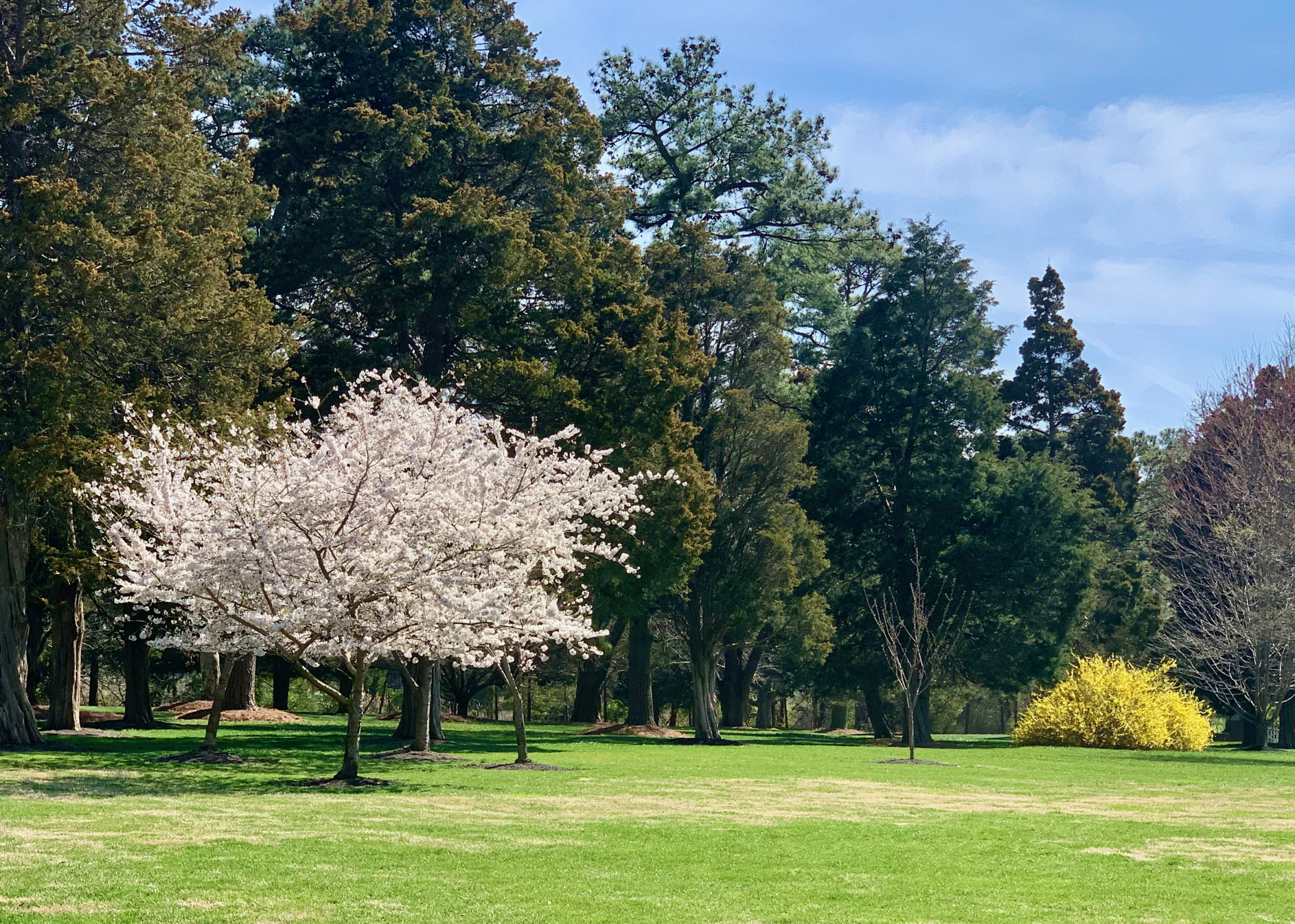
Photo credit: Joanne Leedom-Ackerman
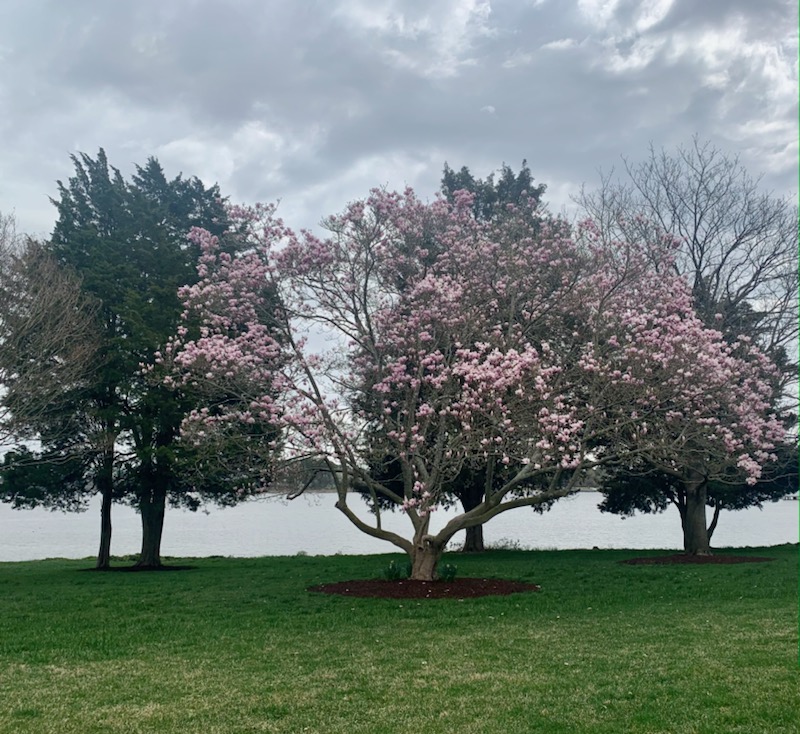
Photo credit: Joanne Leedom-Ackerman

Photo credit: Joanne Leedom-Ackerman
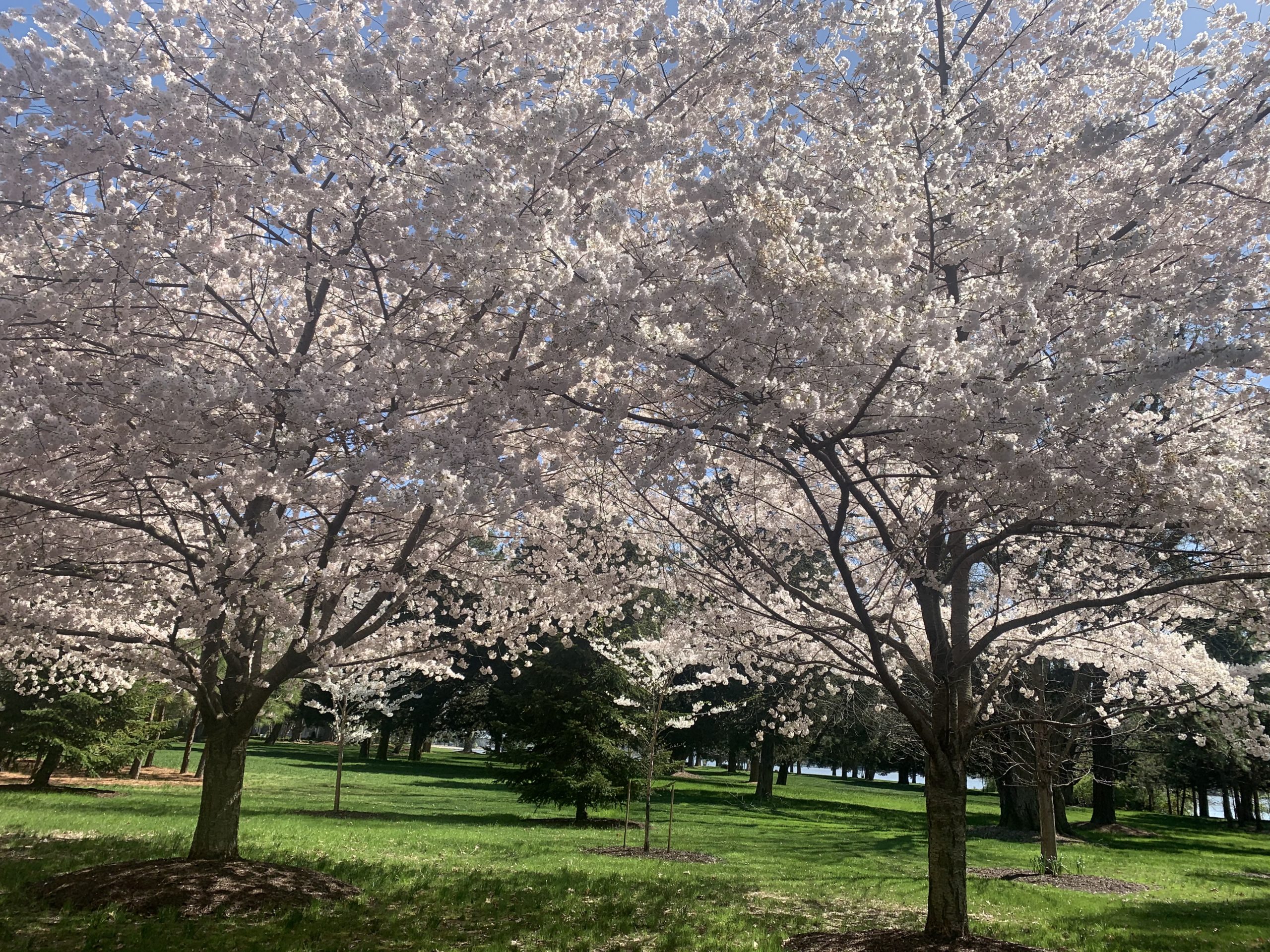
Photo credit: Joanne Leedom-Ackerman
Time and Tides and Sunrise
I wrote my first blog post 13 years ago in February 2008. I launched this site into the digital universe with a soft promise to myself to try to write one post a month. Mostly I was writing in other forms, but I kept this commitment, though on occasion, often in March, I skipped a post. I didn’t read many blogs, didn’t know the impact a blog might have and wasn’t aspiring to master the form—if it even was a form—but I wanted to join the digital world. I’m still not sure what impact this blog has, but I am grateful to those who have read it over the years. Each month I pause and consider what is worth saying in a few hundred words. The discipline of gathering thoughts in actual time once a month has value and has provided a record of sorts.
After this tumultuous year globally with quarantines and isolation and political upheavals in the US and abroad, I am not inclined to words so much as pictures these days, especially of the sunrise each morning, this universal affirmation of the earth spinning in its orbit whatever the sturm and drang of the citizens in its arms.
I found it interesting to review March posts over the years and share a quick snapshot here as a trail of thought and activity. I’ve only copied the opening of each post. You can click the date to read the whole. I hope that they may be of some historical interest and that you enjoy the words and the pictures at the end.
I’m writing this, my second blog, on the birthday of my oldest son and a day when much of the U.S. is watching presidential primary results. I find myself thinking about words, action and change—three concepts that have been debated relentlessly on the airwaves in this U.S. primary season. How do words link to actions that bring about change?
Let me start with my son who spends his days in abstract thought. He is a mathematician, a logician, whose thoughts and work are understood by only a very small number of people around the world. He teaches more accessible math at a university, but his research time is spent thinking and then writing in words and symbols which only a few understand. When I asked him once how his ideas might be applied a hundred years from now, he smiled his patient smile and asked, “Mom, do I ask you how your literature applies?”
All right, I get that. I understand the value of pure ideas, ideas for their own sake. I understand the need to think and to add to the universe of thought even if one doesn’t know the value the thoughts may have and even if they are shared with only a few. It is a way of ordering, discovering and revealing the harmony of the universe….[cont]
March 2009: Cherry Blossoms and Newspapers
Today we are watching actions every day from the new administration. How effective they will be for the economy, for education, for international trade, for peace we all wait to see. But today the means of reporting, investigating, and evaluating these actions are challenged and changing as newspapers around the country struggle to survive.
In the U.S. newspapers are laying off staff, closing bureaus, including their Washington bureaus, and reducing the number of professional journalists who watch and report on the government. Across the globe the print media is challenged. The revolution of the digital age is as transformative as the Industrial Revolution. When one is in the midst of a revolution, it is difficult to know how to adjust and to survive and even flourish; but change is coming, ready or not….[cont]
March 2010: “Because Writers Speak Their Minds—2”
My years as Chair of International PEN’s Writers in Prison Committee began in a way with Salman Rushdie and ended, or at least were framed, by Ken Saro Wiwa. Both were global cases that mobilized writers and others around the world to protest the edicts of governments that tried to stifle dissent and imagination by killing the writer. Rushdie survived; Saro Wiwa did not….[cont]
March 2011: Jury Duty and Revolutions
I spent the month of February on a jury for the first time. I had been called for jury duty at least a dozen times in three or four different cities where I’ve lived, but I was never selected. I assumed because I was a writer and active in human rights work, I was considered a dubious juror. But in February, along with 15 other people, I was empaneled in a criminal case that lasted over a month…
For four weeks all 16 of us arrived every day on time at the courthouse to follow the trial for 6-7 hours. No juror was ever absent and only once or twice was anyone a few minutes late. Everyone took their responsibility to each other and to the court seriously…
Like most people in the jury pool, I was not looking forward to serving and interrupting my life, but I was willing. I was perhaps more willing than usual because I was following the upheavals in the Middle East, particularly in Egypt at the time. The citizens there were protesting for the very freedoms we had in an open democracy, the freedom to participate in government and in one’s justice system. Each day during the breaks many of the jurors followed what was happening in Egypt…had Mubarak resigned yet? It turned out that the people of Egypt overturned a 30-year regime faster than our trial unfolded. When Mubarak finally left office, we were still sitting in the jury box….[cont]
March 2012: Worlds Apart Review
The city is surrounded. Shelling rains down on the population. Sniper fire, bombs, mortars erupt from all directions. There are no safe havens for civilians; dozens are killed each day. The international community meets, protests, debates what should be done. Powerful players like Russia obstruct action. Sanctions are tightened, but it is citizens who suffer most. Outside nations are willing to offer humanitarian aid, but are conflicted about arming the opposition. The UN organizes peacekeeping forces, but the mandate and rules of engagement are unclear. The siege and the deaths continue…for years.
This description could be from today’s headlines in Syria, but instead it is the siege of Sarajevo in Bosnia 20 years ago. The paralysis of the international community to intervene and prevent the killings of citizens is still haunting….[cont]
(My reprinted book review of Ambassador Swanee Hunt’s Worlds Apart.)
March 2013 I didn’t post in March.
March 2014: Women’s Progress: The Power of a Bridge…and a Double Yellow Line
I arrived at Johns Hopkins as a graduate student in the Writing Seminars straight from a small college in the Midwest with a combination of confidence and concern that Hopkins had made a mistake admitting me. I was sure the other students would be more widely read and experienced. I spent the whole spring and summer when I wasn’t working, reading. That fall at Hopkins I was assigned the very first seminar paper focused on a controversial novel at the time The Confessions of Nat Turner by William Styron. The controversy arose around whether a white novelist could or should take on the first person narrative voice of a slave. I’ll get to my answer later in this talk. I got an A on the paper and knew I was going to be all right. Hopkins let me know I could meet the challenge. That was my first lesson.
When I arrived on campus, there were no women undergraduates. At the time my social conscience was focused more on civil rights than women’s rights so while the role of women in the larger society concerned me, I think I viewed the ratio at Hopkins as a social advantage. But here comes my next big lesson. When I had a disappointment on the romantic front and was feeling low, a voice in my head challenged: “If you have time to mope about, you have time to reach out and help someone!” That voice was not echoing my parents; they would be kinder. It was my own voice taking me to task, and so I listened.
I went to the Hopkins Tutoring office and signed up to tutor in the community. I was assigned a family who lived in West Baltimore and later moved to the projects on Druid Hill Ave. One evening a week I drove over to their house and tutored the mother of five children, ages 4-12. She only had an eighth grade education and wanted to read better. I also helped the children with their homework. The 10-year old daughter and I shared the same birthday. I tell you that because I’m still in touch with this family, and recently when the mother and I were talking on the phone after that birthday had passed, she asked me: “Do you know how old I am?” And I answered, yes, you’re ten years older than me and your daughter is ten years younger, and none of us should be counting anymore.” We both laughed. Three of those children went on and graduated from college and the oldest son finished high school and is a grandfather himself now. One of the treasures of my time at Hopkins was getting to know this family and having them part of my life over the years though we don’t see each other as much lately. My Hopkins education opened worlds to me of all kinds, showing me I would be okay in the larger intellectual world as well as in the inner city of Baltimore….[cont]
(From a talk given at Celebration of Women’s Day at Johns Hopkins University)
March 2015 I didn’t post in March.
March 2016: Spring and Release
I saw the first daffodils today…and forsythia…and the buds on cherry blossom trees. Spring with its regalia is starting to blossom, at least here in Washington, DC.
In the freedom of expression community renewal is heralded this week by the release of writers from prison in a number of countries, including Qatar, China and Azerbaijan. While the writers were unjustly imprisoned in the first place and many hundreds still languish in jails because they have offended governing powers, the releases of Qatar poet Mohammed al-Ajami after almost five years in prison and Chinese writers Rao Wenwei and Wang Xiaolu and half a dozen writers in Azerbaijan are cause for quiet celebration….[cont]
March 2017: I didn’t post in March.
March 2018: I didn’t post in March.
March 2019: Arc of History Bending Toward Justice?
PEN International was started modestly almost 100 years ago in 1921 by English writer Catherine Amy Dawson Scott, who, along with fellow writer John Galsworthy and others conceived that if writers from different countries could meet and be welcomed by each other when traveling, a community of fellowship could develop. The time was after World War I. The ability of writers from different countries, languages and cultures to get to know each other had value and might even help reduce tensions and misperceptions, at least among writers of Europe. Not everyone had grand ambitions for the PEN Club, but writers recognized that ideas fueled wars but also were tools for peace….[cont]
March 2020: [Beginning in May, 2019 I began writing a retrospective of work with PEN International for its Centenary so posts were more frequent in 2019-2020.]
March 12, 2020: PEN Journey 21: Helsinki—PEN Reshapes Itself
[PEN International celebrates its Centenary in 2021. I’ve been active in PEN for more than 30 years in various positions and now as an International Vice President Emeritus. With memories stirring and file drawers of documents and correspondence bulging, I am a bit of a walking archive and have been asked by PEN International to write down memories. I hope this personal PEN journey will be of interest.]
In the old days, at least my old days, the Vice Presidents of PEN International sat in a phalanx on a stage while the Assembly of Delegates conducted business—revered writers, mostly white older men, along with the President, International Secretary and Treasurer of PEN in the center. If the Assembly business wore on, it was not unusual to see one or two of them nodding off. The role of the Vice Presidents was to provide continuity—many had been former PEN Presidents—to provide wisdom, contacts and gravitas. The designation was for life.
But times were changing. For instance, I had recently been elected a Vice President. I was a woman. I’d served PEN in several positions, including president of my center, founding board member of the International PEN Foundation and International Writers in Prison chair; I was a writer, though not of international renown, and at the time I was relatively young. I had been nominated by English PEN whose General Secretary thought it was high time more women sat on that stage. I didn’t relish sitting on a stage, but I was honored to hold the position. The Helsinki Congress in 1998 was the first when Vice President was the only role I had. I don’t recall if there was a stage at that Assembly. The fun was that I didn’t have to do anything. I could float between committee meetings, offer comments when relevant, wisdom if I had any and be called upon for whatever insight or experience or task might serve…
At the 65th PEN Helsinki Congress held at the Marina Conference Center on the waterfront, a short walk from the city center, delegates and PEN members from 70 centers around the world gathered. The Congress’ theme was Freedom and Indifference….[cont]
March 26, 2020: PEN Journey 22: Warsaw—Farewell to the 20th Century
Bombs had been falling for months on Serbia when the 66th PEN Congress convened in Warsaw June 1999. The NATO assault—one of the last major campaigns of the Balkans War—ended just a week before the Congress opened. These events stirred debate at the Congress whose theme Farewell to the 20th Century caused delegates to look back as well as forward in deliberations.
The past included Warsaw’s history as well as its proximity (and a post-Congress trip) to Kraków and to the concentration camps of Auschwitz and Birkenau. I didn’t join the PEN trip, but during the Congress, I went on my own one day to these memorials of World War II’s terrible past so that I could walk and think alone among the empty crowded bunks, the piles of shoes, the ovens…
The Warsaw Congress was my first trip to Poland though not my last and my first visit to a concentration camp, though not my last.
The wars of the 20th Century both past and current were a problematic platform upon which to launch into the new Millennium, yet the century also was a time of citizens coming together and speaking out in such organizations as PEN….[cont]
March 31, 2020: The Journey of Liu Xiaobo: From Dark Horse to Nobel Laureate
A zoo in China placed a big hairy Tibetan mastiff in a cage and tried to pass if off as an African lion. But a boy and his mother heard the animal bark, not roar. As news spread, the zoo’s visitors grew angry. “The zoo is absolutely trying to cheat us. They are trying to disguise dogs as lions!” declared the mother.1
In 2009 the Chinese government put Liu Xiaobo, celebrated poet, essayist, critic, activist, and thinker into a cage, labeled him “enemy of the state,” charged him with “inciting subversion of state power,” and sentenced him to eleven years’ imprisonment. Liu Xiaobo was not an enemy, but he was a “lion” the state feared. He challenged orthodoxy and conventional thinking in literature, which he wrote and taught, and authoritarian politics, which he protested and tried to help reshape. His insistence on individual liberty in more than a thousand essays and eighteen books, his relentless pursuit of ideas, including as a drafter and organizer of Charter 08, which set out a democratic vision for China through nonviolent change, and finally his last statement, “I have no enemies and no hatred,” threatened the Chinese Communist Party and government in a way few other citizens had.
Dr. Liu Xiaobo was the first Chinese citizen to win the Nobel Prize for Peace, in 2010, but he was in prison, was not allowed to attend the ceremony, and died in custody in July 2017….[cont]
(My essay from The Journey of Liu Xiaobo: From Dark Horse to Nobel Laureate, ed. Joanne Leedom-Ackerman with Yu Zhang, Jie Li, and Tienchi Martin-Liao)
Sunrises on Maryland’s Eastern Shore:
The earth keeps spinning, showing us her beauty…
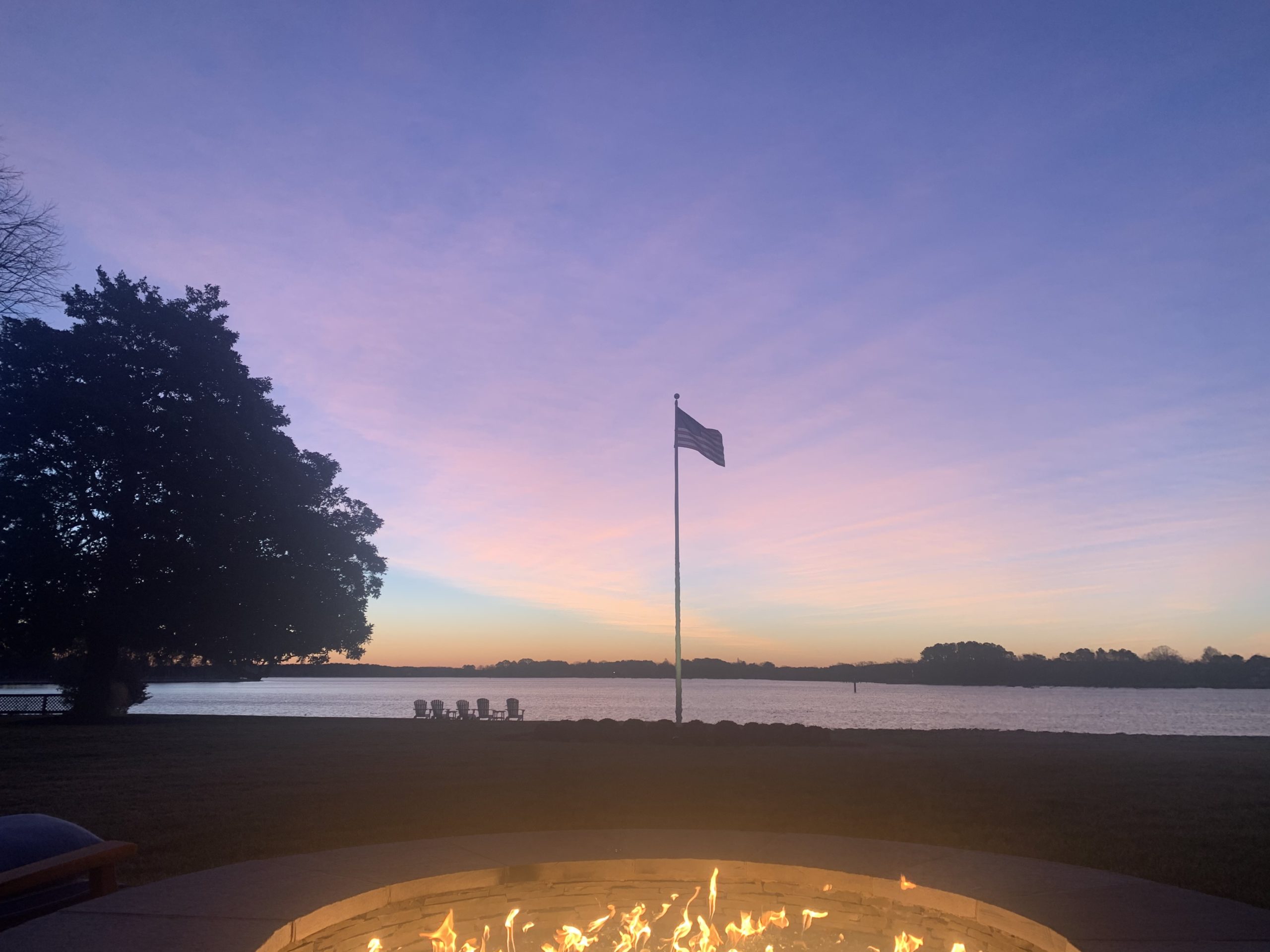
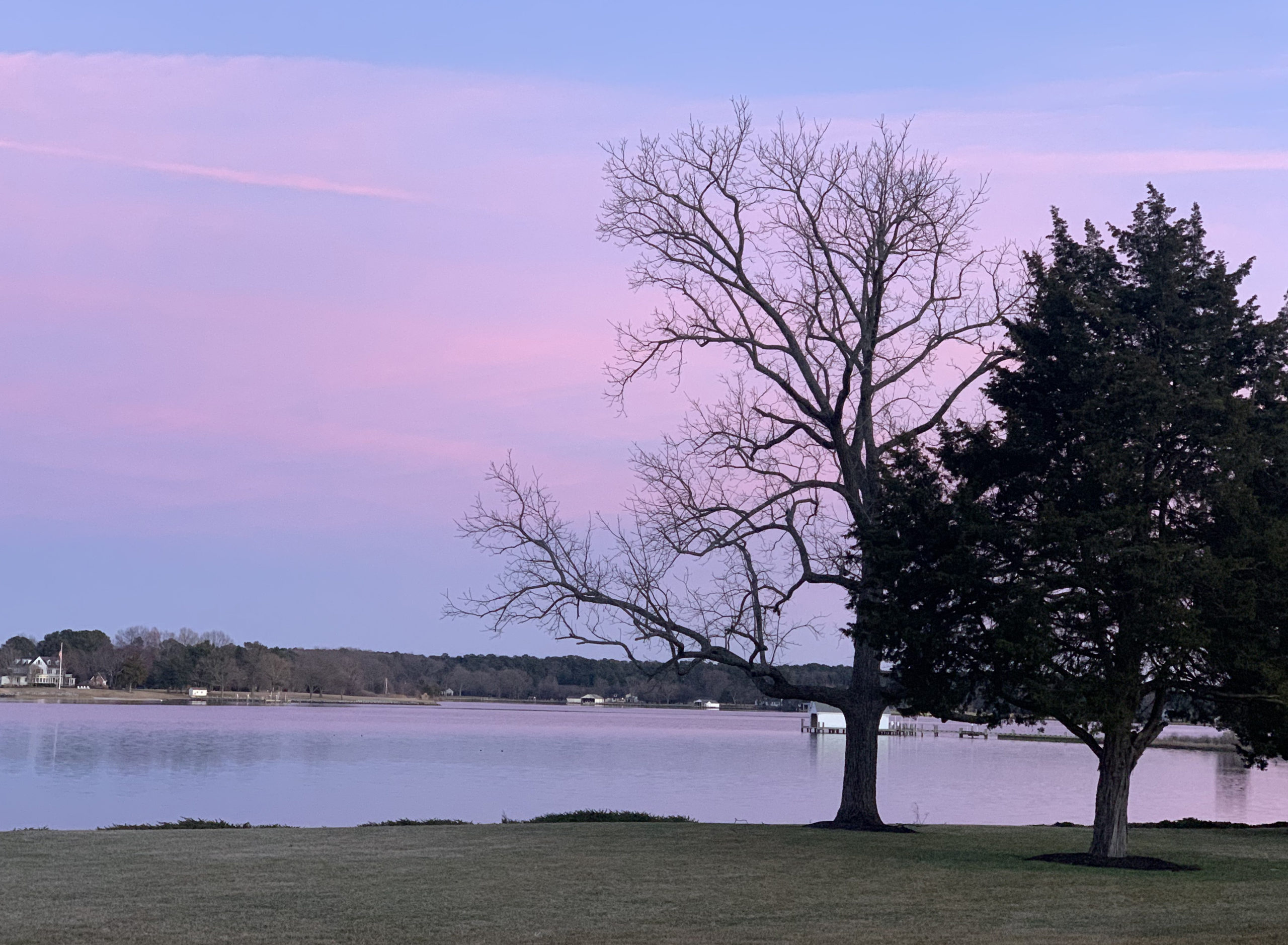
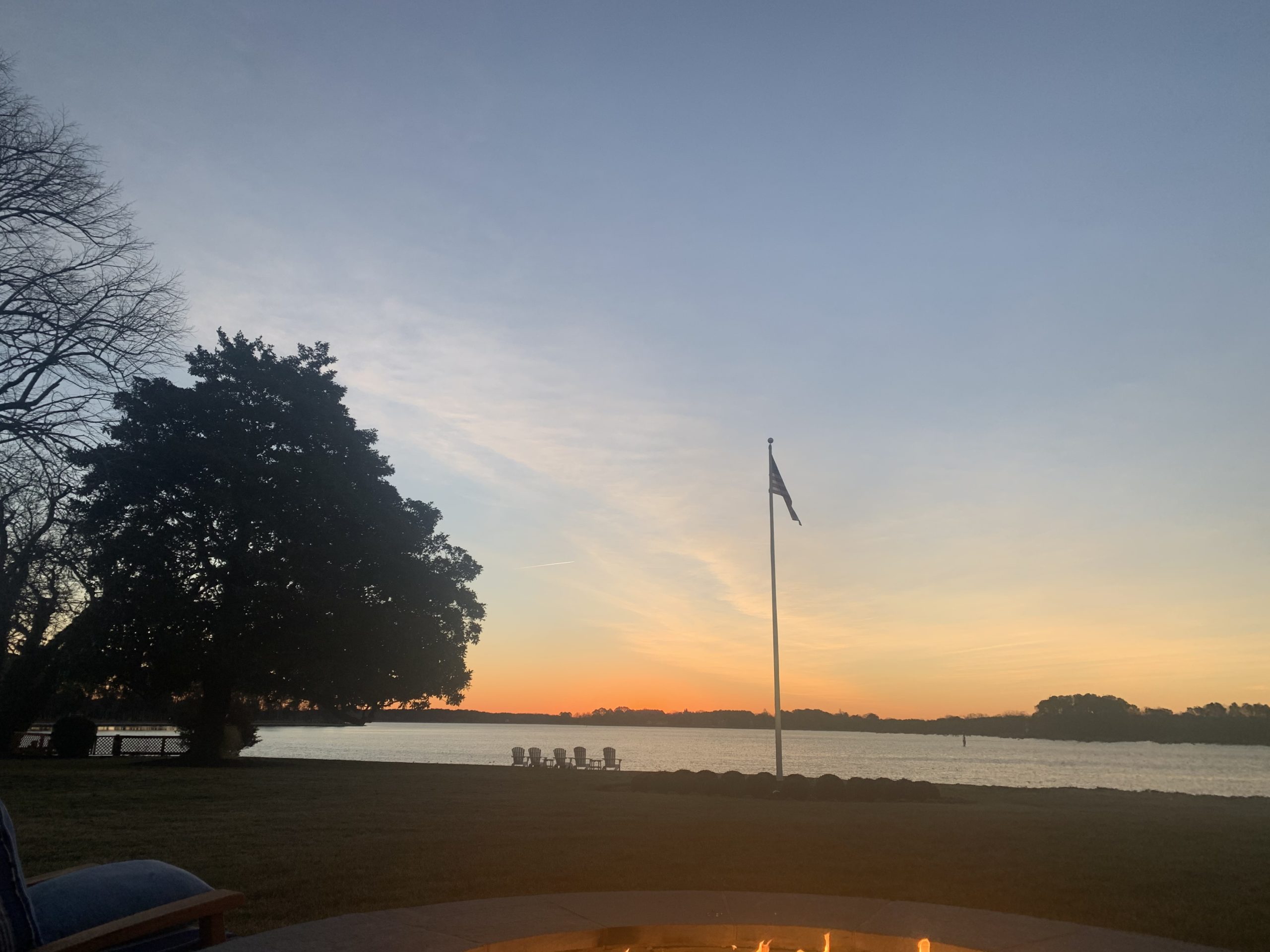
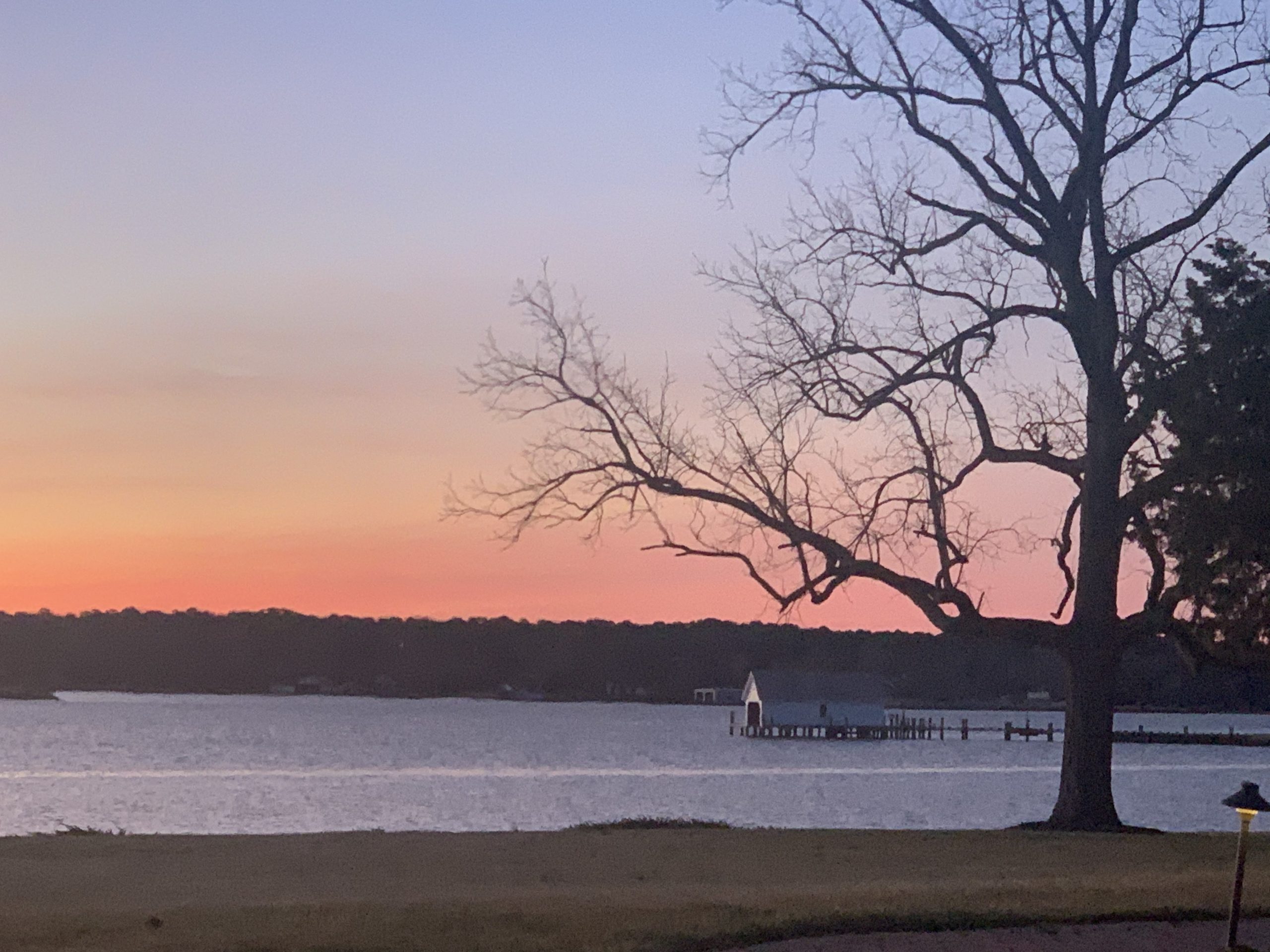
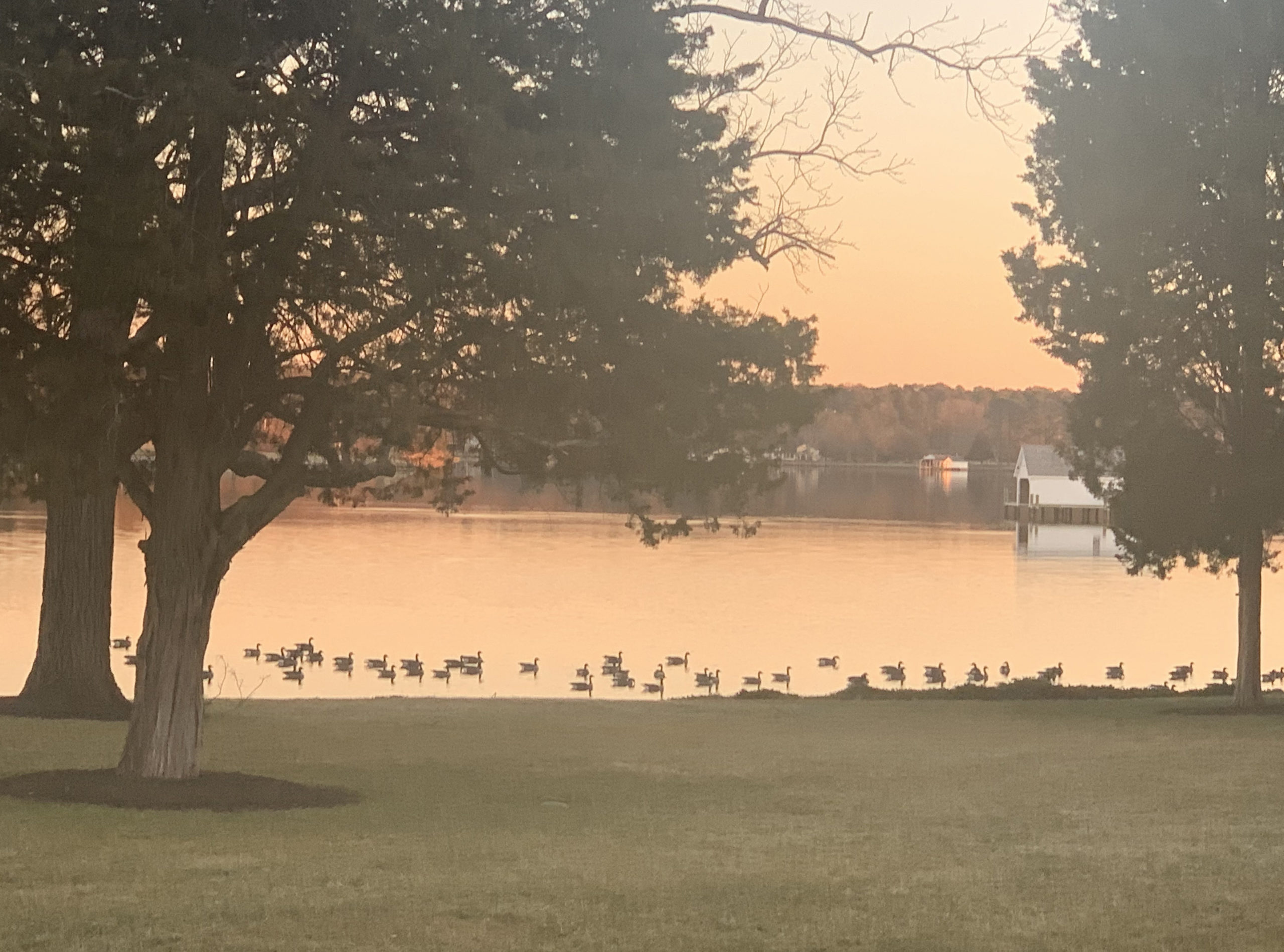
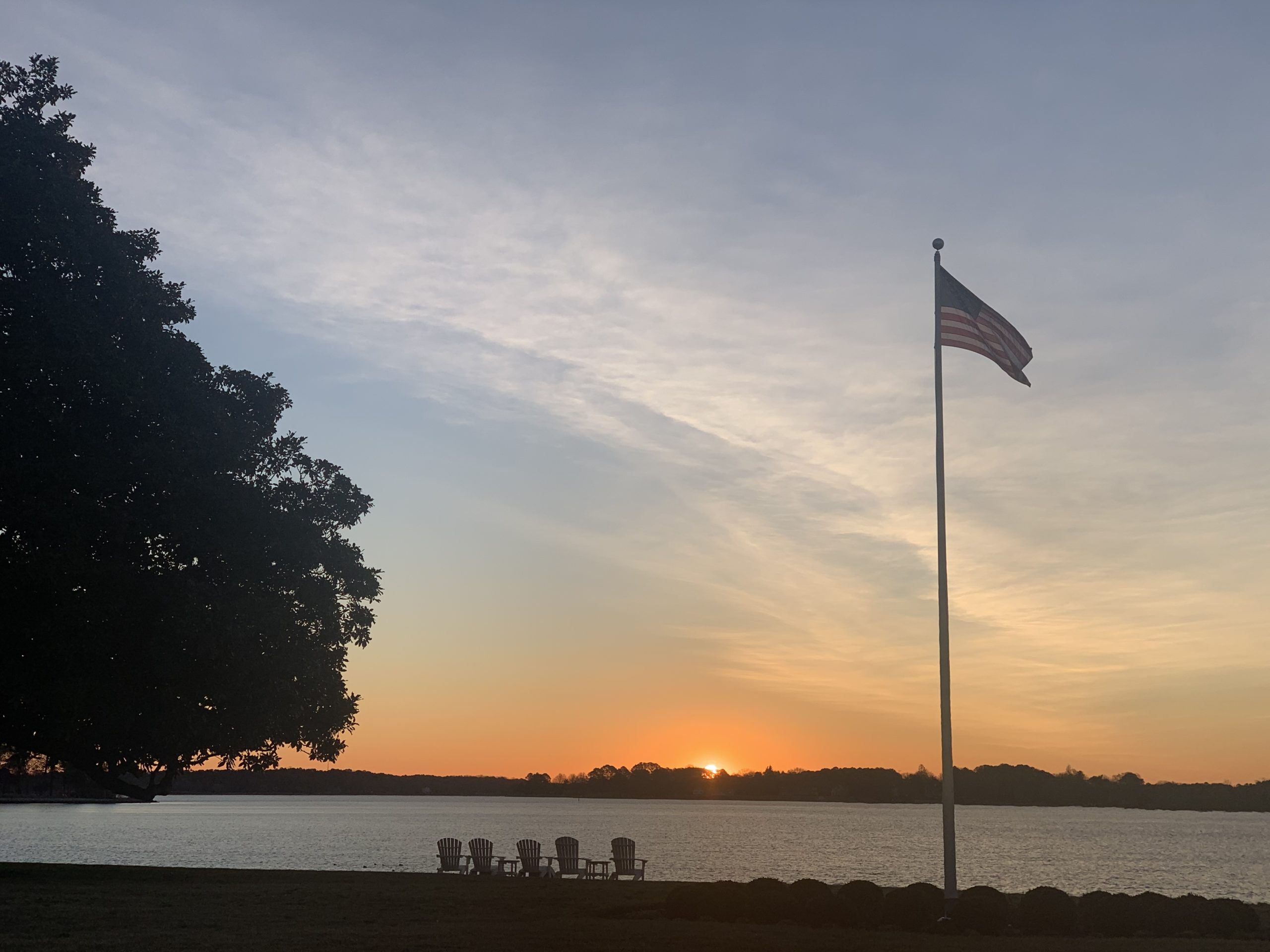
Photo credits: Joanne Leedom-Ackerman
The Sun Rising…
I can’t stop taking pictures of the dawn. I wake up before sunrise when I see the first red strip of light on the horizon. I slip on a sweatshirt, jeans, socks, grab my vest with a hood, turn on the coffee pot, gather a blanket, call the dogs, hit the full cup button on the coffee maker, pour the milk, wait for the coffee, flip on the fire pit, then hurry outside to watch the day dawning as light begins to color the sky from red to orange to yellow to pink…
Sometimes the light is gentle as the sun rises. Other times it is vibrant as this morning. I woke up a bit late—the sky was already a pale pink/yellow by the time I got outside. But then, but then…the hovering cloud bank filled with light reflected from the sun that was still hidden by the horizon and the trees across the river. As the sun blasted its light upward, the clouds turned pink and then the whole sky grew awash in rose light, and the clouds broke up into plumes scattered across the heavens.
On the river a family of ducks swam by, a dozen with their mother and/or father in the lead, swimming single file south to north. As the sun rose, a yellow globe into the sky, another family of ducks passed, also in a straight line. I wonder where they go each morning…to duck school, undisturbed by the challenges of us on the shore.
The dawning of the days continues to inspire me and leave me in a quiet state of awe as I begin my day. I try to keep that awe even as the complications and troubles of our world unfold around the globe where I am certain the same stunning sunrises are also unfolding.
(Photo credits: Joanne Leedom-Ackerman)
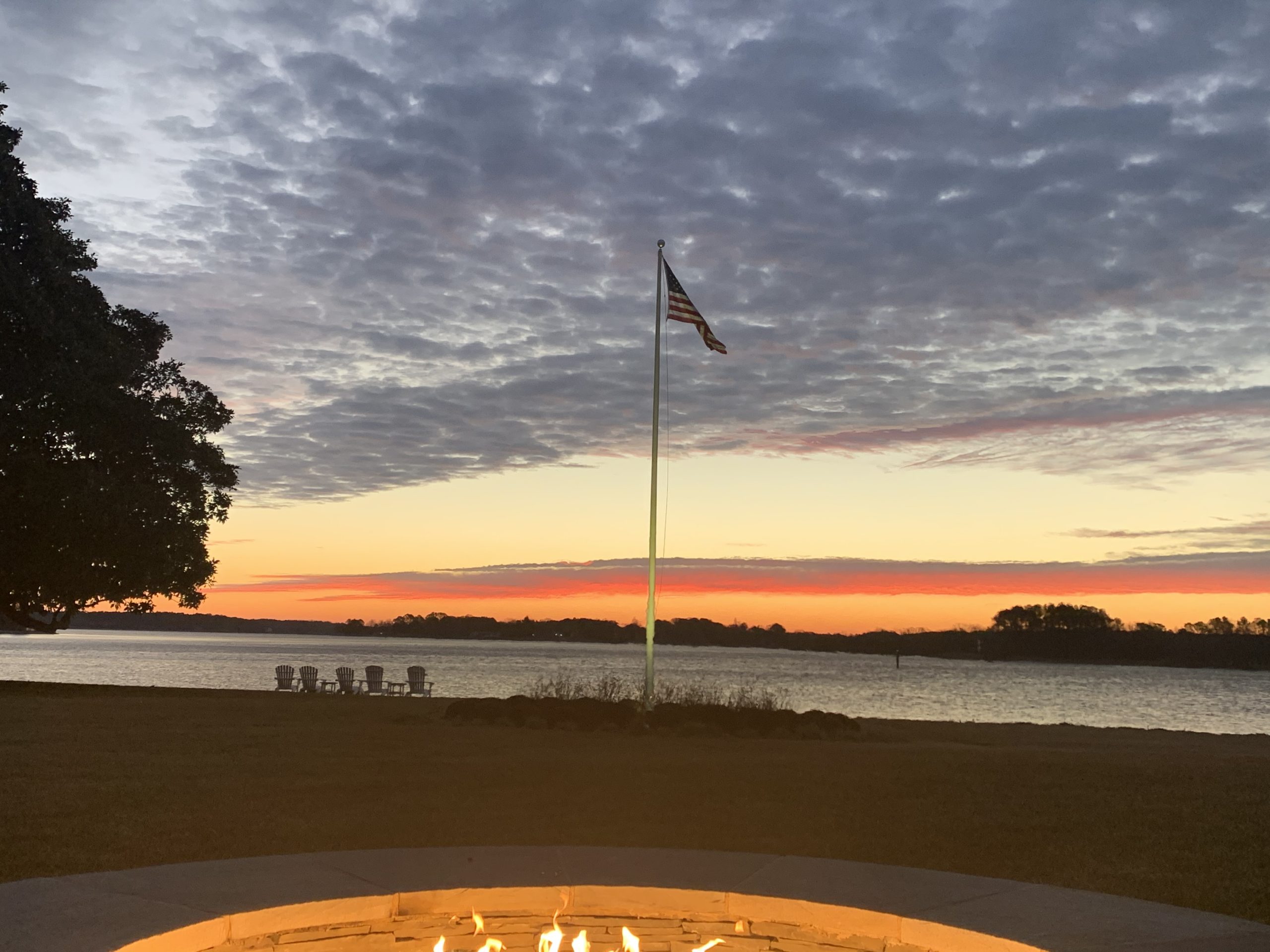
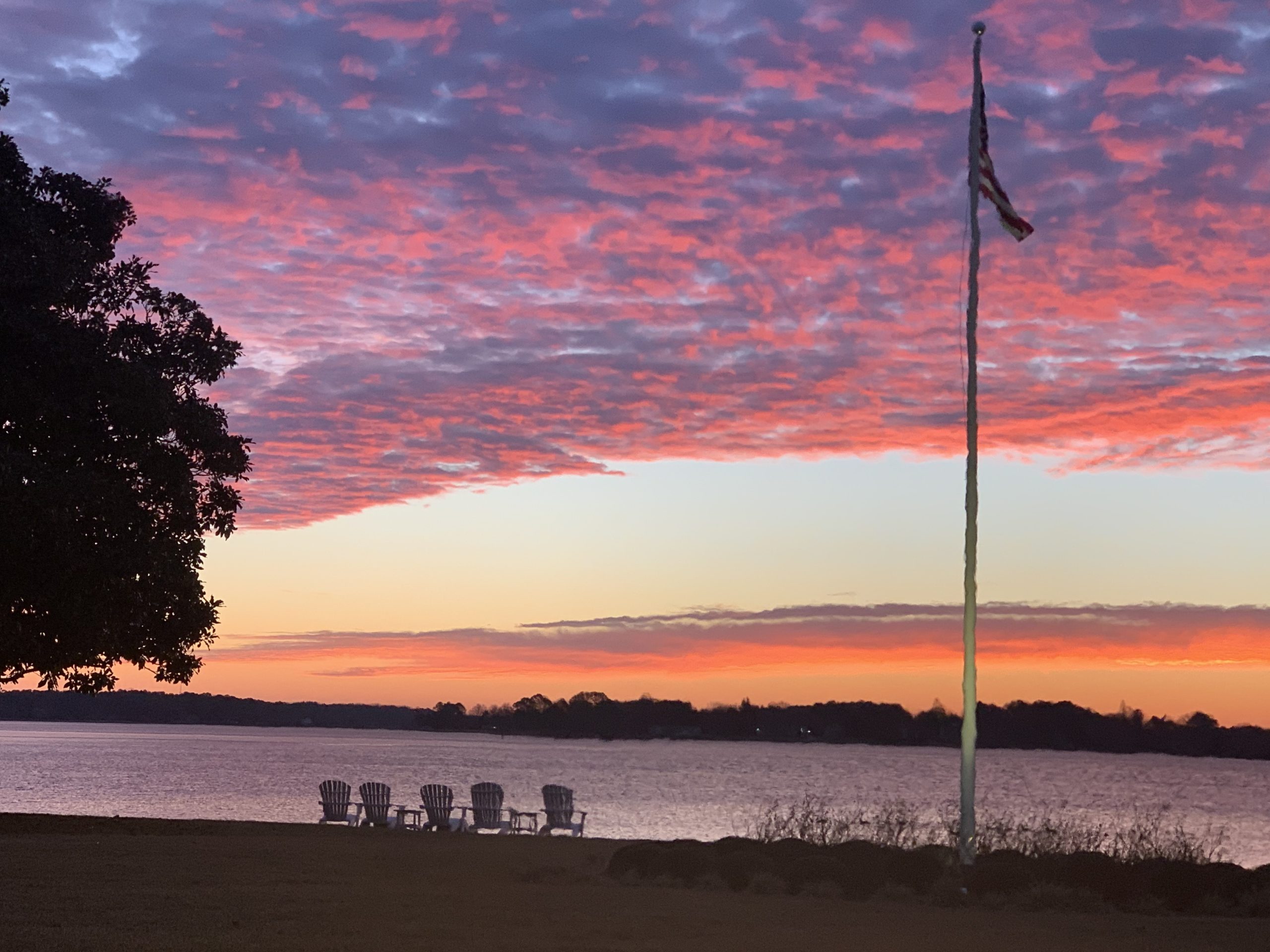

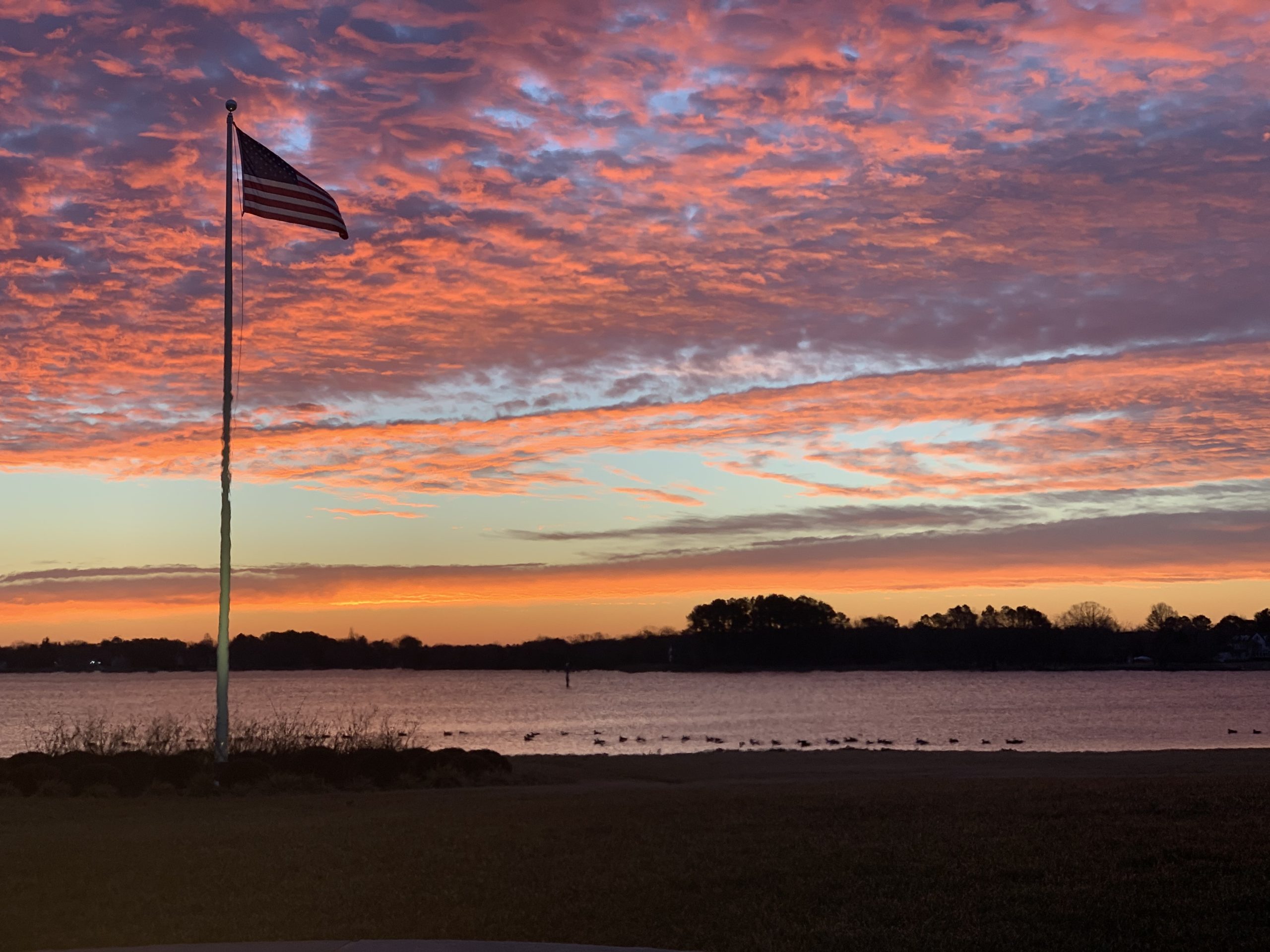
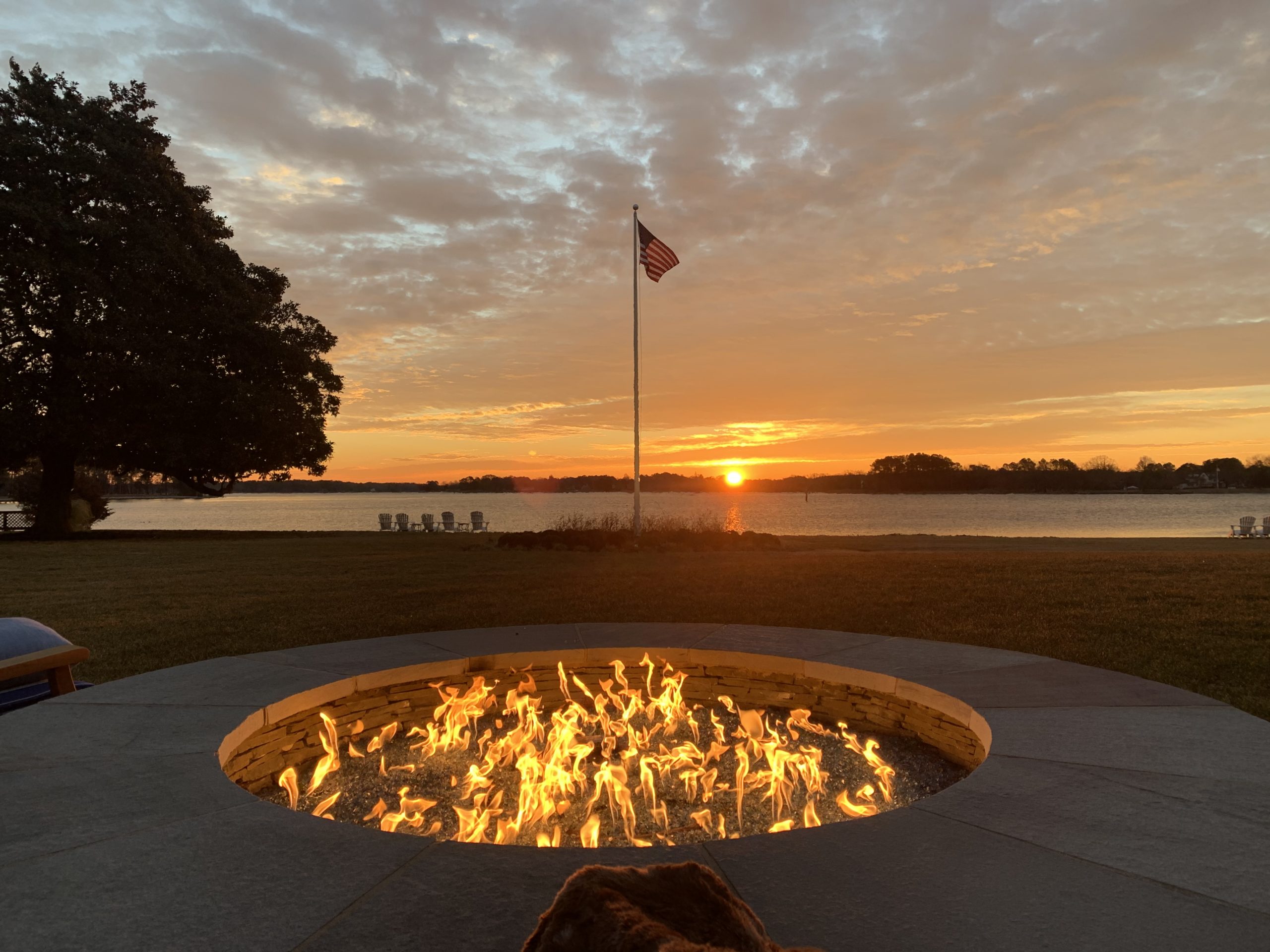
New Day…
I watched the sun rise this morning, the ducks swimming by south to north, the geese flying overhead north to south, the light spreading across the river—first a red strip, then orange…pink…a yellow ball peeking through the grove of trees across the water, then ascending the treetops…a golden globe heralding the day.
The river flows steadily towards an open expanse into the Chesapeake and ultimately into the Atlantic Ocean. It has been a mild winter so far, no ice on the water, just an occasional dusting of frost on the ground which melts with the sun.
On a flagpole by the river the American flag ripples in the breeze as the geese flap by. My dogs—one blonde, one black, both part Labrador and other breeds, wander along the river front, finding their smells and place to rest and watch the day unfold.
It is a new day…with a new government in my home city of Washington, DC. Today I look backward and forward at the same time. I am not the only one contemplating past and future, past as prologue? I share here two earlier posts, one from January 2009 after the inauguration of Barack Obama “When the Crowds Go Home, Ideas Keep Traveling.” Much has happened in the intervening twelve years. The other is October 2012, “A Visit to the End of the World” written from the edge of where the ancients thought the world ended, in Finisterre, Spain. Only a wide and empty Atlantic Ocean stretched before them. It was necessary to imagine…
How these connect I leave to another post and look forward to hearing from others.
(Photo credits: Joanne Leedom-Ackerman)

When the Crowds Go Home, Ideas Keep Traveling
(January, 2009)
The crowds have left; the reviewing stands, disassembled. The reflecting pool is frozen with sea gulls light-footing across it. Washington, DC has held its grand party. For three days, everyone was on foot, bundled in coats, scarves, gloves and walking everywhere–to the Mall, to the Capitol, to the White House (or as close as one could get), peering over barricades, hundreds of thousands of people.
Most of those who came to town have returned to all the states in the union from which they came. Those from the more than 100 foreign countries here to watch the Inauguration have also returned. As the full working week commenced in Washington, snowflakes were falling; the sky was cloudy, and the Potomac River, crusted with ice at the edges, waited for spring.
But the spirit remained. And the consequences of this global gathering were only beginning. Among those visiting Washington were women from the world’s conflict regions, women engaged in peace building, who were gathered to share experiences and also to study and watch the U.S. electoral process, particularly as it might apply to their circumstances and lives….[cont]
A Visit to the End of the World
(October, 2012)
I visited the end of the world this week, at least the spot on the earth where the ancient Romans believed the sun left the earth and the known world ended. The AC 552 highway takes you there in four lanes with possible detours through charming fishing villages along the coast of Galicia. If you stand on the granite cliffs of Finisterre, Spain looking west, you see the billowing Atlantic and can understand the Roman’s perspective for nothing lays beyond, at least nothing one could see or travel to in the ships of their day.
The Romans called the spot the Cape of Death since the sun died there. It was also a place of numerous ship wrecks on the jagged rocks reaching out in a finger hook into the sea before a light house was built centuries later. The Greeks had denominated another spot on the earth, Mount Hacho in Spanish Morocco, as the place where the world ended because that was as far as their eyes could see….[cont]
In the Morning…
As many Americans, I have watched with disbelief and sadness events that have taken place in my country and in my home city of Washington, DC over the last days. I have felt unable to add words. This morning I rose early to watch the sunrise on the Eastern Shore of Maryland where I’ve been living this year.
I listened for inspiration. I wasn’t seeking political answers or recriminations, justifications or blame. I wanted inspiration to move forward. I share here the verse that came into my thought and the photos of the morning:
“The night is far spent, the day is at hand: let us therefore cast off the works of darkness, and let us put on the armour of light.” —Romans 13:12
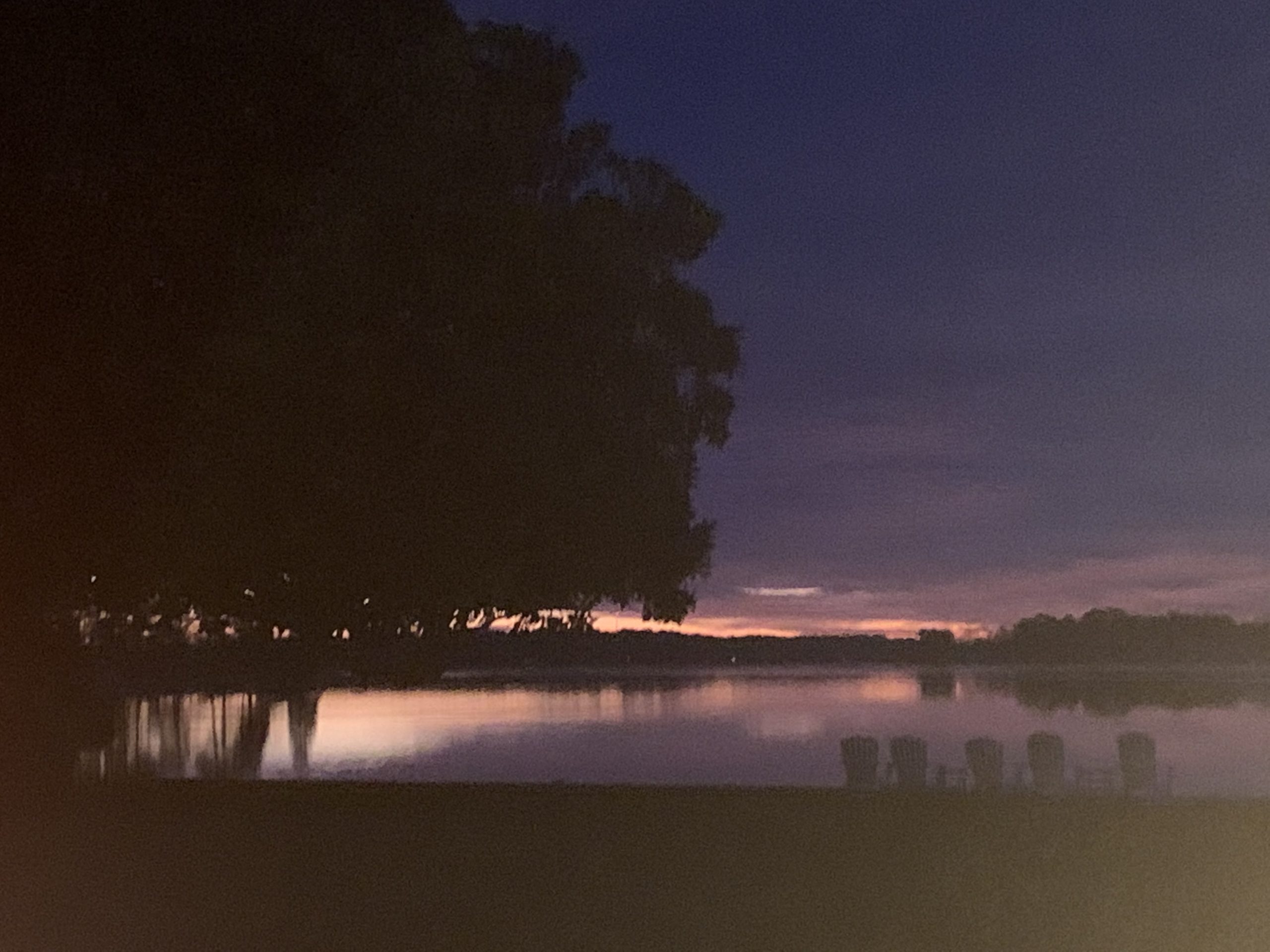
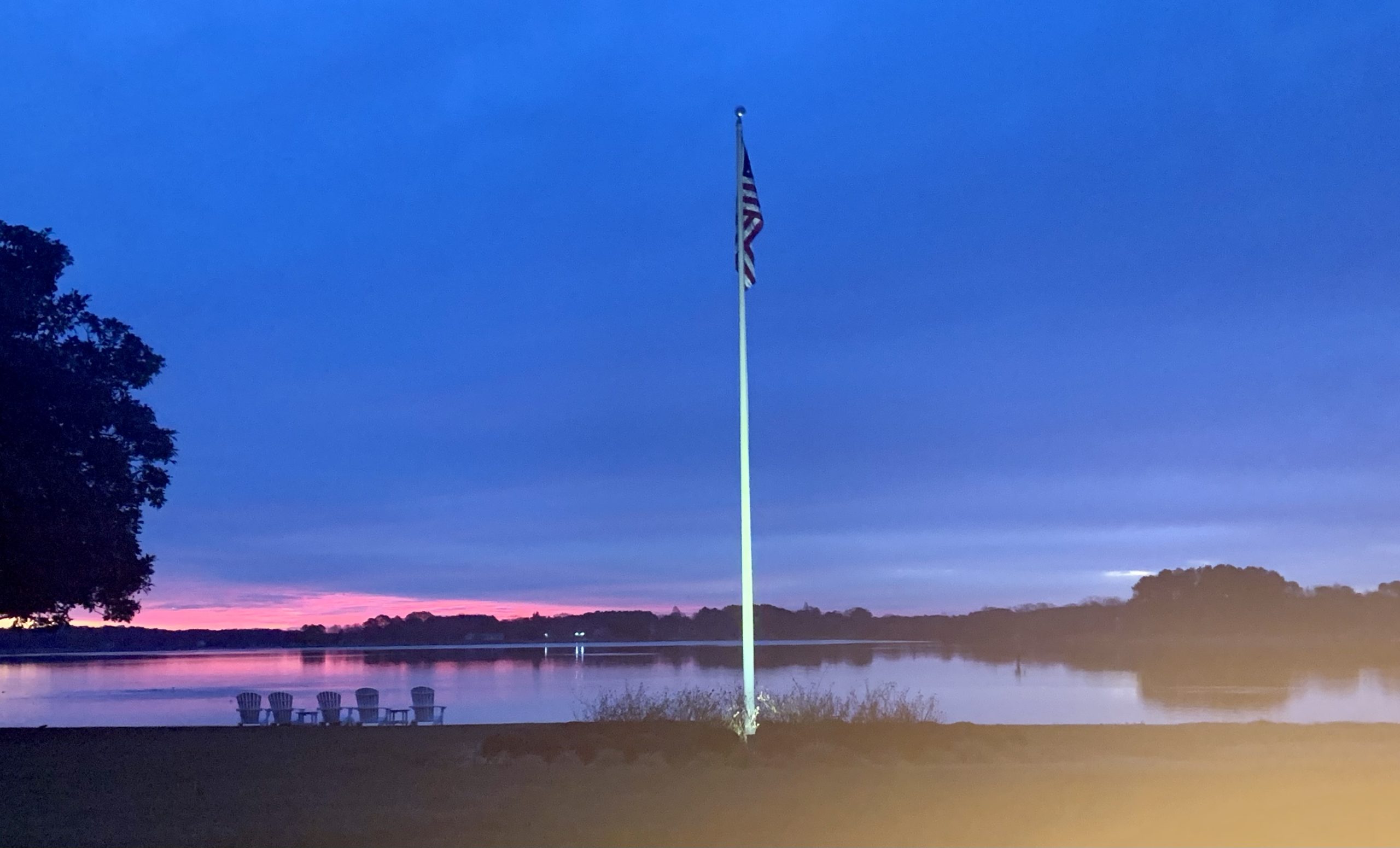
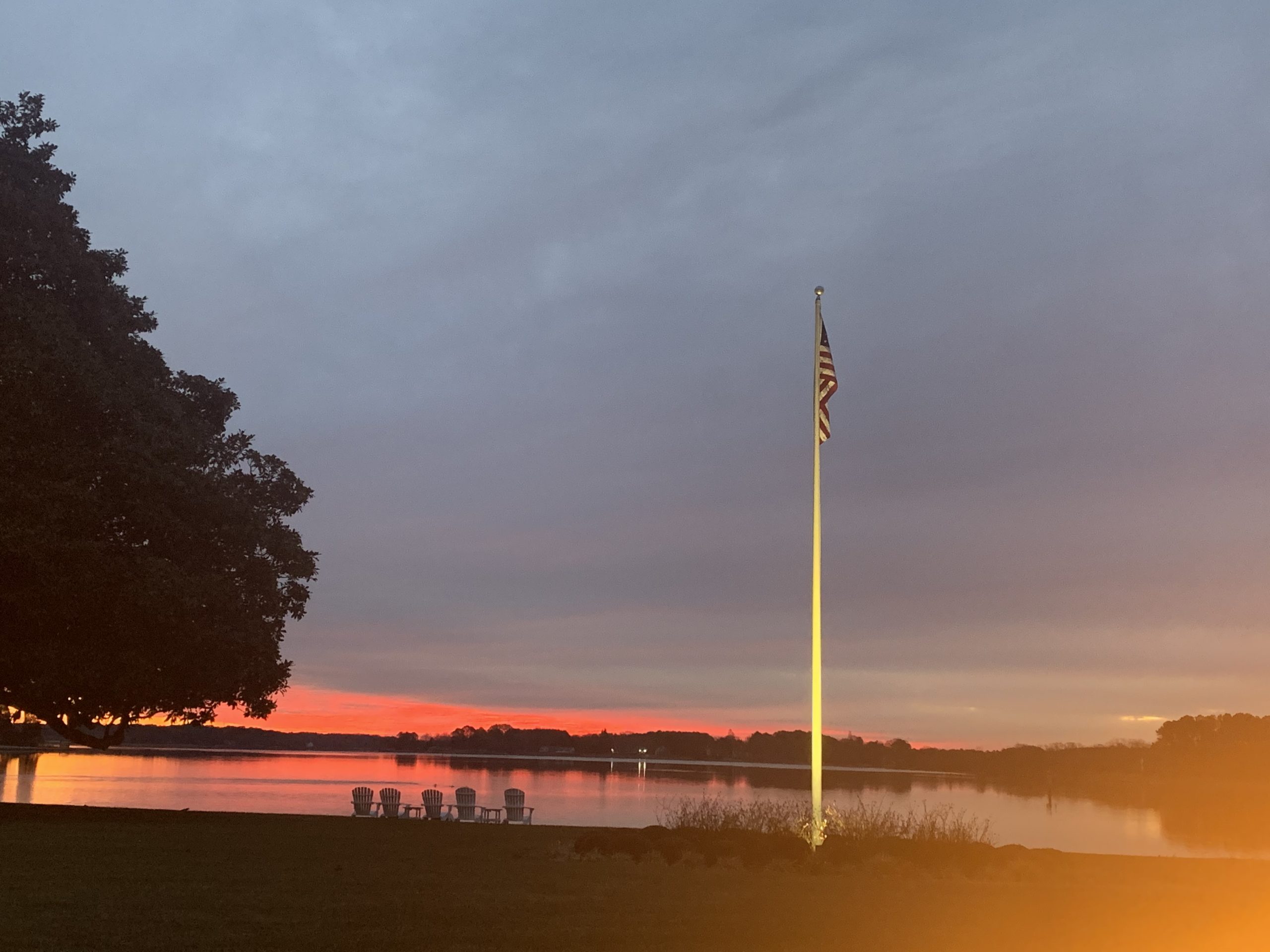
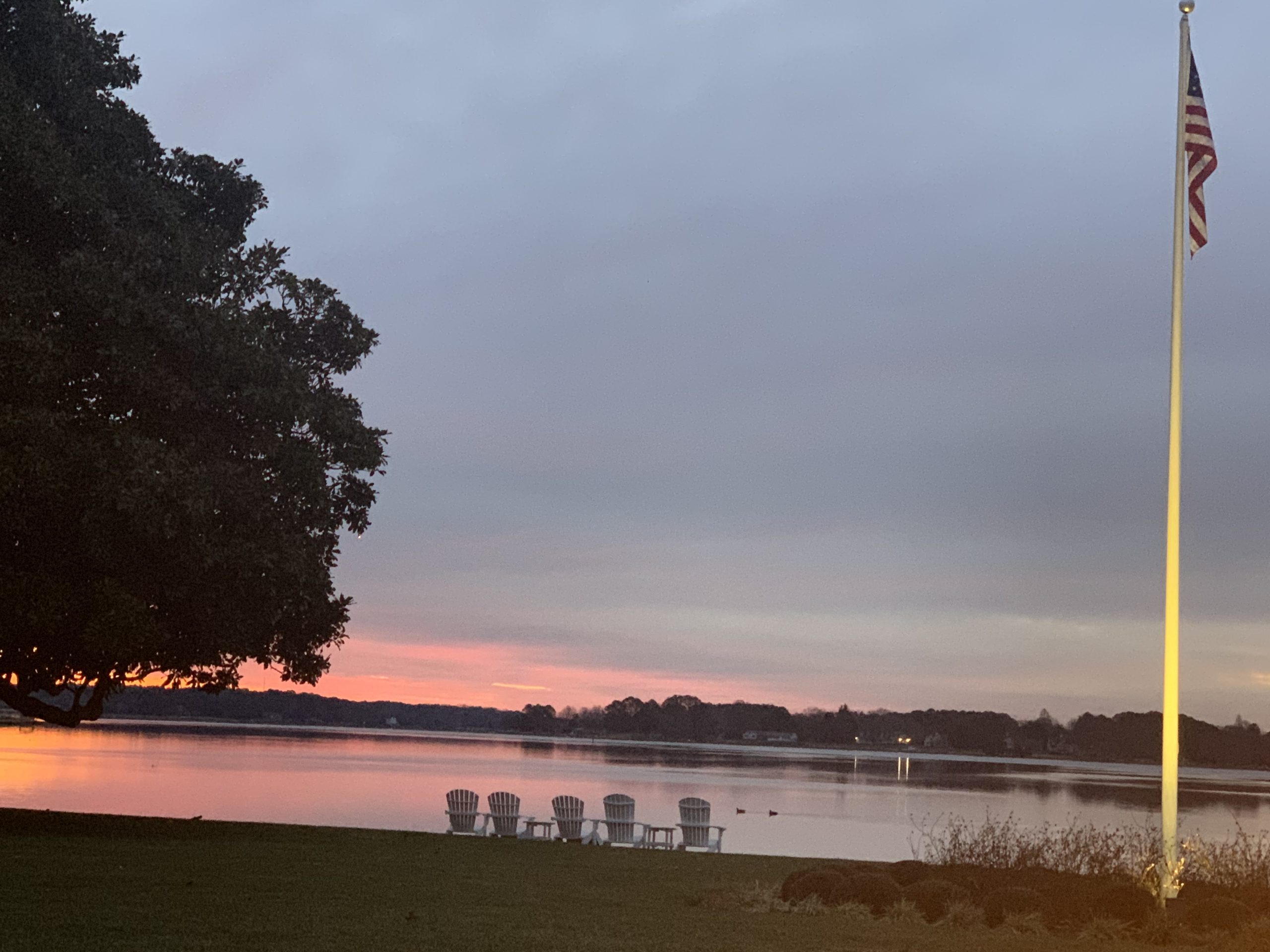
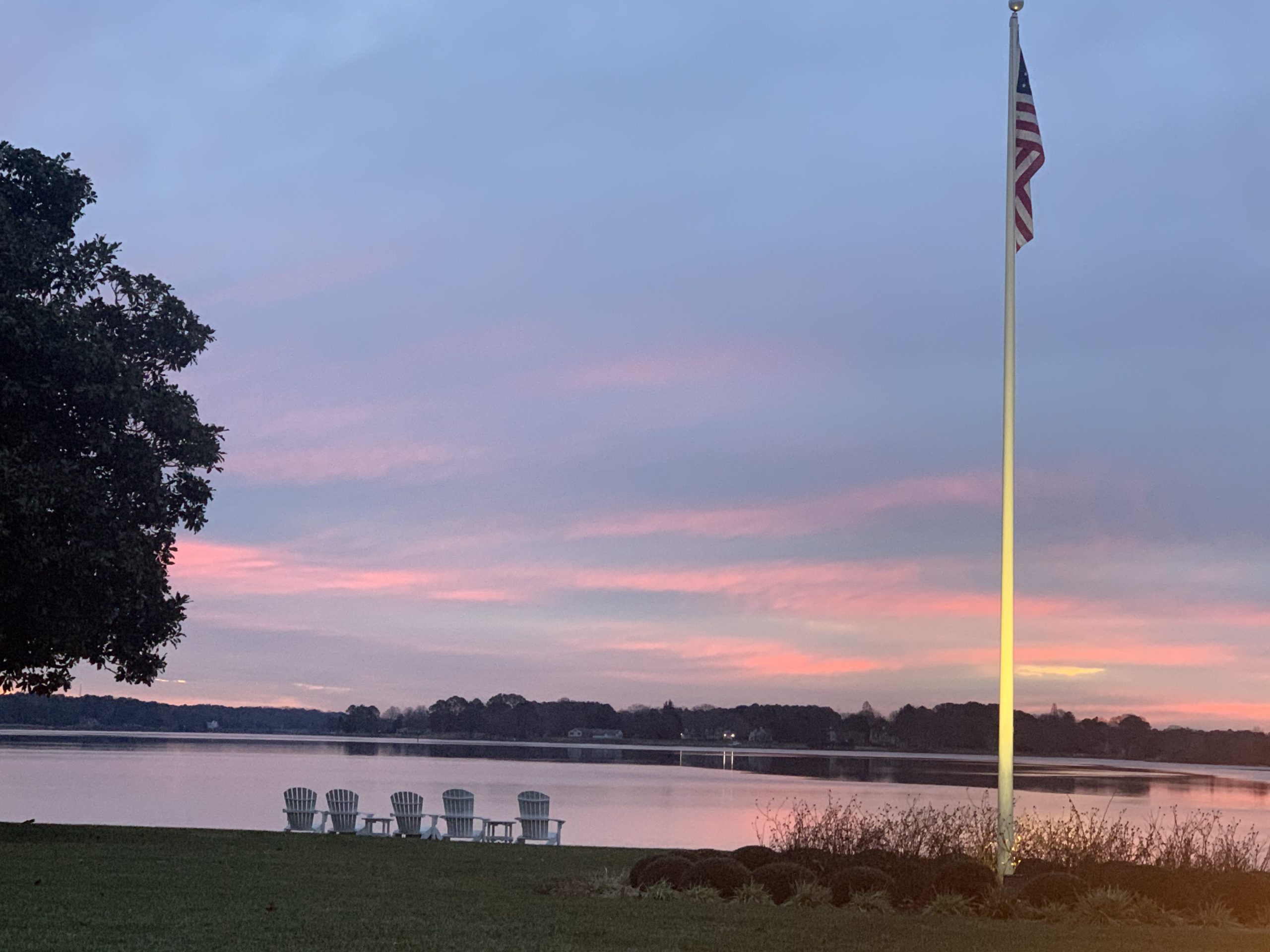
(Photo credits: Joanne Leedom-Ackerman)
